|


The historical content of the Galt Mile Community Association�s Web Site is catalogued and chronicled in these archives. This content is comprised of articles and anecdotes that are no longer current, but may be useful from a historical perspective. The categories are chronological. Scrolling down delves deeper into the past. If you encounter any difficulty locating a particular story, report, or graphic, feel free to Contact us with your dilemma and assistance will be forthcoming.
 Please Note - Many of the links included in these articles from the past are no longer active. Please Note - Many of the links included in these articles from the past are no longer active.
2004
Cuban Refugees
  
�A Day at the Beach�

December 2, 2004 - Daybreak...Tuesday...November 30th...the sun peeks over the Atlantic. It�s usually a quiet time for the condo dwellers of the Galt Ocean Mile. This Tuesday was different. A commotion on the beach attracted the attention of Regency Tower and Playa del Mar residents. �It sounded like the remnants of a party left over from the night before,� said an early riser from Regency Tower. �Men were walking up and down the beach checking the locked beach gates to the condos. Others were sitting in the sand.� These �men� were all grateful to be alive ... and free!
 | | PONTOON RAFT FROM SANTA CRUZ LANDS ON THE GALT MILE |
Ten migrants left Santa Cruz, Cuba on November 21st to elude the heavy arm of Fidel. The vehicle they pinned their hopes - and lives - on was a 16-foot cobbled-together raft that miraculously accomplished its mission. �A floor with balloons� said one onlooker. The �floor� of the unseemly craft was essentially several long wooden planks affixed to cross-hatched smaller planks. It was bordered on either side by pontoons made of styrofoam sheets and inner tubes. The inner tubes were wrapped in cloth and yellow plastic tarpaulins that were hooked to the wooden floor with large round metal rings. A makeshift railing sat above the wrapped rows of inner tubes. While this nautical wreck invoked onlooker curiosity about how it could have possibly made the crossing from Cuba, the ten refugees viewed it with love in their eyes. Rom�n Eliezer Rodr�guez (65), Eliezer Rodr�guez (32), Hugo Rodr�guez (29), Odi P�rez Reyes, brothers Vicente Miguel Reyna Modelo and Vicente Pascual Reyna Modelo, and four refugees who refused to identify themselves saw their battered raft as a golden chariot. It was, after all, their �Exodus�.
Their floating treehouse was powered by a small Honda outboard engine. They stowed food, water and two bicycle pumps in case the tubes started to deflate. Fortuitously, they packed some oars as back-up to their outboard motor and headed for Miami. A motorboat could ordinarily make the trip in about eight to ten hours. Normally, an unpowered raft could cross the Florida Straits in about three days. This, however, was not to be. Tropical Storm Otto decided to destabilize the Atlantic Ocean, creating unusually rough seas. After six days of fighting the north-flowing Gulf Stream, the little outboard sputtered. The intemperate ocean capsized the raft and claimed most of its passengers� food and water. Hugo Rodr�guez described the incident, �The Sea was very rough. It turned the raft over. We were lucky to get it back. Very lucky.�
 | | FIRE-RESCUE MEDICS CHECK REFUGEES |
The homemade oars they took along proved to be their salvation. One of the two brothers, Vicente Pascual Reyna, explained, �We spent four days rowing day and night. We split in two groups and would take turns rowing one hour at a time - each group.� After losing their meager supplies to the ocean, they survived by using a few remaining oranges to catch fish. They treated their catch with vinegar and orange juice prior to consuming the raw fish.
Early Tuesday, November 30th - after ten arduous days - they spotted the high-rise condos along the Galt Ocean Mile and paddled to the beach at 6 AM. Dehydrated from the trek, the travelers explored the beach for an exit in search of help. By 6:30 AM, residents slowly grew aware of the situation and started to call for police and medical emergency transports. Sgt. Andy Pallen of the Fort Lauderdale Police Department said, �Police started getting 911 calls about 6:45 AM, after condo residents in the 3800 block of Galt Ocean Drive saw an overloaded raft in the water.� The police gave the group blankets and drinking water. Shortly thereafter, Fire-Rescue Medical technicians evaluated their general medical condition. Despite their dehydration and extensive blisters covering their hands, ostensibly from the past four days of intense rowing, the men were in remarkably good condition.
 | | REFUGEE RAFT BEHIND REGENCY TOWER |
Surprisingly, 65-year-old Rom�n Eliezer Rodr�guez started to serenade the crowd of reporters and photographers that collected on the beach. His raft-mates cheered as they clapped a beat to his rendition of a Mexican ranchera song. Amid the laughter and rousing encouragement of his compatriots, Rodr�guez chanted, �Hace un a�o que tuve una ilusi�n, hace un a�o que se cumple en este d�a,� (I had a dream a year ago, a dream that comes true today). Explaining this spontaneous ebullience, Rodr�guez said, �We are happy to have made it here, to the land of liberty.� Filling the role of a stereotypical wet blanket, Border Patrol�s arrival quickly quashed the party mood. Before being escorted to Border Patrol�s Pembroke Pines facility at 7201 Pembroke Road for processing, Sgt. Pallen said the men were expected to be �released to family members who live in South Florida.�
Subsequent to their release by authorities later that afternoon, Robert Montemayor - a spokesman for the Border Patrol - said they were all in good health and had been debriefed. Immigration and Customs Enforcement officials usually ask refugees that raft here from Cuba if they were assisted by smugglers. Montemayor would not reveal what the men told officials. As to whether the migrants� story was deemed credible, Montemayor exclaimed, �We are still determining that.�
There was also suspicion about the refugees� story circulating among area residents who attended the early morning surprise landing. A Regency Tower resident of Cuban descent noted that aside from some blisters on their hands, they all were in extremely good condition for having spent ten days battling the ocean deprived of viable sustenance. The �song-fest� also cast a shadow on their claim to having experienced such a debilitating ordeal. The Coast Guard and Border Patrol have extensive experience with the long-time smuggling tactic of drop and dash. This technique calls for an apparently disheveled group and a sea-worn raft to be ferried offshore by boat, dropped close to the beach and left to approach authorities for asylum.
Pursuant to �The 1996 Cuban Adjustment Act�, a group of undocumented Cuban migrants who have made it to land can stay in the country and work. After a year and a day in the U.S. the migrants are eligible for permanent resident status, the first step toward citizenship. If they are intercepted at sea, however, they are usually returned to Cuba. To determine whether this landing was a legitimate �break for freedom�, Coast Guard and police vessels launched an offshore search for a smuggling craft. Barring any evidence that a scam was perpetrated, the ten should have no difficulty receiving asylum. Eldest group member Rom�n Eliezer Rodr�guez described the sentiments of his fellow refugees following their arrival in the United States, �I'm not going to say that I was born [again] today, because I�m old, but these kids were born again today when they arrived at this beach.�
Whether or not our friends and neighbors on the beach Tuesday morning believed the raft refugees to be the �real deal�, every one of them walked away with a renewed sense of appreciation for what Rom�n Eliezer Rodr�guez calls, �the land of liberty.�
Fortier �Smiles on the Mile�
  
Galt Ocean Drive to Get a Flora Facelift

 Phil Thornburg was tagged to run Fort Lauderdale�s Parks and Recreation Department, replacing former Director Ernest Burkeen. It�s a job that requires a delicate chemistry of diplomacy, political chops, fiscal efficiency, artistic proclivity and patience. The City�s budget boondoggle has taken a withering toll on every municipal department. Because departmental cutbacks in the Police or Fire-Rescue Departments would imply increased danger for the City�s residents, they are high profile media fodder. Therefore, every official news release expounding on the budget repercussions includes a disclaimer, �No Police or Fire-Rescue personnel will be cut!� When the Public Safety Aides (who assist the Police) were scheduled for termination, the City sponsored a Code Fine Amnesty Program to avoid laying them off. It allowed property owners who successfully brought their violated properties into compliance to pay a greatly reduced fine if they paid it quickly. The funds collected financed a temporary repeal of the Public Safety Aides threatened layoffs. What�s left? Where can the budget axe repeatedly fall with impunity? PARKS and RECREATION! Phil Thornburg was tagged to run Fort Lauderdale�s Parks and Recreation Department, replacing former Director Ernest Burkeen. It�s a job that requires a delicate chemistry of diplomacy, political chops, fiscal efficiency, artistic proclivity and patience. The City�s budget boondoggle has taken a withering toll on every municipal department. Because departmental cutbacks in the Police or Fire-Rescue Departments would imply increased danger for the City�s residents, they are high profile media fodder. Therefore, every official news release expounding on the budget repercussions includes a disclaimer, �No Police or Fire-Rescue personnel will be cut!� When the Public Safety Aides (who assist the Police) were scheduled for termination, the City sponsored a Code Fine Amnesty Program to avoid laying them off. It allowed property owners who successfully brought their violated properties into compliance to pay a greatly reduced fine if they paid it quickly. The funds collected financed a temporary repeal of the Public Safety Aides threatened layoffs. What�s left? Where can the budget axe repeatedly fall with impunity? PARKS and RECREATION!
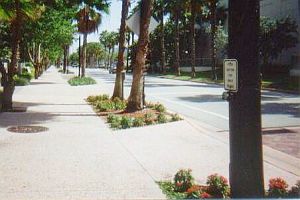 | | GALT OCEAN DRIVE SIDEWALK BEDS |
Clearly, trimming the overgrowth in the City�s swales isn�t nearly as important as patrolling the streets or serving on an Emergency Medical team. We can afford to close a park an hour or two earlier well before we can afford to lose one minute of 911 response time. While every resident cares about Fort Lauderdale�s aesthetics, they care more about safety and/or survival. Police and Fire-Rescue will always take precedent over Parks and Recreation. As such, the Parks Department has learned to make do with less, more so than almost any other City service. Thornburg knows that his Parks Department is at the back of the line for resources. So does his staff. Despite a demoralizing effect on its personnel, living with a bare cupboard for the past year has also toughened up the Department. Every cent allocated in their new budget will be painfully stretched and meticulously distributed. They plan on doing more with less.
|
 |
|
|
 | Sand that Frances Piled up on A1A Being Returned to
FORT LAUDERDALE BEACH BY FORTIER'S CREW |
Demonstrative of this new hungry attitude permeating department staff is Robert Fortier. Bob Fortier is a Parks Department Foreman whose responsibility includes managing the beach area. When Hurricane Frances tossed about 40% of the sand from Fort Lauderdale Beach across A1A, Fortier�s crews returned the silicon deluge to its original location. Despite the massive shock endured by the landscaping along the coastal highways from the windiest season in recent history, Fortier�s people have kept the beach boulevards verdant. This was done on a shoestring; imagine what they could do with adequate resources. Consistent with this �Eye of the Tiger� credo, Fortier has a plan for the Galt Mile.
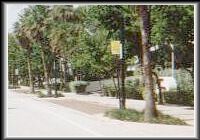 | | GALT MILE SIDEWALK BEDS |
Galt Ocean Mile underwent a massive rehabilitation several years ago. The extensive civic improvements known as �A Smile on the Mile� were paid for from an assessment contributed to by every Galt resident. President Robert Rozema of the Galt Mile Community Association described the arrangement brokered between the Community and the City, �We paid for it, the City built it and promised to maintain the improvements in a �Disney-like fashion� - a reference to the meticulous manner in which Disney maintains their famous Park.� Rozema continued, �The Galt Mile Improvement Project is arguably the most successful neighborhood redevelopment project in the City�s history.� The pact has been sorely tested by FP&L, AT&T, Bellsouth and an assortment of contractors that failed to restore the street to its original condition subsequent to decimating it. While not always successful, at least the City has tried to live up to its obligation...until recently. When the City�s finances magically evaporated, so did their ability and their will to properly maintain the Galt Mile.
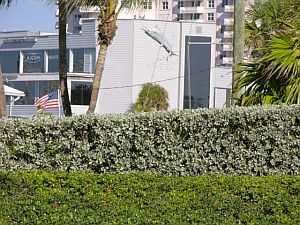 | | INDIAN HAWTHORN AND SILVER BUTTONWOOD HEDGES |
On November 1, 2004, Mr. Fortier addressed the Presidents Council of the Galt Mile Community Association. After explaining the weather-related obstacles faced by his staff - hurricanes, severe winds that �fried� even mature plants, etc. - and the fiscal constraints that Parks and Recreation was operating under, Fortier revealed an optimistic plan to reinvigorate the neighborhood landscaping. Responsible for its maintenance throughout the City�s budget-based hard times, Fortier has had the opportunity to examine the block�s flora and has arrived at some productive conclusions. Consistent with the Statewide Greenways and NatureScape programs, Fortier is a proponent of propagating native plants. He contends that indigenous plant life, having adapted to our area�s environmental rigors, enjoys the natural protection afforded by millions of years of evolution. As such, native flora will better withstand the punishment that currently devastates the Galt Mile�s landscaping. He also stated that plant selection should take into account the specific environmental hazards found on the Galt Mile. Proximity to the ocean dictates that the plants be saline-resistant, owing to their constant exposure to salt. Since the ocean winds explode through the corridors separating the high-rise structures that line the Galt, only plants capable of surviving these gale-force vortices should be considered. While these constraints will preclude the selection of many plant types, there is still a wide enough variety available to provide an aesthetically pleasing arrangement that can withstand the wind and the salt. Bob Fortier has a wealth of ideas about the type and configuration of plants he would like to see along the Galt Mile.
 | | GOLD MOUND HEDGE |
Mr. Fortier first spoke about using two different types of plants and, �staggering them in the beds along the sidewalk for the entire length of the Galt.� This idea would alternate two green plants, Indian Hawthorn and Green Island Ficus, in the sidewalk beds. In a variation, he would replace one of the two green plants with another candidate, Gold Mound. The yellow Gold Mound would add interest by contrasting with either the Green Island Ficus or the Indian Hawthorn. Fortier said, �I believe the green and bright yellow from the Gold Mound would make an awesome statement.� A third option he described would combine three different colored plants. In a more opulent version, the Green Island Ficus and the yellow Gold Mound would be staggered with Silver Buttonwoods, creating some variation of silver, yellow, green, silver, yellow, etc. to adorn Galt Ocean Drive.
 | | GALT OCEAN DRIVE - SOUTH |
Fortier�s optimism is infectious. Addressing a room filled with Association representatives, he stated, �While I can make recommendations for the neighborhood landscaping, you have to live with them.� He then invited input from the residents. The excitement with which he explained his plan spilled over to the audience as they questioned him about the plan�s details. Fortier says that this plan can be done with existing resources. Since his address to the Presidents Council, Fortier has kept his commitment to apprise the Association of developments, emailing Council Chairman Pio Ieraci with permutations of his intentions for the Galt Mile. Whichever landscape architecture Mr. Fortier ultimately implements, it will have the benefit of being able to survive and thrive � in contrast with the current plants. Green, yellow, silver, etc. are all preferable to the drab brown of the dead or dying patches that intermittently mark the existing sidewalk beds. Hopefully, the lower maintenance costs of the sturdier arrangement will enable Fortier�s troops to help keep the block in a �Disney-like fashion�. If his intensity and commitment are successfully reflected in his plan�s outcome, the Galt Ocean Mile will again sparkle with the ambiance envisioned by Earl Lifshey and the Galt Mile leadership while first conceiving to put a �Smile on the Mile!�
Click To Top of Page
City Promises to Complete Galt Mile Landscaping Upgrades
  
New Parks Department Regime Confirms �Continuity�

June 28, 2005 - Galt Ocean Mile underwent a massive rehabilitation several years ago. The extensive neighborhood redevelopment project known as �A Smile on the Mile� was financed by the residents of the Galt Ocean Mile. The terms of an agreement with the city governing the project were uncomplicated. The City would plan the undertaking and supervise its construction. Once completed, the City would maintain the newly rehabilitated street in �a Disney-like manner�. In exchange, residents living along the Galt Mile would foot the bill. Ordinarily, the City waits until a neighborhood suffers severe deterioration before committing resources to its rehabilitation. By paying for the project, community residents hoped to bypass that unpleasant prospect.
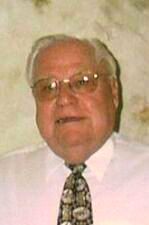 | PRESIDENT ROZEMA LAUDS
"SMILE ON THE MILE" |
The results of the project were exemplary. As described by Galt Mile Community Association President Robert Rozema, �The Galt Mile Improvement Project is arguably the most successful neighborhood redevelopment project in the City�s history.� Overnight, the Galt Mile was again competitive with other elegant high-end neighborhoods in Fort Lauderdale, Miami and Palm Beach. As long as the City fulfilled its obligation to maintain the assessed improvements, the residents could concentrate their resources on rehabilitating their 30 year-old buildings.
The City�s maintenance of the Galt Mile had been, in a monument to understatement, disappointing. As part of their permit process, the City theoretically requires contractors who decimate the street to return it to its original condition. When they demolish the sidewalk, they are supposed to restore the area with the same pink aggregate that we paid for. Upon grinding a trench through a crosswalk, they are mandated to replace the damaged pavers that we paid for. The City has habitually overlooked construction �indiscretions� by FP&L, AT&T, Bellsouth and an assortment of developers as they pock-marked the Galt Mile with tar scars and asphalt patches. Fort Lauderdale�s obligation to maintain the improvements in �a Disney-like manner� extended to the landscaping. In the past ten years, the foliage along the block had evolved into a tangled mass of scraggly trees, dead grass and scrub brush. Community expectations had so deteriorated that frustrated residents considered themselves fortunate when graced with the removal of a long-dead tree stump or having the dead grass shaped.
Last November, a Parks and Recreation Department representative addressed the Galt Mile Community Association Presidents Council, offering a plan to revitalize the landscaping. Bob Fortier, the Parks Department Foreman of the Beach Area, promised to replace the dead foliage with a combination of plants better able to withstand the area�s environmental rigors. Jaded by years of broken promises, wary Association officials adopted a wait-and-see attitude.
 | | GALT OCEAN DRIVE SWALES |
Surprisingly, the next few months produced a change in the maintenance routine practiced by Parks Department personnel. The Galt �brownfield� was replaced by Gold Mound, Silver Buttonwood and Green Island Ficus. In addition to being saline and wind resistant, Fortier�s selection of plants were aesthetically sound. By March, Fortier had installed decorative topiaries and trellises in the swales along the block to complement the new plantings. Dead grass was no longer the area�s dominant flora. He kept his word.
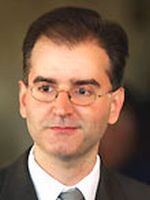 | MANAGER GEORGE GRETSAS
SENT APPRECIATION LETTER |
Galt residents were delighted. Each day, people would see the tangible results of the City�s promise. To applaud the City�s efforts, the Galt Mile Community Association unanimously elected to commend Parks Department Director Phil Thornburg, Assistant Director Terry Rynard and City Manager George Gretsas. A letter conveyed our delight with the new landscaping, appreciation of Mr. Fortier�s contributions and our gratitude for the City�s holding true to its word. More importantly, after suffering a decade of landscaping mediocrity, the letter expressed the Association�s sincere wish that the current arrangement be permitted to continue. The City�s response was two-fold. First, they answered the letter, stating that they were happy to hear that we were pleased with their efforts. Second, they reassigned Mr. Fortier to other duties, relieving him of his Galt Mile landscaping oversight responsibilities!
Incredulous Council members wavered between shock and anger. Normally passive members threatened to campaign against the re-election of incumbent City officials. Recommendations to sue the City for non-compliance with their contractual obligations proliferated. After years of tolerating inept landscaping followed by the service cutbacks, fee increases and tax hikes from the budget boondoggle, the single request made by the community of the City was roundly denied. Accommodating the neighborhood�s wish would have actually saved precious tax dollars.
 | | GALT OCEAN DRIVE - SOUTH |
To mollify trepidations about the block reverting to its prior state of disrepair and cool anger over this blatant disregard for the community�s wishes, Fort Lauderdale Urban Forester Gene Dempsey addressed the June 6th meeting of the GMCA Presidents Council. His recently assumed Parks Department duties include Fortier�s former Galt Mile landscaping responsibilities. At the meeting�s outset, he promised to continue the progress Fortier had initiated. He explained that while Fortier was no longer involved in the community�s landscaping, he was still in charge of beach maintenance. Regency Tower resident Louise Collins asked why, �Mr. Fortier was uprooted from a job that was finally being done well only to be placed in charge of the sand?� Dempsey explained that the City hired �a professional horticulturist to oversee future Galt Mile landscaping.� While the new horticulturist was unable to attend the meeting, Mr. Dempsey promised to bring him to the next meeting when invited. He also repeated his promise to, �personally supervise the block�s landscaping.� When asked about his plan for the Galt, Dempsey said that he would, �communicate with Mr. Fortier to insure continuity.�
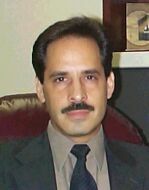 | CHAIR PIO IERACI INVITES
GENE DEMPSEY TO RETURN |
Several Council members reiterated that Galt Mile residents were more concerned about the City�s intentions than about the internal reassignment of responsibilities. They described to Dempsey the community�s disappointment with the City�s efforts prior to Fortier�s short reign. Although hiring a professional horticulturist appeared to be a progressive idea, Council members were skeptical about whether the promised rehabilitation would proceed on schedule. Stating unequivocally that it would, Mr. Dempsey said that despite his having only recently been afforded the authority to complete the upgrades started by Fortier, he would �take personal responsibility� for their expeditious implementation. Dempsey described his full range of oversight responsibilities as including tree service, landscaping and horticulture. In addition, he maintains the Riverwalk development and street medians throughout the City
His assurances seemed to quell some of the suspicion surrounding the City�s decision to disregard the community�s stated wishes. Some members suggested that the City�s callous actions might simply be a case of bad timing and poor communication. Others voiced resentment over the Galt neighborhood being adversely impacted by suspected political maneuvering within the Parks Department. While opinions varied about the City�s motives, members concurred with Mr. Dempsey�s statement that we would know soon enough if the upgrades would be implemented and the City�s promise kept. Responding to a request by Presidents Council Chair Pio Ieraci, Dempsey agreed to address the Council again next fall, after the rehabilitation was completed. Time, as usual, will tell.
 For additional information please contact Gene Dempsey, Urban Forester, Parks and Recreation Department, 1350 W. Broward Boulevard, Fort Lauderdale, Florida 33312 at Phone: (954) 761-5785, email: [email protected]. For additional information please contact Gene Dempsey, Urban Forester, Parks and Recreation Department, 1350 W. Broward Boulevard, Fort Lauderdale, Florida 33312 at Phone: (954) 761-5785, email: [email protected].
Click To Top of Page

Mayor Naugle Fires Up
GMCA Advisory Board

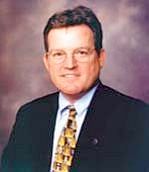 | | MAYOR JIM NAUGLE |
October 25, 2004 - Fort Lauderdale Mayor Jim Naugle addressed the October 21st meeting of the Galt Mile Community Association Advisory Board for the purpose of educating the membership about the key issues facing the community on Election Day. The Mayor, a longtime supporter of Galt Mile issues, was accompanied by a retinue of Fire-Rescue officials and personnel. He reviewed some of the ballot questions that the electorate will decide on November 2nd. He explained the status of the Galt Mile with respect to other sections of the City and answered members� questions about the new budget. However, the Mayor�s primary intent from the meeting�s outset was to clarify the upcoming Bond Issue designed to salvage the city's deteriorating Fire-Rescue facilities. To this end, he brought a carefully prepared presentation replete with visual aids (slides) and expert witnesses charged with the dual task of explaining the problem facing the Fire-Rescue Department and testifying to the need for its resolution. (See �Fire-Rescue Bond Issue: One Way or Another� below!)
Question 4: Fire-Rescue Bond Issue
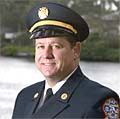 | | Deputy Chief Keith Allen |
The referendum for the Fire-Rescue Bond Issue will be Question 4 on the Fort Lauderdale section of the official Broward County General Election Ballot. Fire-Rescue�s Deputy Chief of Operations Keith P. Allen and David Ebert were called on by the Mayor to explain the deplorable state of Fire-Rescue�s existing facilities. Chief Allen compared the environment under which the existing facilities were built to conditions today. He stated, �While the Department has kept pace with the City�s needs, the Department�s facilities have not.� Fort Lauderdale experienced explosive growth following its identification as the nation�s �Spring Break� capitol, its 1960 population of 83,648 doubling to about 168,000 today. Chief Allen expanded, �In 1992, the Department responded to 19,423 incidents as compared to its current rate of about 40,000 per year. A doubling of the incident rate mandated a comparable increase in the Department�s personnel from 292 in 1992 to about 400 today.�
 | | NARROW STATION BAY |
�Fire Departments� and �firefighters� are antiquated misnomers. Even Fire-Rescue is an inadequate description of what is expected of today�s Department. The Mayor explained, �Their responsibilities have grown from extinguishing fires and rescuing cats from trees to a wide variety of emergency response situations.� These include medical emergencies, crisis and consequence management of terrorist threats, preparation for and response to severe weather threats, general domestic preparedness; every social challenge of modern life has been placed on Fire-Rescue�s plate. Almost all of these new responsibilities require specialized training and equipment. The Mayor commented, �This additional equipment was never contemplated when the original stations were planned and built.� To keep pace with technological advances and meet federal guidelines for mandated decontamination stations, effective medical response and treatment areas, and specialized gear of every stripe, jury-rigged solutions were quickly cobbled together. The impact of the �Quonset hut� solution to overcrowding in our schools was limited to student discomfort and a moderate loss of efficiency. The impact of the overcrowding in our Fire-Rescue is not only the extreme discomfort suffered by the personnel who spend a third of their lives in cramped quarters, but also in time - valuable minutes lost in emergency response time.
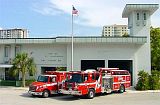 | | Station 54 at NE 32nd Street |
Lieutenant Ed Webster of Station 54 (located at 3200 NE 32nd Street - down the block from the Coral Ridge Towers complex) explained how the stations� deficiencies impact firefighters and response time. �Fire-Rescue needs to keep pace with the technological advances that boost the success rate of their life-saving objectives.� Computerization, advanced equipment and vehicles, and systems upgrades are the tools acquired by the Department to achieve these goals. Enigmatically, the 83 new vehicles barely fit in the old bays.  | | EXPOSED WIRING |
The Lieutenant asserted that the stations� archaic wiring is �incapable of servicing the intense electrical demands of modern communications and information technology.� The recent pummeling suffered by South Florida from Charley, Frances and Jeanne points to another dogma. Mayor Naugle interjected, �The Department that we need to adequately prepare and recover from hurricanes and other weather catastrophes is operating out of stations that aren�t weather-proofed.� The majority of the City�s 30 - 40 year-old Fire-Rescue stations were built prior to the advent of the stringent building codes created to make buildings as hurricane resistant as possible. When Hurricane Charley damaged more than a half a dozen fire stations in Charlotte and adjoining counties on Florida�s west coast, it rendered engines useless and prevented firefighters from providing much-needed emergency response.
 | Exposed Outdoor
Decontamination Station |
During the decades-long expansion, Fire-Rescue strove for universal inclusion, trying to be reflective of the City�s ethnic composition. As the �Glass Ceiling� dissolves, women are successfully filling positions at all levels. Sleeping and restroom facilities in many of the stations do not provide the needed gender separation for the Department�s diverse workforce. Webster spoke to the embarrassment suffered by firefighters, male and female, having to �wash down in slapped-together outdoor decontamination stations in full public view.�
The stations are going to be upgraded - there is no alternative. The only question that the Bond Issue will answer is how they will be paid for. If the Bond Issue doesn�t pass, every current resident will see an additional tax increase - almost immediately. People who move to the city after the stations are upgraded will get a free pass. Mayor Naugle explained, �The Bond Issue provides for a more equitable alternative. It will allow the expense to be treated like a mortgage. The future residents of Fort Lauderdale will also contribute to the improvements that they will benefit from. The financial load will be shared by current and future beneficiaries alike� - relieving the current residents of having to foot the bill alone. This is a no-brainer. The Mayor, the Fire-Rescue officials and Galt Mile Community Association Advisory Board members are all on the same page - vote YES to the Fire-Rescue Bond Issue (Ballot Question 4).
Click To Top of Page
Other Fort Lauderdale Ballot Questions
 Mayor Naugle addressed the other Fort Lauderdale Questions on the November 2nd ballot. Ballot Question 1 is, �Should the Charter of the City of Fort Lauderdale, Florida, be amended to authorize the City Commission to appoint and supervise commission assistants?� The Mayor feels that the City Commissioners should be able to hire their own staff. We agree. The second Ballot Question is, �Should the Charter of the City of Fort Lauderdale, Florida, be amended to provide for the appointment of a City Auditor who shall report directly to the City Commission and be responsible for conducting financial and compliance audits of City Government and City Officials?� The Mayor thinks that this is also a good idea. However, when the Mayor was asked whether or not this might be construed as the Commission financially policing itself, he admitted the dilemma. In response, he offered that control over the audit could be �a very effective tool in the hands of the Commission.� The City Auditor is currently under the control of the City Manager. Vote your conscience. Ballot Question No.3 asks, �Should the Charter of the City of Fort Lauderdale, Florida, be amended to require that any conveyance of City-owned land zoned Park in accordance with the City�s Unified Land Development Regulations or the removal of such zoning designation be approved by a unanimous vote of the entire City Commission?� Absolutely - the city�s parks should enjoy �lock box� style protection. Requiring a unanimous vote instead of a simple majority to transform �Public Trust� assets into commodities substantially raises the bar to an unsavory �exchange� of assets. Theoretically, the benefit to liquidating Park land should be universally transparent before being permitted. Again, we agree with the Mayor that this inures to the public benefit. Question 4 is the Fire-Rescue Bond Issue (Click Here for a complete analysis of the Fire-Rescue Bond Issue). Mayor Naugle addressed the other Fort Lauderdale Questions on the November 2nd ballot. Ballot Question 1 is, �Should the Charter of the City of Fort Lauderdale, Florida, be amended to authorize the City Commission to appoint and supervise commission assistants?� The Mayor feels that the City Commissioners should be able to hire their own staff. We agree. The second Ballot Question is, �Should the Charter of the City of Fort Lauderdale, Florida, be amended to provide for the appointment of a City Auditor who shall report directly to the City Commission and be responsible for conducting financial and compliance audits of City Government and City Officials?� The Mayor thinks that this is also a good idea. However, when the Mayor was asked whether or not this might be construed as the Commission financially policing itself, he admitted the dilemma. In response, he offered that control over the audit could be �a very effective tool in the hands of the Commission.� The City Auditor is currently under the control of the City Manager. Vote your conscience. Ballot Question No.3 asks, �Should the Charter of the City of Fort Lauderdale, Florida, be amended to require that any conveyance of City-owned land zoned Park in accordance with the City�s Unified Land Development Regulations or the removal of such zoning designation be approved by a unanimous vote of the entire City Commission?� Absolutely - the city�s parks should enjoy �lock box� style protection. Requiring a unanimous vote instead of a simple majority to transform �Public Trust� assets into commodities substantially raises the bar to an unsavory �exchange� of assets. Theoretically, the benefit to liquidating Park land should be universally transparent before being permitted. Again, we agree with the Mayor that this inures to the public benefit. Question 4 is the Fire-Rescue Bond Issue (Click Here for a complete analysis of the Fire-Rescue Bond Issue).
Taxes and the City
 Mayor Naugle favorably compared the strength of Fort Lauderdale�s $20 Billion Tax Base to those of other Florida Cities (Click Here for Tax Base Table). The Mayor stated, �Our Tax Base, the strongest municipal Tax Base in Florida, is roughly equal to Miami�s with half Miami�s population. We recently surpassed Tampa in taxable value and are ahead of Orlando and Saint Petersburg.� The Mayor also noted that we have the dubious distinction of being the most heavily taxed urbanites in Florida, primarily due to Fort Lauderdale�s generous employee compensation packages absorbing roughly 75% of tax dollars. While the recent budget crunch has imbued the municipal work environment with tension and uncertainty, city employees here enjoy the most lucrative remuneration in the State (See Table Below). After extolling the quality of our employees, the Mayor intimated that getting a handle on labor costs would go a long way to muting the tax bite. Mayor Naugle favorably compared the strength of Fort Lauderdale�s $20 Billion Tax Base to those of other Florida Cities (Click Here for Tax Base Table). The Mayor stated, �Our Tax Base, the strongest municipal Tax Base in Florida, is roughly equal to Miami�s with half Miami�s population. We recently surpassed Tampa in taxable value and are ahead of Orlando and Saint Petersburg.� The Mayor also noted that we have the dubious distinction of being the most heavily taxed urbanites in Florida, primarily due to Fort Lauderdale�s generous employee compensation packages absorbing roughly 75% of tax dollars. While the recent budget crunch has imbued the municipal work environment with tension and uncertainty, city employees here enjoy the most lucrative remuneration in the State (See Table Below). After extolling the quality of our employees, the Mayor intimated that getting a handle on labor costs would go a long way to muting the tax bite.
 Total Compensation (Police & Firefighters) Total Compensation (Police & Firefighters)

| Major Florida Municipality |
Police Officers |
Firefighter - Paramedic |
| |
|
|
| Fort Lauderdale |
$97,990 |
$100,952 |
| Miami |
$86,210 |
$111,651 |
| Jacksonville (Duval) |
$61,303 |
$59,841 |
| Tampa |
$79,248 |
$66,527 |
| Orlando |
$88,809 |
$94,837 |
| Saint Petersburg |
$86,243 |
$105,543 |
| Hialeah |
$72,618 |
$83,844 |
|
Ongoing Wage and Salary Survey For Police Officers and Firefighters
Top Cities - 10 years
 Source: Focus on Fort Lauderdale Source: Focus on Fort Lauderdale
 The Mayor stated that the Galt Mile’s contribution to Fort Lauderdale’s tax structure is proportionately shrinking. �As new construction comes online in high growth neighborhoods, the percentage elicited from stable communities such as the Galt Ocean Mile diminishes.� Before you nourish a warm fuzzy feeling, understand that we still contribute as much as the downtown business district and receive embarrassingly fewer resources than we give. While this is not likely to change anytime soon, we do appreciate the Mayor�s effort to keep our neighborhood abreast of the current issues that concern us! The Mayor stated that the Galt Mile’s contribution to Fort Lauderdale’s tax structure is proportionately shrinking. �As new construction comes online in high growth neighborhoods, the percentage elicited from stable communities such as the Galt Ocean Mile diminishes.� Before you nourish a warm fuzzy feeling, understand that we still contribute as much as the downtown business district and receive embarrassingly fewer resources than we give. While this is not likely to change anytime soon, we do appreciate the Mayor�s effort to keep our neighborhood abreast of the current issues that concern us!
 Click Here to access the Fire-Rescue Bond Referendum page on the City of Fort Lauderdale Web Site. If you would like to send an email to the Mayor concerning the Bond Issue, Click Here! Click Here to access the Fire-Rescue Bond Referendum page on the City of Fort Lauderdale Web Site. If you would like to send an email to the Mayor concerning the Bond Issue, Click Here!
 Click Here to access detailed review of the Fire-Rescue Bond Issue form �Focus on Fort Lauderdale�. Click Here to access a sample Broward County General Ballot. Click Here to access detailed review of the Fire-Rescue Bond Issue form �Focus on Fort Lauderdale�. Click Here to access a sample Broward County General Ballot.
 Click Here for the answers to the Fort Lauderdale Election Day Questions! The Election results and their impact are reviewed. Click Here to access the Broward County Supervisor of Elections Web Site and Here to view the raw Election Results for Broward County. Click Here for the answers to the Fort Lauderdale Election Day Questions! The Election results and their impact are reviewed. Click Here to access the Broward County Supervisor of Elections Web Site and Here to view the raw Election Results for Broward County.
 Tax Base Benchmarks in Major Florida Cities Tax Base Benchmarks in Major Florida Cities

Major Florida
Municipality |
2003
Population |
Total Taxes
Levied |
2003 Taxes
(Per Person) |
| |
|
|
|
| Fort Lauderdale |
167,000 |
$95,174,434 |
$569.91 |
| Miami |
366,496 |
$166,338,250 |
$453.86 |
| Jacksonville (Duval) |
765,826 |
$348,061,136 |
$454.49 |
| Tampa |
311,880 |
$119,401,358 |
$382.84 |
| Orlando |
194,913 |
$74,507,570 |
$382.26 |
| Saint Petersburg |
250,354 |
$71,115,152 |
$284.06 |
| Hialeah |
231,270 |
$48,521,124 |
$209.80 |
|
 Source: State of Florida Source: State of Florida
Click To Top of Page
 Fire-Rescue Bond Issue: Fire-Rescue Bond Issue: 
One Way or Another
  
Bond Referendum Set for November 2nd Ballot

 | | Mayor Naugle |
October 22, 2004 - At the October 21st GMCA Advisory Board meeting, Mayor Jim Naugle explained the importance of passing the Fire-Rescue Bond Referendum on November 2nd. Of all the ballot issues affecting life in Fort Lauderdale, this will have the most direct impact on every resident. Its passage can shave minutes off the critical response time for our Firefighters and Emergency Service Personnel. Our lives, and those of our families, are the table stakes.
In a Nutshell
The importance of these upgrades dictate that they be implemented one way or another. The only question is how they will be paid for! If the expense is built into our taxes, the cost will be borne only by the current taxpaying residents. Passage of the Bond Issue will allow the cost to treated like a mortgage expense, paid over 20 years by the future residents as well - creating a more equitable method of paying for the necessary construction. Present and future residents benefitting from the modernization will bear the cost. Keep this in mind as you read about the actual improvements...
The following information is a compilation of a correspondence from the Mayor�s office, an article in �Focus on Fort Lauderdale� (the City�s newsletter) and the City of Fort Lauderdale web site. The choice is simple, either we will foot the bill right now - or the expence will be shared by future residents as well. In light of the recent tax increase required to bail the city out of its budget woes, this is a no-brainer. Please read what�s at stake and vote your conscience. The Galt Mile Community Association endorses passage of this Bond Issue.
Here�s the Deal
Saving lives and property requires vital fire-rescue equipment, vehicles, protective gear, an adequate and efficient infrastructure to effectively support an evolving Fire-Rescue Department that serves a growing population.
The City of Fort Lauderdale Fire-Rescue Department has been saving lives and protecting property since 1912. Today, the department consists of a diverse workforce of more than 400 sworn employees who work from 12 stations. The Fire-Rescue facilities are operating at a deficient level of capacity and do not meet standards required to house equipment and workforce efficiently and safely.
On November 2nd, Fort Lauderdale residents will have an opportunity to make a long-term investment in their Fire-Rescue services by approving a $40 million Fire-Rescue Bond Referendum. The bond will enable the Department to replace nine deficient Fire-Rescue stations and add one new station to the southeast section of the City.
Challenges Facing The Stations
 | | TIGHT QUARTERS |
The City of Fort Lauderdale Fire-Rescue Department responds to all fire, medical and hazardous materials emergencies within the City. With new advances in fire prevention, life saving equipment, and building codes, the need for emergency medical services and personnel has risen steadily since the department�s inception. The City�s firefighters serve more than 168,000 residents and a daytime population of more than 300,000 workers, commuters and visitors. Firefighters spend approximately one-third of their careers (120 days a year) living 24 hours in one of 12 stations.  | | NARROW STATION BAY |
Today�s fire-rescue services consist of more emergency vehicles that are larger in size, additional life-saving equipment and protective clothing and an expanded and diverse workforce.
The original stations can no longer support the Fire-Rescue services of today because they have:
Inadequate Storage: All stations lack the adequate storage space to safely house medical supplies, protective clothing and life-saving equipment. The photo on the above left demonstrates how two firefighters are unable to quickly retrieve their gear for a call. Inadequate Equipment and Vehicle Quartering: Many Fire-Rescue vehicles barely fit in the station bays. Vehicle doors hit the walls causing damage to the vehicles and hindering access to them. This can impact safety and response time. The photo on the right shows how the stations do not house the newer equipment efficiently.  Insufficient Workforce Capacity: The stations are too small to accommodate the number of personnel needed to respond to the increased call volume. Today, the stations are housing nearly twice as many firefighters than they were originally built to accommodate. In addition, the stations do not support the diversity of the workforce, which now includes male and female fire-rescue personnel. Gender separation in sleeping and bathroom quarters is needed. Insufficient Workforce Capacity: The stations are too small to accommodate the number of personnel needed to respond to the increased call volume. Today, the stations are housing nearly twice as many firefighters than they were originally built to accommodate. In addition, the stations do not support the diversity of the workforce, which now includes male and female fire-rescue personnel. Gender separation in sleeping and bathroom quarters is needed.
 | | EXPOSED WIRING |
Outdated facilities: Today�s stations are not equipped with the infrastructure to accommodate adequate work areas that require computers and other types of technology. All the recent technological advances that would normally serve to expedite response cannot be accomodated in the cramped existing physical area available for them. This creates inefficient work areas and potential safety hazards a result of exposed wiring and electrical panels, as shown in the photo on the right. | Exposed Outdoor
Decon Stations |
Insufficient decontamination facilities: Current stations are too small to accommodate designated decontamination areas to wash down gear, equipment and personnel. Outdoor stations were constructed to meet federal safety guidelines, however they offer no privacy for the firefighters, are accessible to the public and are an eyesore in the neighborhoods. Every outdoor decontamination experience, often necessary to protect the lives of the firefighters, is an embarrassment for the personnel and the public alike!
How Will Citizens Benefit From The Bond?
 | | Exam and Treatment Room |
The needs of the City�s communities and its citizens remain the first priority for the Fire-Rescue Department. In keeping with that philosophy, the department has designed its new stations to be more community friendly.
 | | New Community Room |
Each of the new stations will include two new rooms to help serve the community needs. The new stations will include a medical examination and treatment room (pictured at left) to treat walk-in patients who have minor emergencies or need blood pressure screenings.
A multi-purpose room (shown at right) will be available for community meetings and in-service fire training.
 While these improvements will make the Stations more community-friendly, the greatest benefit to the citizenry will be the greater efficiency to be built into the system, resulting in life-saving minutes shaved of the critical response time! While these improvements will make the Stations more community-friendly, the greatest benefit to the citizenry will be the greater efficiency to be built into the system, resulting in life-saving minutes shaved of the critical response time!
To Renovate Or Rebuild
Expanding facilities will increase the Fire-Rescue system capacity. Renovating the current stations to accommodate the growing needs of the department is, in most cases, more costly than rebuilding the station. Because existing facilities have already been modified to their maximized capacities, further modifications would require costly and inefficient remodeling that would not effectively accommodate the current needs. In keeping with building codes, to plan efficiently, cost effectively and responsibly for current and future needs, rebuilding the already maximized stations is the most responsible - and least expensive - approach.
What Is The Cost To Residents For the Fire-Rescue Bond?
The Fire-Rescue Bond Referendum is a General Obligation Bond that is regulated by the State of Florida. The cost of the Fire-Rescue Bond Referendum for Fort Lauderdale residents with an assessed property value of $200,000 and a homestead exemption of $25,000 would be $30 per year, or eight cents per day, for 20 years. This figure is based on the average Fort Lauderdale property value. For more information about costs and taxes for specific properties, please call the City's Finance Department at (954) 828-5615.
The Bond At A Glance
With the passage of the Fire-Rescue Bond Referendum, the City of Fort Lauderdale Fire-Rescue Department will be able to:
Construct nine Fire-Rescue stations and add a new station to the southeast area of the City (south of the New River, east of Andrews Avenue and north of 17th Street). Relocate Station 29 and construct a new station on property already purchased on East Sunrise Boulevard. Combine Stations 53 and 88 and construct a new station that will also house the Emergency Operations Center, Special Operations and Training Bureau and the Hazardous Materials Unit. Construct new Stations 3, 13, 46, 47, 49 and 54 on present sites. Purchase property to relocate and rebuild Station 35 or rebuild a new station on current site. Construct new stations with hurricane resistant building materials. Enhance fire-rescue station domestic security with new security systems. Construct new stations indoor decontamination rooms to clean uniforms and protective clothing. Construct new stations with a designated bunker gear room that is secure. Construct new stations with separate bathroom and sleeping areas for male and female personnel.
The Timetable
 | | Station 54 at NE 32nd Street |
Click Here to view a �Station Map� showing the locations of the various Fire-Rescue Stations. Stations 13, 49 and 54 are on the Barrier Island. The construction timetable for the impending project is as follows:
Phase 1 - Stations 29, 47, 53 and 88 will be built in 2005. Phase 2 - Stations 46, 49 and 54 will be built from 2006 - 2009. Phase 3 - Stations 3, 13 and 35 will be built from 2009 - 2012.
To volunteer your time or for more information about the Bond, please contact Alison Hibbert by e-mail at [email protected] or by phone at (954) 828-4749.
 Click Here to access the Fire-Rescue Bond Referendum page on the City of Fort Lauderdale Web Site. If you would like to send an email to the Mayor concerning the Bond Issue, Click Here! Click Here to access the Fire-Rescue Bond Referendum page on the City of Fort Lauderdale Web Site. If you would like to send an email to the Mayor concerning the Bond Issue, Click Here!
Click To Top of Page
�Fort Lauderdale� Questions
  
Asked - Answered

November 4, 2004 - On November 2nd, Fort Lauderdale affirmatively answered the four questions asked on the Broward County General Ballot - a resounding YES! The official inquiries posed to the electorate were a necessary prerequisite to altering the Fort Lauderdale City Charter. Now that the citizenry of Fort Lauderdale has assented to the amending the Charter, city officials can proceed with the housekeeping required to implement the issues framed in the questions. What does this mean? For example, the Charter designates the City Manager as the official responsible for selecting the Commission assistants and aides. Commissioners agree that they are, in fact, capable of choosing their own assistants despite the language in the City Charter. In order to transfer this �hiring authority� from the City Manager to the City Commission, the language in the Charter had to be changed. The Fort Lauderdale City Charter, a municipal Constitution of sorts, cannot be changed without consent by the voters of the �Venice of America�. Since �permission� was given on Election Day, City Commissioners will henceforth choose their own aides, control the City Auditor and safeguard City Park land. The cost of modernizing Fire-Rescue's dilapidated facilities will be equitably shared by all. On the whole, it was a productive day for our fair city.
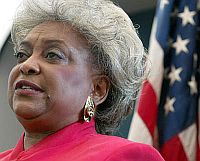 | SUPERVISOR OF ELECTIONS
DR. BRENDA SNIPES |
OK...what happened at the polls? The results from the Broward County Supervisor of Elections, Dr. Brenda C. Snipes, reflect 124 precincts (100%) tabulated. Question 1 asked if the City Commissioners could select their own assistants. As mentioned, that task was previously performed by the City Manager. Surprisingly, the vote was relatively close, with 32,803 (54.15%) positive and 27,770 (45.85%) negative responses. Apparently, many voters were confused by the question, �Should the Charter of the City of Fort Lauderdale, Florida, be amended to authorize the City Commission to appoint and supervise commission assistants?� Voters thought that the Commissioners were asking for permission to hire additional assistants immediately, thereby inflating the city�s hefty payroll during the budget crunch. In fact, no such intention exists. The question refers to assistants that will be retained in the future. Question 2 transfers control of the City Auditor�s Office from the City Manager to the City Commission. Despite a marginal controversy because it envisions the Commission financially policing itself, the issue passed with landslide support, 47,421 (77.58%) vs. 13,701 (22.42%). Question 3 positioned the Commission to offer better protection for our City Parks, requiring a unanimous vote by the City Commission to alter the protective zoning of City Park land. This effectively invests every Commissioner with a veto power over any suspicious arrangement that threatens �Public Trust� park assets. The question passed with 45,553 (74.59%) YEAS vs. 15,522 (25.41%) NAYS.
The Fire-Rescue Bond Issue, Question 4 on the Ballot, enjoyed heavy support by city officials, neighborhood associations (including the Galt Mile Community Association), residents, businesses and municipal employees. It passed by a 2 to 1 plurality, with 42,209 (66.68%) YEAS and 21,096 (33.32%) NAYS. It relieves current city taxpayers of the full financial burden posed by the modernizing of our antiquated Fire-Rescue facilities. Its mortgage-like structure will �spread the pain� equitably to both future and current residents. Simply put, everyone that benefits from the upgrade will participate in its financing! The question met with minor resistance from some realtors and the �time-share� industry because those �future residents� with whom the cost will be shared comprise their customer base. Additional expenses for Fire-Rescue facilities or anything else are additional obstacles that interfere with attracting new business for Realtors.
Passage of the Fire-Rescue Bond referendum yielded a serendipitous benefit. Owing to the City�s budgetary woes, bond rating agencies have cut the precious rating assigned to the City of Fort Lauderdale. The diminished rating makes it more expensive for the city to raise money in the secondary market. Any demonstration of fiscal stability will encourage a positive reevaluation of the risk factor that determines the City�s rating. The sensible financing structured in the Fire-Rescue Bond Issue will serve as a palliative to those that pass judgment on the municipality�s fiscal health - a step in the right direction.
To inform yourself about the Fort Lauderdale issues decided on Election Day, Click Here. For details concerning the critical Fire-Rescue Bond referendum, Click Here. Click Here to read the Fort Lauderdale City Charter. If you want to review the raw election data from the Broward County Supervisor of Elections web site, Click Here. The Galt Mile Community Association wishes to thank all of our residents for VOTING ON ELECTION DAY. When we vote, we stay strong!
Click To Top of Page
�Do it Yourself � Urban Development
  
Park Permit Hijinx

October 22, 2004 - On October 21st, Fort Lauderdale Mayor Jim Naugle told Galt Mile Community Association Advisory Board members that an affirmative answer to Fort Lauderdale Ballot Question No. 3 on Election Day would help protect precious park areas throughout the city. The Question, �Should the Charter of the City of Fort Lauderdale, Florida, be amended to require that any conveyance of City-owned land zoned Park in accordance with the City�s Unified Land Development Regulations or the removal of such zoning designation be approved by a unanimous vote of the entire City Commission?� Since each Commissioner represents a different area or �district� of Fort Lauderdale, passing this amendment would give the Commissioner whose park space was at risk a �veto� over its loss or �transformation�. That Commissioner would then have to explain to constituents why the loss of valuable �green space� was allowed - no wiggle room. The Mayor is right. If park space in a particular district is to be forfeit, the benefit to the City should be so self-evident and all-encompassing that the representative Commissioner will be comfortable explaining the loss to constituents.
 | | SE 13th STREET MEDIAN BEFORE CONSTRUCTION OF PARKING LOT |
Ironically, a recent incident questioned the efficacy of this amendment. Galt Mile residents aren�t the only unfortunates that are unceremoniously awakened to the soft strains of construction equipment. It happens throughout the �Venice of America�. On Southeast 13th Street in Poinciana Park, the inhabitants awoke one July morning to find a tree-dotted median park being noisily transformed into a parking lot. The grassy street medians that afford that neighborhood some �green space� are generally used by joggers and dog walkers. The residents of the neighborhood didn�t ask for the 15-space parking lot. They preferred the greenery. A Broward County powerbroker, Hamilton Forman, wanted the parking lot.
The resilient real estate investor who�s Charter School of Excellence (currently serving as Secretary of the school�s Board of Directors) lies adjacent to the parking lot (as well as his church), applied for a permit to accommodate their parking needs. The neighborhood, zoned for residential and commercial use, is home to some influential county icons including Broward Circuit Judge Kathleen Ireland and Broward County Mayor Ilene Lieberman�s law practice. Not coincidentally, the area is also home to Ham Forman�s Way, a tribute street that meanders through Poinciana Park to SE 11th Street.
Local residents were never consulted about their median park�s conversion into an asphalt strip. Angry community activists are engaged in a whirlwind of damage control, contacting and meeting with City officials to reverse what they consider to be a perversion of the permit process. They want their park back. Intransigent, Forman responded that, �I have no intention of giving up those spaces. I personally have parked in those medians there for 75 years.� The cost to Forman for the construction was $8000 plus a few bucks for the permit. He asserted, �I regard my ability to park there as kind of a constitutional right.�
 | PATRIARCH HAMILTON WITH
AUSTIN AND COLLINS FORMAN |
83 year-old Hamilton Forman once owned most of Davie. He is probably the individual most responsible for West Broward�s explosive growth. He sued the State to prevent the Florida Turnpike from being built on its originally intended site, the corridor currently occupied by Interstate 95. Instead, he maneuvered the Turnpike�s placement further west to snake through his land, eliciting additional overpasses and exits that provided the access required for West Broward�s ultimate development. Nova Southeastern University and the four Nova public schools were built on Forman�s land and financed, in large part, through his efforts - in recognition for which Blanch Forman Elementary School was named after his mother. Forman fostered the growth of the North Broward Hospital District, engineering the construction of the North Broward, Imperial Point and Coral Springs medical centers. Forman also developed Broward�s first County Charter, wherein the powers and responsibilities of county government are delimited. During his 55 years as a shaper of worlds, he has sponsored a huge collection of elected officials who are a phone call away. Campaign support in the form of professional advisors, poll workers and buckets of money has inflated Forman�s political black book to unparalleled stature. As such, he has cultivated a crop of new �power brokers�, all indebted to Forman. The community activists trying to reclaim their green space have their hands full.
Although the Ballot Question amendment would enable a City Commissioner to slam the front door on an unsupportable loss of �Public Trust� park land, this incident outlines an elephant-size loophole that effectively subverts the amendment�s intention. There is no need to change the zoning designation of a park when anyone can apply for (and receive) a permit to legally construct self-serving projects on city-owned park property. Using the permit process as a fast track to �back-door� the loss of green space sets a dangerous precedent. Genia Ellis, president of the Council of Fort Lauderdale Civic Associations, explained, �It tells you that any area in a neighborhood can basically be acquired for private use through a permitting process; the public isn�t even queried on it.� What use is providing Commissioners with de facto veto power over zoning indiscretions if a permit will provide the applicant with permission to build a parking lot, or anything else, on park land?
Again, the Mayor is correct in supporting this amendment. It�s a laudable first step. However, city officials would do well to consider plugging this permit loophole before they come to City Hall one day and find construction of a toxic waste dump underway in Stranahan Park!
Click To Top of Page
A King�s Loophole Gets Plugged!

 February 20, 2005 - The King�s Loophole - a bedtime story. Once upon a time during the summer of �04, a very powerful figure in the County of Broward decided that he wanted a parking lot across the street from an establishment with which he had an affiliation. This County Icon served on the Board of Directors of an exclusive private Charter School called the harter School of Excellence<. Down the block from his Charter School was his Church, the First Christian Church of Fort Lauderdale at 201 SE 13th Street. The School and the Church were nestled in a beautiful residential boulevard with a park-like median separating the alternating lanes of traffic. Community residents took long walks along the grassy median. It set the tone for the neighborhood. Unfortunately, the powerful man decided that he would prefer a parking lot for easy access to his School and his Church. Despite the �No Parking� signs, the influential man illegally parked on the median for years. He unabashedly demolished the wooden barriers that the City foolishly emplaced to deter parking on the grass. In fact, at a September 20th Planning and Right-of-Way Committee meeting, he announced, �The first time (the city) put some in front of the church, I went out and got a sledgehammer and knocked �em down.� Having wearied of destroying City property while parking his car... he built the lot ...on the grassy median... that the City owned. February 20, 2005 - The King�s Loophole - a bedtime story. Once upon a time during the summer of �04, a very powerful figure in the County of Broward decided that he wanted a parking lot across the street from an establishment with which he had an affiliation. This County Icon served on the Board of Directors of an exclusive private Charter School called the harter School of Excellence<. Down the block from his Charter School was his Church, the First Christian Church of Fort Lauderdale at 201 SE 13th Street. The School and the Church were nestled in a beautiful residential boulevard with a park-like median separating the alternating lanes of traffic. Community residents took long walks along the grassy median. It set the tone for the neighborhood. Unfortunately, the powerful man decided that he would prefer a parking lot for easy access to his School and his Church. Despite the �No Parking� signs, the influential man illegally parked on the median for years. He unabashedly demolished the wooden barriers that the City foolishly emplaced to deter parking on the grass. In fact, at a September 20th Planning and Right-of-Way Committee meeting, he announced, �The first time (the city) put some in front of the church, I went out and got a sledgehammer and knocked �em down.� Having wearied of destroying City property while parking his car... he built the lot ...on the grassy median... that the City owned.
Coincidentally, the City was promoting the passage of a new ordinance. This ordinance said that City-owned Park land couldn�t be bartered without the unanimous consent of the City Commission. Giving every Commissioner a veto over the injudicious use of valuable green space would protect the precious dwindling naturescape. In fact, a special referendum in the form of a ballot question posed to the City�s electorate confirmed that 74.59% of the City�s residents wanted the City Commission to have this power; they agreed that no one should be able to capriciously adulterate their green space.
When this influential man�s Poinciana Park neighbors saw that their median was gone - replaced by a parking lot - they went to City Hall and complained, �Someone covered our grassy median with asphalt!� On October 17th, they told the Mayor and the City Commission, �We don�t want the parking lot; we want our park-like median back.� City officials said, �Bedebeep bedebop bedeboop, hmmm... we didn�t know blah blah...!� But...there it stayed...hard, black and sticky.
 | PATRIARCH HAMILTON WITH
AUSTIN AND COLLINS FORMAN |
Octogenarian Hamilton Forman once owned most of Davie. During a long and prosperous career, he fostered the development of West Broward, engineered the growth of the North Broward Hospital District, helped finance the Nova Educational Complex (which was built on his land) and shaped the original Broward County Charter. A classic powerbroker, Forman�s influence was more than adequate to blacktop the median occupying the place he wanted to park... even if it did belong to the public. His rationale was simple, �I regard my ability to park there as kind of a constitutional right.�
In view of just having passed their �park-protecting� ordinance, the City Commission was placed in the awkward position of explaining this inequity. If an �average� citizen could circumvent the process and use park property (or street medians) for a personal agenda simply by applying for a �permit� to do so, the new ordinance would appear as a useless bit of political fluff. The Poinciana Park Civic Association decided to raise hell about the dangerous precedent. They enlisted the aid of Genia Ellis, president of the Council of Fort Lauderdale Civic Associations. She framed the loophole as, �It tells you that any area in a neighborhood can basically be acquired for private use through a permitting process; the public isn�t even queried on it.� As neighborhood associations throughout the City became aware of the travesty, their survival instincts led them to offer their support to Poinciana Park. After all, this could just as easily have happened to any one of them!
The City decided to act. Having carefully investigated and properly navigated the loophole, Ham Forman�s median transformation was accomplished legally. By using the tactic of securing a simple building permit as authorization for his plan, he avoided the public scrutiny that he would have been subject to had he brought his intentions before the City Commission and the Mayor. When queried about reconsidering his actions, he made it clear that he was not predisposed to returning the median to its original state. �I have no intention of giving up those spaces. I personally have parked in those medians there for 75 years.� The writing on the wall read, �Too little, too late�. The community would have to acclimate to the asphalt. Walkers and joggers would have to find another route. The battle was lost.
But not so the war! If Poinciana Park would be forced to bear the asphalt scar, it wouldn�t be for nothing. The defeated but irate community vowed to prevent this loophole from being used again to injure some other unsuspecting neighborhood. They would plug the loophole. On January 12, 2005, Poinciana Park Civic Association President Karl Gloekner notified the City that they were throwing in the legal towel. However, they requested that an ordinance amending the City Charter�s Chapter 25-100 right-of-way permits, �include appropriate wording to ensure input and review of all proper channels, including but not limited to: adjacent property owners, Civic/Homeowner Association, Property and Right-of-Way (PROW), Planning & Zoning, DRC, BOA, Parks & Recreation, Code Compliance and Commission as appropriate.�
 | NEW CITY MANAGER
GEORGE GRETSAS |
The next day (January 13th), City Manager George Gretsas sent Memorandum 05-101 to the Mayor and the 4 other City Commissioners recommending that they �approve the proposed ordinance amending Chapter 25-100 right-of-way permits...� In Gretsas� memo, he outlines the process in which �permits issued for conversion of landscaped medians into parking areas or travel lanes be approved by the City Engineer, only after review by the City�s Property and Right-of-Way Committee (PROW) at a meeting for which the public is given notice and an opportunity to comment.� In addition to posting signs identifying the PROW agenda - including the meeting time, place and subject - notices will be mailed to the relevant Homeowner/Business Association and to property owners within 300 feet of the intended alteration. After eliciting public input, the City Commission would be afforded the opportunity to adjudicate the desirability of the project and, if found worthy, issue a permit.
Unlike most stories that reflect a failure of our laws to protect us, this anecdote carries a message of hope. The system failed miserably. The victimized community that lost an irreplaceable asset will receive neither justice, restitution nor an apology. What, then, can be considered �positive� about this municipal molestation? Instead of quietly sweeping this nasty mess under a rug, the City Commission acted to prevent it from happening again. They reacted consistently with the rhetoric supporting their �ballot question� - to prevent our parks from being bargained away as political fodder. New City Manager George Gretsas could have pleaded �unfamiliarity� with the political food chain. Instead, he worked with the injured community in a sincere but futile effort to undo what was unjustly, yet legally, perpetrated. By enacting this ordinance, they�ve admitted that the City, not only the community, was victimized. On one side was an angry community that will be slow to forgive city officials for this legal manipulation on their watch. On the other was a cornucopia of political resources that could prove extremely useful on Election Day. Our municipal guardians opted to side with those they�ve sworn to protect, not with a re-election insurance policy. When our elected officials remind us why we elected them, we all get to share a warm fuzzy feeling.
Click To Top of Page
District 1 F.L.P.D. Review
  
by Major Mary N. Negrey

 | | MAJOR MARY NEGREY |
November 19, 2004 - On November 17th, Galt Mile�s Commissioner Christine Teel received a crime update for our neighborhood from Major Mary Negrey of Police District 1. Included in the report are the first steps taken towards revitalizing the budget-ravaged Police Department. Our new City Manager, George Gretsas, helped settle the new contract with the Fort Lauderdale Police Department. He successfully traded the �longevity� provision wanted by the Union for new hires to fill budget-related vacancies. Commissioner Teel decided that this information should be shared with the affected community � us! As such, this is the original report as delivered to Commissioner Teel and forwarded to us. - Editor
To: Commissioner Christine Teel
In reviewing our statistical information in October, comparing to last October and the previous three months, we note a reduction of 23 part one crimes or - 12% Sept 04 to Oct 04. However, there was a 12% increase when comparing Oct 03 to Oct 04. For the first 2 weeks of November, we have reported a decline in the second week in virtually all part 1 crimes (except larcenies). Week to week changes do occur frequently, but our close monitoring of these help us direct our Tactical Officers quickly to address problems as they occur.
 | | Comm Teel |
Burglaries continue to be of concern, especially vehicular burglaries. Vehicular burglaries occur in any setting - mall parking, shopping center parking, restaurant parking lots, schools and aftercare parking or at your home. They occur all times of the day and during the night. Recently, the most problematic are those burglaries of vehicles along major roadways such as N. Federal Highway where someone parked their car and left valuables clearly visible from the outside in the passenger compartment. Commonly, the driver only ran inside a store for a short while (for example, just to get a cup of coffee). Frequently stolen items are laptops, purses, briefcases, and cell phones. We�ve been distributing flyers to businesses where more frequent occurrences have been reported, placing our mobile message board on heavily traveled roadways, issuing Beat Watches, covertly surveillance of targeted lots, and speaking at every opportunity to remind folks to be more aware and diligent when securing their belongings. (As an aside - I saw one of the news channels is doing a story on this tonight, I think it was channel 6 or 7 - I�ll have to watch for that!).
Over the last month, we also noted an increase in the number of burglaries of the kiosk�s inside the Galleria Mall. We have been using decoy officers to monitor the activity here. The burglaries are occurring just before the mall opens in the early morning hours. We�ve found that due to the continued construction of the shops inside the mall, many doors are open to allow worker (and possibly others) access. We have identified a suspect and continue with working towards making an arrest.
Traffic issues continue to be a significant concern. We request our Motor Unit to conduct traffic enforcement action on those sites when requested. The round-about at NE 15 Ave and NE 18 St. has been one where we have issued numerous warnings as well as citations. We are working with Traffic Engineering to suggest some changes to the intersection that we feel will resolve the problem of drivers failing to yield as they travel through that area.
We have started hiring Police Officers again after more than a year. We have hired 11 new Police Officers, 7 are in the Academy and 3 are certified (meaning they are already Police officers and will start training on the road immediately). Our background investigators continue to process applicants as quickly as possible so we can fill vacancies. Our current total sworn staffing will be 498 sworn and 49 PSAs [Public Safety Aides - editor]. We currently have 45 Police Officer vacancies (9%) and 6 PSA vacancies (12%). As we continue to bring our staffing levels back toward full strength, we will work to address community concerns, quality of life issues, traffic and crime in those creative and problem solving ways.
As we approach the Holiday Season, we ask that everyone work to keep themselves as well as their belongings safe and secure. We will continue to provide information to all our Homeowners Groups regarding tips on security, both personal as well as for your property.
Major Mary Negrey
We wish to thank Major Mary Negrey and Commissioner Christine Teel for their service to our community!
 Click Here to access Commissioner Teel�s City of Fort Lauderdale web page. To email Commissioner Christine Teel, Click Here. Click Here to access Major Mary Negrey�s City of Fort Lauderdale web page or to email the Major, Click Here. Click Here to access links to the City of Fort Lauderdale Crime Statistics. To access links to the State of Florida crime statistics, Click Here! Click Here to access Commissioner Teel�s City of Fort Lauderdale web page. To email Commissioner Christine Teel, Click Here. Click Here to access Major Mary Negrey�s City of Fort Lauderdale web page or to email the Major, Click Here. Click Here to access links to the City of Fort Lauderdale Crime Statistics. To access links to the State of Florida crime statistics, Click Here!
Click To Top of Page
Let George Do It!
  
City Manager George Gretsas � the First 100 Days

November 22, 2004 - George Demetrios Gretsas was going about his business as the Mayor of White Plains� strong right arm when a colleague handed him an advertisement taken from the New York Times. The �ad� described a nightmare employment opportunity in Fort Lauderdale - the City Manager position. Come to sunny South Florida - Fort Lauderdale has no money - low employee morale - contract disputes - budget crisis...etc. He immediately applied for the job for which he was ultimately chosen. This anecdote demonstrates the reason that the City Commission selected Mr. Gretsas over candidates that were academically and experientially more qualified. Mr. Gretsas thrives on challenges. Nonetheless, it didn�t disappoint the Commission when Mr. Gretsas remarked that his primary loyalty would be to �the elected officials� as opposed any particular constituency or city staff. Despite his lack of credentials as a City Manager, the City Commission�s gamble on his exuberance and intensity seems to be paying off.
 | NEW CITY MANAGER
GEORGE GRETSAS |
Our new City Manager addressed the Galt Mile Community Association Advisory Board on November 18th. He summarized his first 100 days� experience in the new position. His first major impact on City Hall was an expeditious reorganization of City government. Over the years, the city embarked on a program of consolidation, combining Departments to realize a financial benefit. Unfortunately, the city overzealously pursued this program to the point of gross inefficiency. Officials were charged with control of services outside their experience. According to Gretsas, �Department heads couldn�t properly organize or control in-house or field staff.� Bloated, poorly administered departments suffered from, �ineffective internal communications as well as poor communication with other Departments.� Mr. Gretsas instituted on an �anti-consolidation� effort, expanding the 9 City Departments into 16. After relieving the effects of overconsolidation, he imbued the heads of the reconstituted Departments with some clear and non-negotiable responsibilities. Gretsas elaborated, �Every Department head is required to enumerate their goals and objectives to the City Manager within 70 days.� Depending on their success or failure, this list of �expected accomplishments� becomes the springboard for either their advancement or dismissal. Serendipitously, Gretsas� restructure of municipal departments to promote improved communication and control carried a rather pleasant side-effect - a $250,000 savings!
 | | F.L.P.D. GETS CONTRACT |
Contract disputes are anathema to productivity and morale. The City had little chance of maximizing its critical �Public Service� resources while City Police and Fire-Rescue personnel operated within an employment �fog�. The prolonged contract negotiations had dispirited the workforce and made budget projections impossible. Gretsas expeditiously achieved agreement between the City and its unions, refocusing the criteria for advancement from longevity to merit. The main determining factor for promotion would be, as required of Department Heads, one�s success in achieving their goals and objectives - not the static �time in� a particular position. The downside to guaranteeing a �job for life� is clearly visible at every level in every city department (or, for that matter, in any business where it proliferates!) Mr. Gretsas struck a balance among �job security�, merit-based advancement and the betterment of the overall Force. �We traded longevity for new hires,� he explained. In addition to budget-based morale problems, unfilled vacancies have placed additional responsibility and pressure on the rest of the Police Force. He continued, �Now that the contract is settled, employees know where they stand and the City has started to fill vacancies.� Gretsas said that he is �also adding 13 new positions.�
The City Manager pointed to another longstanding municipal quagmire. Apparently, staffing levels are being determined by the �gut feelings� of the various Department Heads. Dogmatically, when poor administrative decisions lead to departmental difficulties or excessive overtime, those in charge have a tendency to blame insufficient personnel. Gretsas intends to engage a Consultant with expertise in this area. This will allow City officials to determine whether or not the claim of being understaffed is credible or if it is a smokescreen for inefficiency or incompetence.
 | | WASTE MANAGEMENT - SOLE PROVIDER |
Another feather in Gretsas� cap was the privatization of waste removal services within the city. The City of Fort Lauderdale shared the responsibility for trash collection with Waste Management, Inc. on a 40% - 60% basis. By dividing the work, the city was able to compare costs and control quality of service. Being �in the business� allowed the city to pass authoritative judgment on its partner�s performance. Gretsas carefully assessed Waste Managements� potentially assuming sole collection responsibilities for the entire city. After satisfying himself that their record warranted �high marks� for their performance, his �package� to the private company included a $565,000 purchase of the City�s equipment and vehicles and directly hiring 14 sanitation employees currently working for the City. The estimated annual savings of $890,363 would be warehoused in a reserve fund pending the success or failure of the effort. Should Waste Management�s service levels deteriorate, the city wants to be able to reinitiate in-house collection. The roughly $4 million savings realized over the first 5 years would approximately equal the City�s startup costs should the experiment fail and require the City to reassume control. Gretsas said, �More likely, the program will be successful and the City will have some money socked away in a reserve fund.�
Upon arriving in Fort Lauderdale from New York, Mr. Gretsas applied for a permit to do construction on a deck. He got a taste of the frustration suffered by residents when facing the City�s permit process. After reviewing the problem, he decided that the dilemma needed attention in two areas. Anyone that has recently dealt with the Building Department will attest to the fact that they suffer from severe understaffing. Inspectors, investigators, reviewers, etc. will all confirm that the budget gaffe has crippled the department�s ability to function commensurate with current demand. As with other City Departments, Gretsas intends to reorganize the Building Departments� staff. The City Manager also pointed out that �there are two categories of Building Department staff - the Community Inspections and the Construction Services personnel involved in the permit process.� Gretsas continued, �I intend to merge them into one unit, thereby speeding up the process. Once accomplished, the Department will be better prepared to focus on customer service.� Gretsas spoke optimistically of this occurring sometime soon. When questioned about the timing, he said that the Department was in the process of moving into improved accommodations�a new building. Unfortunately, the building �can�t currently pass inspection because the roof leaks.� Sometimes life is poetic.
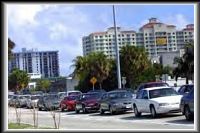 | | COUNTY CONTROLS CITY TRAFFIC |
Mr. Gretsas found the division of labor between the City of Fort Lauderdale and Broward County to be disconcerting. In White Plains, for instance, he was able to access �traffic central�, a room populated with �computers and monitors that actively reflected and controlled the City�s changing traffic patterns in real time.� Flow, compensation and emergency response were at his fingertips. In Fort Lauderdale, Broward County controls traffic within the city�s borders. He is therefore developing a working relationship with Broward County Administrator Roger Desjarlais - his county counterpart of sorts.  | | ROGER DESJARLAIS |
As the City�s �point man�, Gretsas has also assumed a leading role in settling the war with Broward County over control of Land Use. �Land Use� is a buzz word for development. While the political decisions for Fort Lauderdale rest with the Mayor and the City Commission and the Broward County Commission will similarly decide the County�s position, Gretsas will be working with Mr. Desjarlais behind the scenes. He stated that, �the City considers this to be a �Home Rule� issue.� The Governor has already weighed in on this issue by canceling a piece of legislation that would have given the County�s municipalities complete control of development with their borders. Tallahassee has intimated that they want to see a settlement between the County and the cities. It now falls to the various city governments and the Broward County Commission to allow Desjarlais, Gretsas and other city managers to do the heavy lifting.
 | | OFFICER SCOTT RUSSELL |
Gretsas related an experience he had while returning to City Hall at 1 AM with Officer Scott Russell of the Homeless Outreach Team, the City�s �Homeless Squad� that receives special training in crisis intervention. Russell has distinguished himself as a paragon of Police relations with the Homeless, receiving an award for his model efforts in 2000 from the Florida Coalition for the Homeless. They found an 82-year-old World War II veteran living on the steps of City Hall. They awoke the �Homeless� vet and spoke with him at length. The vet wasn�t aware that he was entitled to a virtual buffet of benefits - including medical help - from the government. He didn�t return to the steps again the following evening. Gretsas decided to use the City Hall steps as a microcosm. If he �could keep the steps clear by helping those who wanted help and clearing out those who didn�t,� he could expand the formula throughout the city. It will be interesting to see if the new City Manager can keep his balance while walking a tightrope between improving the city�s image and avoiding a backlash by civil liberties proponents - a walk that former Mayor Rudy Giuliani successfully took in New York City.
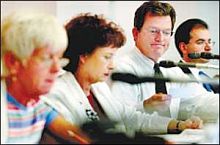 | CITY COMMISSION BUDGET MEETING
HUTCHINSON - NAUGLE - GRETSAS |
Whether the City Commission did an excellent job of scientifically selecting the new City Manager or simply �lucked out�, George Gretsas seems to be getting the job done. City Commission meetings are peppered with contentious distractions, often arising from personal disagreements among Commissioners. Anyone watching the Commission meetings in person or on Cable Channel 38 has seen Mr. Gretsas perform numerous �respectful interventions�, wherein he would encourage the Commissioners to focus on the issue being considered. Some of the benefits from Mr. Gretsas� output, such as the new mood in the Police and Fire-Rescue Departments since the contract settlements, are obvious. New officers are filling vacancies, shaky shifts have been stabilized and the general sense that things are improving is slowly permeating City Hall. Other unexpected, yet positive, outcomes from his efforts are below the radar. During the City Commission�s second budget meeting on September 21st, some of the Commissioners questioned whether Fort Lauderdale could afford a departmental restructuring amid this belt-tightening environment. Several Commissioners were surprised to learn that the restructuring actually saved the City a quarter of a million dollars.
Since Fort Lauderdale was knee-deep in a sordid fiscal morass when Mr. Gretsas took control on August 2nd, he never experienced the usual �Honeymoon Period� afforded to municipal saviors upon entering the fray. A budget disaster, hurricanes, contract nightmares - and he�s still standing. An unasked question at the Advisory Board meeting was whether he could sustain this torrid pace? Unasked because of an anecdote he related early in the meeting. After the hurricane onslaught, he visited Punta Gorda, a city that was tragically lambasted. The dramatic distinction between the mind-boggling challenges faced by Punta Gorda�s residents and our own difficulties impressed Mr. Gretsas, �It helped put our problems into perspective.� He stated, �I couldn�t help identifying with the way the residents persevered in the face of problems that dwarfed our own.� Mr. Gretsas is beginning to assume the character of something that one might find under their tree or next to a spinning dreidel during the holiday season. Whether a Christmas present or �Hanukkah gelt�, the first 100 days seems to indicate that the City got a prize in our new City Manager.
Captain Gregory Salters

 | | CAPTAIN GREGORY SALTERS |
Accompanying Mr. Gretsas at the November 18th Advisory Board meeting was Captain Gregory Salters of the Fort Lauderdale Police Department. Salters� charge is District 1 Patrol - the Galt Mile neighborhood. An eleven year veteran, Salters joined the FLPD on January 11, 1993. Academically well prepared for his duties, he earned a BS in Business Administration and a Masters in Public Administration from Florida A&M University and is an Adult Education doctoral student studying Human Resource Management at Florida International University. He worked as a financial planner for C & S Bank prior to joining the force. Salters expanded on Mr. Gretsas description of the Department�s Homeless policy. There are, in fact, 60 officers that comprise the Homeless Outreach Team scattered throughout the city. While the vast majority of F.L.P.D. officers have taken the �Homelessness 101� training, these specialists are also schooled in crisis intervention techniques.
Captain Salters explained that there is a local District 1 unit known as �Quebec 17� stationed near L�Hermitage Condominium at Earl Lifshey Park. They have had substantial experience responding to calls from the various Condos that line the Galt Mile - including Plaza South, Galt Towers, Commodore and L�Hermitage. He described how the officers walk a fine line in separating the Homeless that need assistance from those involved in criminal activity. He said that the majority of those addressed by officers take advantage of the Full Service �Homeless Assistance Center� that the City maintains for remedial and long-term aid to the Homeless. They have also been successful in ridding the community of trespassers and other law breakers operating under the guise of being Homeless.
Salter�s challenge is similar to the one facing Mr. Gretsas - lowering the Homeless presence through a program of assistance and enforcement. The Captain points to successes that the �Quebec 17� unit has enjoyed and expects that they will continue. Captain Salters confirmed the improved work environment for the Police, stating that the Department was optimistic and enthusiastic about the new regime. He asked for and was granted the cooperation of the Galt Mile Community Association�s member Associations. As Salters� enthusiasm started to infect us, we asked ourselves, �is there any reason why Rudy Giuliani�s carrot and stick can�t be deployed in the �Venice of America�?� Although we�ve been down this road before, the question remains ripe for begging ...why not? With the support of the community, Police officers like Captain Salters and a clear mandate from the City Manager, we may yet see results.
Captain Gregory Salters invited questions from the residents of the Galt Mile neighborhood. His email address is [email protected]. He can be reached by telephone at (954) 828-5483. City Manager George Demetrios Gretsas� offices are located at 100 N. Andrews Avenue, Fort Lauderdale, FL 33301 and his telephone number is (954) 828-5013, Fax number is (954) 828-5021. For additional information about City Manager, Click Here!
Click To Top of Page
Qualified Candidates  Ready to Run in... Ready to Run in...
Broward  County County

 July 18, 2004 - The qualifying deadline for candidates aspiring to office in Broward County election districts was Friday, July 16th at Noon. Hopefuls will vie for a variety of elective offices including the State Senate, the State House of Representatives, the Broward County Commission, The Broward County School Board and a half dozen Broward County Constitutional positions. Filing qualifies the candidates to run in the August 31st primaries or non-partisan School Board races. July 18, 2004 - The qualifying deadline for candidates aspiring to office in Broward County election districts was Friday, July 16th at Noon. Hopefuls will vie for a variety of elective offices including the State Senate, the State House of Representatives, the Broward County Commission, The Broward County School Board and a half dozen Broward County Constitutional positions. Filing qualifies the candidates to run in the August 31st primaries or non-partisan School Board races.
 | Senator JEFFREY ATWATER &
Representative ELLYN BOGDANOFF |
Galt Mile residents belong to Senate District 25 and House District 91. District 91 Statehouse Representative Ellyn Bogdanoff was granted her wish to �win by less of a cliffhanger.� After defeating former Lauderdale-by-the-Sea Mayor Oliver Parker by a paper-thin 12 votes (along with six other candidates) in a January special election to fill Connie Mack IV�s vacated house seat, no one opted to run against her six months later. Unopposed, Representative Bogdanoff secured her House seat for two more years. Incumbent Senator Jeffrey Atwater wasn�t quite as fortunate. While he won�t face a Democratic challenger, he will face write-in candidate Alex Schraf.
 | | PUBLIC DEFENDER ELECT HOWARD FINKELSTEIN |
Other candidates who won uncontested seats were Senators M. Mandy Dawson, Steven A. Geller and Gwen Margolis. In the Statehouse, Richard A. Machek, Irving Slosberg, Jack Seiler, Ron Greenstein, Eleanor Sobel, Timothy M. Ryan, Mike Davis, Rafael Arza, Kenneth Gottlieb and David Rivera joined Ms. Bogdanoff as unopposed seat winners. Ilene S. Lieberman and Ben Graber were returned unopposed to the Broward County Commission. Clerk of Courts Howard C. Forman and State Attorney Mike Satz were also returned to their respective offices. Chief Assistant Public Defender Howard Finkelstein will replace Alan Schreiber as Broward�s Public Defender, his Television celebrity (on air legal analyst for the Fox networks local affiliate, WSVN Channel 7) establishing a name recognition that presented an insurmountable obstacle to intimidated potential opponents. Only Benjamin J. Williams won an uncontested Broward County School Board seat.
 (I)� Incumbent, (E) � Elected Unopposed (Bold), (W) � Write-In Candidate, (I)� Incumbent, (E) � Elected Unopposed (Bold), (W) � Write-In Candidate,
(P) � Primary Winner, (NPA) � No Party Affiliation
Candidates for State Senate
| District |
Republicans |
Democrats |
Others |
| |
|
|
|
|
|
| District 25 |
Jeff Atwater (I) |
|
Alex Schraf (W) |
| District 27 |
Michael Fletcher |
David Aronberg (I) |
Stan Smilan |
| District 29 |
|
M. Mandy Dawson (I)(E) |
|
| District 31 |
|
Steven A. Geller (I)(E) |
|
| District 34 |
Fabio A. Andrade |
Nan H. Rich |
|
| District 35 |
|
Gwen Margolis (I)(E) |
|
| District 39 |
Joseph E. Delaney |
Larcenia J. Bullard (I, P)
Sheila L. Chamberlain
Ron Saunders |
Micaela Junco (W) |
Candidates for State House of Representatives
| District |
Republicans |
Democrats |
Others |
| |
|
|
|
|
|
| District 78 |
|
Richard A. Machek (I) (E) |
|
| District 83 |
Carl J. Domino (I) |
David Prestia |
|
| District 85 |
Andy Edwards |
Shelley Vana (I) |
|
| District 86 |
|
Anne M. Gannon (I) |
Zacharia Varughese (W) |
| District 87 |
Adam Hasner (I) |
Caravita �Cara� Sansonia
Doug West(P) |
|
| District 88 |
Ed Heeney |
Susan Bucher (I, P)
Joel Silver |
Dan Gladstone (W) |
| District 89 |
|
Mary Brandenburg (I, P)
Elna Laun |
|
| District 90 |
|
Irving �Irv� Slosberg (I)(E) |
|
| District 91 |
Ellyn Bogdanoff (I)(E) |
|
|
| District 92 |
|
John P. �Jack� Seiler (I)(E) |
|
| District 93 |
|
Christopher �Chris� Smith (I, P)
Sallie Tillman-Watson |
Katherine Debriere (W) |
| District 94 |
|
Matthew �Matt� Meadows (I, P)
Eric Hammond |
Henry Bonner (W) |
| District 95 |
|
Ron Greenstein (I) (E) |
|
| District 96 |
|
Ari Abraham Porth (P)
Mark Weissman |
Michael Natale (NPA)
Daniel Steven Nicolaison (W) |
| District 97 |
Susan K. Goldstein |
Barbara Herrera-Hill (P)
Martin David Kiar |
|
| District 98 |
Eugene C. Cunningham |
Franklin Sands |
|
| District 99 |
|
Eleanor Sobel (I) (E) |
|
| District 100 |
|
Timothy M. Ryan (I) (E) |
|
| District 101 |
Mike Davis (I) (E) |
|
|
| District 102 |
Rafael Arza (I) (E) |
|
|
| District 103 |
|
Wilbert �Tee� Holloway (I, P)
Joseph �Joe� Cook |
Trevor Kincaid |
| District 105 |
|
Kenneth Gottlieb (I) (E) |
|
| District 112 |
David Rivera (I) (E) |
|
|
Candidates for the Broward County Commission
| District |
Republicans |
Democrats |
Others |
| |
|
|
|
|
|
| District 1 |
|
Ilene S. Lieberman (I) (E) |
|
| District 3 |
|
Ben Graber (I) (E) |
|
| District 5 |
Rick �Doc� Bruns |
Suellen H. Fardelmann
Alex G. Fekete
Lois Wexler (P)
Roger B. Wishner |
|
| District 7 |
|
John E. Rodstrom (I, P)
Randy Dunlap
Robert L. McKinzie, Jr. |
Robert J. Trafford (W) |
| District 9 |
|
Josephus Eggelletion Jr. (I, P)
Allen B. Jackson |
|
Broward County Constitutional Office Candidates
| Office |
Republicans |
Democrats |
Others |
| |
|
|
|
|
|
| Clerk of Courts |
|
Howard C. Forman (I)(E) |
|
| Sheriff |
|
Kenneth Jenne (I, P)
Karl Tozzi |
|
| Property Appraiser |
Mark J. Taravella |
Steven D. Johnson
J.R. Markham
Lori Nance Parrish (P) |
David Longstaff (W)
John J. Makos (NPA) |
| Election Supervisor |
Steve Shin |
Brenda Calhoun Snipes (I, P)
Jamie Bloodworth
Miriam McKinzie Oliphant |
|
| Public Defender |
|
Howard Finkelstein (E) |
|
| State Attorney |
|
Mike Satz (I) (E) |
|
Candidates for Broward County School Board
| District |
Candidates |
| |
|
|
|
| District 2 |
Douglas E. Costa, Beverly Ann �Bev� Gallagher (I, P) and Patricia �Patti� Good |
| District 3 |
Phyllis Adams, Maureen S. Dinnen (P), Marvin Quittner and Warren Sturman (P) |
| District 5 |
Benjamin J. Williams (I) (E) |
| District 9 |
Robin Bartleman (P), Gloria Burnell, Ruth Carter-Lynch, Minerva Casanas-Simon, Marvin Silverman and Terry W. Snipes (P) |
Write-In  Antics Antics
 | Supervisor of Elections Dr. Brenda Snipes
Running the Show AND Running for Office |
The filings included a slew of write-in candidates. Without explosive name recognition, write-in candidates have virtually no chance of winning an election. Since, by definition, their names don�t appear on the ballots, even those voters with intentions of writing in a candidate risk invalidating their votes by simply misspelling the unlisted name. The main reason that write-ins proliferate is component to political maneuvering.
When all the contending candidates for an office belong to one party, the primary serves as the election. The general electorate, regardless of party affiliation, chooses among the homogeneous (single-party) field. For instance, when three Democrats are competing for votes, Republican voters would likely tilt the election in favor of the Democrat with the strongest Republication ideations. Conversely, Democratic voters selecting from an all-Republican field would be predisposed to help elect the Republican with overt Democratic leanings.
 If a write-in candidate qualifies, a primary is mandated in which participation in the selection is limited to registered members of the same party; thereby eliminating any influence that voters registered to other parties would exert on the outcome. The primary winner then faces the negligible challenge posed by the write-in candidate. The general electorate is excluded until the field narrows to the one viable candidate chosen in the primary. If a write-in candidate qualifies, a primary is mandated in which participation in the selection is limited to registered members of the same party; thereby eliminating any influence that voters registered to other parties would exert on the outcome. The primary winner then faces the negligible challenge posed by the write-in candidate. The general electorate is excluded until the field narrows to the one viable candidate chosen in the primary.
Of the nine write-in candidates, five affect races wherein all of the other candidates belong to the same party (four in the Statehouse and one in the Broward County Commission). Due to the write-in candidate, the probable winners will be decided by members of the candidates� party, not the general electorate. All�s fair in love and...
Click Here to access the Broward Supervisor of Elections web site. Contact data for the Broward Supervisor of Elections is: office: Room 102, Government Center, 115 South Andrews Avenue, Fort Lauderdale, Florida 33301; Phone: (954) 357-7050, Fax: (954) 357-6685. To send an email, Click Here. To check the current field of qualified candidates (see above) running for office in the August 31st elections (primaries, etc.), Click Here. To check the field of candidates running for State offices, Click Here.
There are no excuses...VOTE!!!
Click To Top of Page
 Free Free  Lunch Lunch 

With District 1 Commissioner Christine Teel

 You are invited to attend a free luncheon meeting with District I City Commissioner Christine Teel on Wednesday, September 15, 2004 from 11:30 AM - 1:30 PM at the Beach Community Center, 3351 NE 33rd Avenue, Fort Lauderdale, Florida 33308. You are invited to attend a free luncheon meeting with District I City Commissioner Christine Teel on Wednesday, September 15, 2004 from 11:30 AM - 1:30 PM at the Beach Community Center, 3351 NE 33rd Avenue, Fort Lauderdale, Florida 33308.
Shredded BBQ Sandwich, Caesar Salad, Dessert and Coffee to be served promptly at 11:30 AM. You must be a City of Fort Lauderdale Resident and will need to show proof of residency upon arrival.

The Date: Wednesday, September 15th, 2004
The Time: 11:30 AM - 1:30 PM
The Place: The Beach Community Center
3351 NE 33rd Avenue in Fort Lauderdale

 Bring your questions and ideas to share and discuss. For more information and reservations please call (954) 828-4610. If you need reasonable accommodation to participate in this event, call (954) 828-5347. Bring your questions and ideas to share and discuss. For more information and reservations please call (954) 828-4610. If you need reasonable accommodation to participate in this event, call (954) 828-5347.
Click To Top of Page

From The Desk of
Commissioner Teel

July 1, 2004 - I am pleased to announce that George Gretsas, the City Commission�s unanimous choice, has signed his contract and will be with us shortly. We are continuing to work through the challenges facing the city and I look forward to hearing what the new City Manager will be proposing.
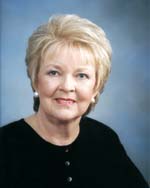 | DISTRICT 1 COMMISSIONER
CHRISTINE TEEL |
On June 8, 2004, Acting City Manager Alan Silva met with the City Commission to discuss the financial challenges facing the city for fiscal year 2004-2005. The budget planning process is a lengthy and intensive exercise involving all the city departments with the city manager�s recommendations being presented to the commission and citizens during the September 2004 commission meetings.
Mr. Silva has stressed it will take two to three years of continued extraordinary fiscal discipline to restore financial stability with shared sacrifice needed. The City has been living beyond its resources, not necessarily beyond it means. Expenditures, especially for salaries and benefits, have spiraled out of control, due to collective bargaining, lax controls of the number of employees, and shifting of the costs of pension and health benefits to the city. The consolidated Insurance Fund has amassed a multi-million dollar deficit, which will increase if appropriate action is not taken.
The past eight months brought many adjustments and changes to the current budget however, it is clear this is only the start of the journey to fiscal stability and health.
The FY 2005 budget must fully finance the cost of operations, continue the three-year process to pay-off debt/deficits and rebuild reserves, and realistically apprise the public of the appropriate level of revenue flows � both in fair user charges and taxes.
The City Commission is in recess during the month of August however, I am always available by phone or e-mail. Please feel free to contact me with any questions or suggestions. I can be reached at (954) 828-5004 or by e-mail at [email protected]
Have a safe and enjoyable summer 
Christine Teel
Click To Top of Page
 Commissioner Teel Speaks Out Commissioner Teel Speaks Out 
  
Addresses GMCA Advisory Board

 | | Commissioner Christine Teel |
June 17, 2004 - District 1 City Commissioner Christine Teel addressed a June 17th Galt Mile Community Association Advisory Board luncheon meeting at Nick�s Italian Restaurant. The Commissioner cast light on an assortment of issues currently affecting Galt Mile residents. She announced the selection of a new City Manager, George Gretsas, to take the reins from Acting City Manager Alan A. Silva. Describing him as enthusiastic and energetic, she praised his commitment to his work, which commonly places Mr. Gretsas in his office until 4 AM mopping up details. Her delight with the Commission�s selection was apparent, characterizing his intensity as one of the critical traits sought by the City Commissioners in aspiring candidates. A workaholic, Mr. Gretsas is an attorney who recently completed a 6 year stint as the Executive Officer to White Plains, N.Y., Mayor Joseph Delfino. Ms. Teel said that in his capacity as the man behind the Mayor, Mr. Gretsas demonstrated a dogged persistence and a single-mindedness of purpose while tackling challenges. While acknowledging that Mr. Gretsas never served as a City Manager and lacks experience in budgeting and balance sheet preparation, his deficiencies would be offset by a close collaboration with Alan Silva, the Acting City Manager with impeccable budgeting skills. This relationship, combined with Gretsas� anticipated hunger to achieve, underwrites Commissioner Teel�s stated optimism. Ms. Teel also pointed out that Mr. Gretsas lays claim to the unusual accomplishment of being elected to his community�s School Board at the age of 21 and subsequently serving three full terms.
 | NEW CITY MANAGER
GEORGE GRETSAS |
Although immersed in preparatory discussions and conference calls with top municipal management, Mr. Gretsas hadn�t as yet accepted the contract offered by the City Commission as of the Advisory Board meeting on June 17th. Commissioner Teel estimates that Mr. Gretsas, should he elect to sign the contract, would take the helm on August 2nd.
 Commissioner Teel spoke to the strange relationship between the City of Fort Lauderdale and the promoters of the annual Air & Sea Show, a nationally recognized celebration. The weekend long May event envelopes the entire city in waves of pride and patriotism. Millions of spectators (about 4 million in 2004), on the tube or first hand, have converged on Fort Lauderdale for the past ten years to participate in this Salute to the Military. The combination of Fleet Week and the Air & Sea Show has also attracted millions of dollars to the city�s economy. Hotel rooms and ancillary tourist accommodations are sold out. The town is awash in tourist dollars for the long weekend. Cash registers cachink away as a pit stop for the sales tax revenues that ultimately help pay our municipality�s expenses. The residents of the city know this. So do the promoters. Commissioner Teel spoke to the strange relationship between the City of Fort Lauderdale and the promoters of the annual Air & Sea Show, a nationally recognized celebration. The weekend long May event envelopes the entire city in waves of pride and patriotism. Millions of spectators (about 4 million in 2004), on the tube or first hand, have converged on Fort Lauderdale for the past ten years to participate in this Salute to the Military. The combination of Fleet Week and the Air & Sea Show has also attracted millions of dollars to the city�s economy. Hotel rooms and ancillary tourist accommodations are sold out. The town is awash in tourist dollars for the long weekend. Cash registers cachink away as a pit stop for the sales tax revenues that ultimately help pay our municipality�s expenses. The residents of the city know this. So do the promoters.
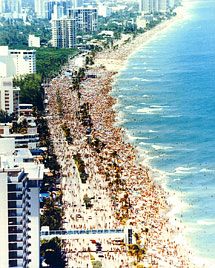 | | 4 Million Spectators Eye Air & Sea Show |
The Air & Sea Show was originally arranged as a self-sustaining event. In 1999, the city offered to provide certain services on the cuff. Since then, the City finances experienced a train wreck. At the contract renewal negotiations, Commissioners made clear that the City�s gesture of support made when Fort Lauderdale was fiscally healthy needed rethinking. The show is a cash cow for its promoters, MDM Group Ltd. and subsidiary Pro Series Inc., bringing in millions every year. Senior sponsor McDonald�s shells out $2.5 million each year for Title sponsorship alone. TV revenues, promotional sales and enormous corporate financial support (40 + corporate sponsors) all inure to the promoters� bottom line. When the City tried to propose a return to the Show supporting itself, Mickey D. Markoff (Executive Producer, McDonald�s National Salute to the U.S. Military) of MDM Group and Johnny Williams, Esq. (Executive Director, Air & Sea Show) of Pro Series Inc. slammed the door. The promoters not only refused to open their books to the City, they threatened to sue if the City didn�t continue the gratis services. At a time when Fort Lauderdale�s budget is hemorrhaging, services are being cut back and layoffs are circling above employees� heads like vultures, the promoters feel it appropriate to force the residents of Fort Lauderdale to foot the bill for their �free� show.
 The formula works like this. The City will provide $458,571 in Fire-Rescue, Public Services, Parks & Recreation and Police Services to the Air-Sea Show for which the promoters will reimburse the city $171,039. Parking revenues of $43,634 will lessen the bloodletting. The rest, $243,898, will be picked up by the City and the Community. Not exactly a free show. Commissioner Teel hopes to renegotiate this one-sided arrangement and roll back the clock to when the Show paid its own way. The promoters� attitude isn�t enigmatic. Why would they want to strangle the city that nourished their golden goose for the past decade? Evidently, it�s because they can. Commissioner Teel requested that residents contact the City Commissioners in support of renegotiating the City�s contract with the promoters. The formula works like this. The City will provide $458,571 in Fire-Rescue, Public Services, Parks & Recreation and Police Services to the Air-Sea Show for which the promoters will reimburse the city $171,039. Parking revenues of $43,634 will lessen the bloodletting. The rest, $243,898, will be picked up by the City and the Community. Not exactly a free show. Commissioner Teel hopes to renegotiate this one-sided arrangement and roll back the clock to when the Show paid its own way. The promoters� attitude isn�t enigmatic. Why would they want to strangle the city that nourished their golden goose for the past decade? Evidently, it�s because they can. Commissioner Teel requested that residents contact the City Commissioners in support of renegotiating the City�s contract with the promoters.
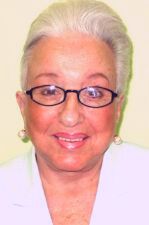 | OCEAN CLUB PRESIDENT
ROSE GUTTMAN |
Commissioner Teel also addressed one of the neighborhood�s danger zones. GMCA President Robert Rozema has bitterly complained for years about the intersection of Galt Ocean Drive and A1A one block north of Oakland Park Boulevard. The southbound traffic light at A1A and 32nd Street, designed to allow the traffic from Galt Ocean Drive to access southbound A1A, is regularly ignored by drivers. The latest accident victim of this traffic hazard is Galt Mile Community Association Director and Ocean Club President Rose Guttman. At the June 14th City Commission meeting, Commissioner Teel asked Peter Partington to look into some permanent improvement that would lessen the attendant danger. The Commission discussed several options, ranging from increasing the auxiliary signage to installing a highly noticeable cyclops style traffic light. The problem will require attention on the State level, as A1A falls under the dominion of the Florida Department of Transportation (FDOT). The irrepressible Ms. Guttman took matters into her own hands, enlisting Florida State Senator Jeffrey Atwater�s assistance to correct the ineffective traffic signal.
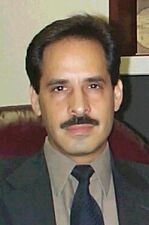 | GMCA PRESIDENTS COUNCIL
CHAIR PIO IERACI |
Commissioner Teel, responding to a recurring concern of the Galt Mile Community Association, explained the City�s continued neglect of the Galt Ocean Mile as a ramification of Fort Lauderdale�s budget woes. After assessing Galt Mile residents to fund the extremely successful neighborhood rehabilitation project known as �A Smile on the Mile�, Fort Lauderdale committed to maintain the resident-financed project in a �Disney-like fashion�, alluding to the impeccable maintenance at the famous Kissimmee resort. The pink aggregate sidewalks that line the street have been repeatedly marred by FP&L, Comcast, AT&T, BellSouth and assorted developers despite the contractual promise to return the excavated areas to their original condition. Contractors have offered paper thin explanations such as �we couldn't find any pink aggregate� by way of excuse.  | CHAIRMAN PIO IERACI'S PLAN TO
FIX THE FOLIAGE ON THE GALT |
Galt Mile Presidents Council Chair Pio Ieraci drew Commissioner Teel�s attention to another example of the City�s non-compliance with their maintenance obligation; the severe deterioration of the landscaping for which we paid. In the spirit of cooperation, Mr. Ieraci offered a solution that would compensate for the City�s current inability to finance the landscaping improvements needed to enhance the block�s appearance. He suggested that green-thumbed resident volunteers be allowed to contribute their efforts to freshen up the wilted foliage in the swales and the mini-parks along the street. The project would be organized by the Association. Resident manpower would be recruited to carry out the �Urban Forester�s� directions. The Community would provide the resources while the City contributed the technical guidance. Pio Ieraci asked Commissioner Teel if City Hall would permit this ad hoc alliance to temporarily fulfill the City�s maintenance commitment to the Galt Mile. Proclaiming Mr. Ieraci�s suggestion as �an excellent idea that should warrant the appreciation of the City Commission�, she agreed to attempt securing permission to actualize this volunteer effort.
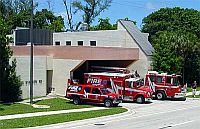 | | FIRE-RESCUE STATION 13 |
Commissioner Teel has proven repeatedly that she is a tireless supporter of the Galt Mile, working incessantly to further neighborhood improvements and community services. Despite the tenuous disposition of Station 13, which is subject to intermittent �dropped shifts� resulting from Fire-Rescue�s budgetary constraints, the Medical Transport has not missed one shift. The Commissioner imparted, �Every day I call (Fort Lauderdale Fire) Chief Otis Latin to verify that Transport 13 is in service�. That telephone call is most likely the main reason that the Chief�s daily response is, �Yes�. Generally, the first sensation experienced after hearing an ambulance siren isn�t gratitude, however, Commissioner Teel�s persistence merits an exception. Thanks...
Click Here to access the Fort Lauderdale City Commission web site. If you would like to send an email to the Commissioners and the Mayor advising them to renegotiate the Air & Sea Show contract, Click Here! To email Commissioner Christine Teel, Click Here. To send a letter to the Mayor and/or the Commissioners, post it to City Hall, 100 North Andrews Avenue, Fort Lauderdale, FL 33301; or phone: (954) 828-5003/5004.
 Click Here to read Commissioner Teel�s July 1st Newsletter. To read Commissioner Teel�s current Newsletter, Click Here! Click Here to read Commissioner Teel�s July 1st Newsletter. To read Commissioner Teel�s current Newsletter, Click Here!
Click To Top of Page
 Uncivil War Uncivil War 
  
Broward vs. Municipalities

 A Civil War is brewing between Broward County and the cities contained in its borders. The battle is over the use of land. The issue is ostensibly about development. The State of Florida is looming in the background like Odin; waiting patiently as he watches his powerful children scheme and fight over the domain that he ultimately holds sway over. A Civil War is brewing between Broward County and the cities contained in its borders. The battle is over the use of land. The issue is ostensibly about development. The State of Florida is looming in the background like Odin; waiting patiently as he watches his powerful children scheme and fight over the domain that he ultimately holds sway over.
During the past few years, Broward County has been maneuvering to exert final approval over development decisions that historically have been the dominion of its municipalities. As the last remaining pieces of Broward County become annexed into various municipalities, County officials need to find other ways to exert authority over their once significant domain. County Commissioners have quietly developed political alignments with advocates of controlled growth and environmentalists as part of an effort to consolidate a significant alliance before revealing the true scope of their ambitions.
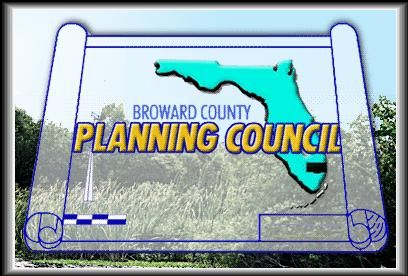 The State of Florida has mandated that Broward County prepare a Master Plan to organize and present county intentions for the next seven years. The centerpiece of this plan is proportional development for land use, insuring that the growth of the County�s cities doesn�t outstrip their ability to deliver the increased services that development demands. Strains on the area�s schools, unplanned for traffic increases, emergency response preparation and adverse environmental impacts have ambushed residents repeatedly throughout the county in the past few years. Recent municipal elections in Fort Lauderdale swept commissioners perceived to be �pro-development� out of office; replacing them with candidates whose major campaign commitment was to control municipal growth. The State of Florida has mandated that Broward County prepare a Master Plan to organize and present county intentions for the next seven years. The centerpiece of this plan is proportional development for land use, insuring that the growth of the County�s cities doesn�t outstrip their ability to deliver the increased services that development demands. Strains on the area�s schools, unplanned for traffic increases, emergency response preparation and adverse environmental impacts have ambushed residents repeatedly throughout the county in the past few years. Recent municipal elections in Fort Lauderdale swept commissioners perceived to be �pro-development� out of office; replacing them with candidates whose major campaign commitment was to control municipal growth.
The Broward County Charter underwrites the County�s ultimate authority over all decisions involving land use, in or out of its municipalities. On February 19th, the Broward County Planning Council further empowered County Commissioners by authorizing the development of new land use regulations that will squarely relocate control of municipal and other development to the County Commission. If the County receives the blessing of the State, local planners will spell out the details to which all development, municipal or otherwise, will be subject. In the Broward County Board of County Commissioners Redevelopment Initiative, it states that �Broward County acknowledges that municipalities will continue to lead in initiating, planning and managing redevelopment including approving development plans, site plans, zoning petitions, providing local infrastructure, etc.� When a controversy arising from the plans for the Swimming Hall of Fame in Pompano Beach elicited the County�s disapproval because it overburdened the Barrier Island, Broward changed its mind! The cities are not pleased.
 | | BROWARD MUNICIPALITIES BAND AGAINST COUNTY |
Fort Lauderdale, Hallandale Beach, Hollywood, Miramar, Pompano Beach, Davie and Weston have formed a coalition to block Broward County from this unprecedented attempt to wrest control of the cities� growth from municipal leaders. The coalition is being advised by Attorney David Orshefsky, a specialist in the area of land use. While local Mayors and City Commissioners claim that they agree with the tenets of controlled growth, the divestiture of the final say over that growth within their borders represents a serious threat to home rule and self-determination. Cities stand to lose an important component to their ability to shape their own destinies.
The County also intends to directly control all land use changes on the Barrier Island, requiring that a demonstration of how the changes affect the surrounding area be submitted to the County for review and approval prior to advancement. Control of development from the Intracoastal Waterway to the beach is the prize that both sides are competing for and the main focus of this struggle. Development on the Barrier Island, because of its physical and geographical limitations, presents a greater challenge than elsewhere in the county when trying to match increased services to the exploding number of new residents. Aside from encouraging the use of public transportation, little can be done to relieve increased traffic or enhance overburdened emergency evacuation systems. The County intends to eliminate the cities� deployment of special land use designations on the beach. These allow a combination of homes and businesses to be considered as a single development in a way that permits the erection of high-rises where they are normally prohibited.
The State, waiting in the wings for Broward to present the details of its Master Plan, is carefully weighing its options. They want to approve a final product that elicits the most palpable voter support. State representatives are walking a tightrope between being counted in the popular �controlled growth� camp while remaining clearly in favor of self-determination and home rule. They also must contend with the long-term pitfalls projected for Broward County. 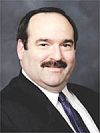 | | Senator Steven Geller |
Population growth is anticipated to jump from the current 1.6 million to 2.5 million residents by 2030. According to the Broward County Office of Urban Planning & Redevelopment Planning Services Division's �Accommodating Population Growth in Broward County, 2000 to 2030�, �Existing vacant land is insufficient to sustain the anticipated population growth. All vacant residential land in Broward County will be absorbed before 2030: Build out conditions will be reached by 2015 for single family and by 2010 for multi-family units.� The County�s regulations will attempt to redirect growth to areas more easily accessible to public services and schools, where new roads can relieve traffic impacts, and where the environmental pressures can be mitigated. The State, however, will not tolerate the balance of power slipping too heavily from one side to the other. State legislators like Senator Steven Geller of Hollywood, are waiting to be summoned by the Cities coalition to advance their case.
While the issues of controlled growth, long term planning, home rule and self-determination are central to this struggle, it would be naive to ignore the political perks that accrue to the winners. The ultimate jurisdictional land use authority will have uncontested access to the sizable bankrolls that developers and their lobbyists disburse to mollify any potential obstacles and align support for their projects. Those on the winning side stand to be wined, dined and have their campaign coffers fattened as the cost of doing business.
Those are the players and that is the scorecard. All sides have substantial support from heavyweight vested and political interests. The roles being played by many of the participants are unusual given their histories. Broward County's role as the �controlled growth� watchdog is inconsistent with the part it played in the construction of Weston, the creation of the Sawgrass Expressway and the expansion of the airport. For decades, County Commissioners have gratefully welcomed contributions from developers as they presided over the massive Broward building boom. These same Commissioners are now allied with environmentalists that they faced on the other side of the table while expanding the airport.
 | | Mayor Naugle |
 | | Dean Trantalis |
Fort Lauderdale Mayor Jim Naugle, long on the losing side of countless 3-2 decisions promoting high-rise construction projects, occupies an unusual, albeit not unique, niche. While he has historically supported controlled growth, he stands adamantly opposed to the County�s bid to institute top-down regulations designed to slow development. He exhorts that the County�s jurisdictional infringement is unnecessary in view of the recent election results wherein Fort Lauderdale voters changed the complexion of the City Commission to reflect a �controlled development� majority. Dean Trantalis, one of the Fort Lauderdale City Commissioners elected last year on this �controlled development� platform, agrees with Mayor Naugle's assessment; �I can point to bad examples of planning in my city, but at the same time, the county should be shamed for some of its decisions, we all have a checkered past.�  | | Mayor Giulianti |
Hollywood Mayor Mara Giulianti also objects to the County's intentions, �They are treating us like toddlers unable to take steps without being held up by the county.� Weston Mayor Eric Hersh agrees, �We know our cities better than the County Commission does.�
The County�s opening volley in this nascent conflict heralds the beginning of a two year struggle that will see the weighing in of a broad spectrum of interests and the creation of strange political bedfellows as they line up to take sides. Galt Ocean Mile is situated on ground zero of the Barrier Island battlefield. We, as usual, will watch.
Click Here to access the current Advanced Agenda for the next Public Hearing conducted by the Broward County Planning Council. Information relative to these hearings may be obtained at the Broward County Planning Council office: Room 307, Government Center, 115 South Andrews Avenue, Fort Lauderdale, Florida 33301; Phone: (954) 357-6695, Fax: (954) 357-6685.
Click To Top of Page
Shifting  Battlefields Battlefields 
Gov to Clean Up the Mess

 The struggle for control of development in Broward County has grown into a full blown war between the Cities within the County and the Broward County Commission (See article above, �Uncivil War�. The battlefield is on the move. It was originally in Government Center, the seat of Broward County government, located at 115 South Andrews Avenue in downtown Fort Lauderdale. This is where the Broward County Commission decided to launch a two-year sneak attack on the Land Use authority historically exercised by municipal governments throughout the County. Quietly, the County aligned a significant coalition of anti-development forces to achieve its ultimate objective of complete and singular control over growth in Broward. This eclectic alliance of environmental groups, �controlled development� interests and County Commissioners contrived a blatant power grab designed to put the County Commission in the toll gate for any developer entertaining aspirations of building anything in the County. Whosoever decides land use also controls development and concomitantly, the size and composition of the tax rolls for the area...any area. In addition, developer dollars can make election campaigns a much more pleasant experience. The struggle for control of development in Broward County has grown into a full blown war between the Cities within the County and the Broward County Commission (See article above, �Uncivil War�. The battlefield is on the move. It was originally in Government Center, the seat of Broward County government, located at 115 South Andrews Avenue in downtown Fort Lauderdale. This is where the Broward County Commission decided to launch a two-year sneak attack on the Land Use authority historically exercised by municipal governments throughout the County. Quietly, the County aligned a significant coalition of anti-development forces to achieve its ultimate objective of complete and singular control over growth in Broward. This eclectic alliance of environmental groups, �controlled development� interests and County Commissioners contrived a blatant power grab designed to put the County Commission in the toll gate for any developer entertaining aspirations of building anything in the County. Whosoever decides land use also controls development and concomitantly, the size and composition of the tax rolls for the area...any area. In addition, developer dollars can make election campaigns a much more pleasant experience.
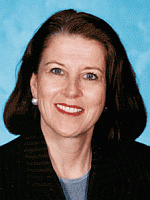 | | Broward Mayor Ilene Lieberman |
Although the Broward County Charter underwrites the Commission�s authority to control development, the Commissioners in turn empowered the cities with self-determination by writing into the County Commission�s Redevelopment Initiative that, �Broward County acknowledges that municipalities will continue to lead in initiating, planning and managing redevelopment including approving development plans, site plans, zoning petitions, providing local infrastructure, etc.� OOPs! This understanding has long and deep roots. The Cities, when confronted with Broward�s true agenda, got mad...real mad. Painting Broward�s intentions as hypocritical, the Cities pointed to the �Blacktopping of West Broward� as an example of Broward County�s land stewardship. The municipalities coalesced to fend off the common threat. County officials broadcast mixed signals regarding their disposition to an �agreement� with the cities. While Broward Mayor Ilene Lieberman agreed to talk to city officials, Broward County Commissioners John Rodstrom and Lori Nance Parrish remained intransigent�adopting a hard line. After several months of sending out diplomatic feelers to the County in hopes of arriving at a compromise, the cities finally realized that Broward had no desire to find common ground...opting instead for uncontested control. �The door was shut in our face and the line was drawn in the sand,� commented Mayor Joy Cooper of Hallandale Beach. In response to this stonewalling by the County, the cities decided to move the battlefield north.
 | | Senator Bennett |
State Senator Steven Geller of Hallandale Beach, an attorney whose practice represents substantial development interests, offered the cities a weapon of mass distraction... legislation. The battlefield is now in Tallahassee. The Florida Capitol is currently awash with City and County lobbyists, like so many flakes of dandruff on Governor Jeb Bush's shoulders. Senator Geller enlisted Senator Michael Bennett (R-Bradenton) to sponsor Senate Bill 2956, which cleanly eviscerates Broward�s control over municipal land use and relocates it to the cities. The Senate Comprehensive Planning Committee, a review stop for the legislation that Senator Geller happens to Chair, approved the bill on March 29th by a 5 YEAS vs. 1 NAY vote. Committee member Senator Skip Campbell (D-Coral Springs) impugned County motives while addressing the Committee during the Bill�s consideration, stating that �County commissioners have figured out there is not a lot to do as a county commissioner without development�.
 | | Representative Smith |
Broward County lobbyist David Ericks responded to the threat from the Senate, warning that �This fight is far from over�. County Commissioners, pledging to fund as many lobbyists as deemed necessary to foil the legislation, ironically stated that they would win this battle in the Statehouse where there was no companion bill for Bennett�s SB 2956. State Representative Chris Smith (D-Fort Lauderdale) picked up the gauntlet for the cities, asserting that �Cities should control their own destiny, not some massive, monstrous county government.� The next day, March 30th, Smith amended a bill pertaining to local government sponsored by Representative Gustavo Barreiro (R-Miami Beach), House Bill 143, adding the appropriate language. HB 143 had already passed the House Subcommittee on Local Affairs, the House Local Government & Veterans� Affairs Committee and the House Judiciary Committee when Smith modified it to include Amendment 626939 prior to being passed by the House. Woof!
 | | Comm. Rodstrom |
Broward County was playing several cards simultaneously. Rodstrom and Parrish lobbed a grenade at the cities just prior to Geller�s move. Imitating a tactic used in Miami Beach, they threatened a public referendum to subvert the impending legislation. By arranging a $2 million special election in which voters would decide whether or not they want veto power over any project that increases a neighborhood�s population beyond existing land-use restrictions, the County hoped to once again move the battlefield. County Commissioner Rodstrom, in an effort to justify this �mutually assured destruction�, said �We have the power of the voters, and they have a much different perspective on development than the cities do. We need to harness that power.� 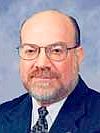 | | Sunrise Mayor Feren |
By eliciting a �victory� in this manner, the County could challenge Tallahassee to �defy the will of the people�, an intimidating prospect. If successful, neither the County nor the Cities could exercise dominion over development. The decision as to where the 900,000 new Broward County residents expected by the year 2030 can live would be made through a herky-jerky series of elections, the outcomes dependent upon the success or failure of various developers� marketing campaigns. Repudiating the County�s �scorched earth� tactic, Sunrise Mayor Steve Feren (currently president of the Broward League of Cities) exclaimed, �We've been trying to work something out for the past year, while they are willing to spend hundreds of thousands of dollars to fight the bill and even more money to have a special election if that doesn�t work. It�s akin to a bunch of 6-year-olds standing on a school playground saying, �It's my ball and we�ll play by my rules or I�ll take the ball and go home�.�
A more reasonable response available to the County is to concentrate their 22 Tallahassee lobbyists� persuasive efforts on Governor Jeb Bush. The legislation requires the Governor�s signature to become law. Broward County lobbyist Mack Stipanovich, a Republican stalwart, is pleading with the Governor to quash the Bills. He�s exhorted that the proper format for the cities to wrest control from the County is through amendment to the Broward County Charter. City officials point out the catch-22 nature of Stipanovich�s recommendation. Prior to surviving a County-wide vote, the issue must first be placed on the ballot in one of three ways, all of which are problematic. It requires placement by 1) the adversarial and uncooperative County Commission, 2) the Charter Review Committee which is appointed by the County Commission or 3) a petition including the signatures of 10% of the Broward County electorate, about 100,000 signatures. Fat chance!
In an unusual twist of events, on April 7th the Fort Lauderdale City Commission passed new development rules for the beach. The County has continuously contended that the key issue motivating their campaign to control development is imposition of strict limits on construction taking place between the Intracoastal Waterway and the Ocean, the Barrier Island. Despite threats by an attorney representing a developer with a project at stake, the new regulation that reduces the height and density allowed in the beach area by 20 percent zipped through the Commission. By approving these zoning rules, the City undercut the the County's rationale for manuevering to usurp land use controls from the cities.
A confusing component of these developments is Broward�s unshakable refusal to compromise. They have been invited to share the land use controls that they are on the verge of losing. Senator Geller expressed his aspiration that the County would come to the table when he filed his bill. They didn�t. He then presumed that they would negotiate when it passed. They won�t. Even if Broward can convince the Governor to delay any action and freeze the legislation�s progress until after a special election in which the voters perform as envisioned by the County, critical decisions about development would pass from the County and the Cities to the county electorate. The questionable benefit of placing decisions about the growth of Fort Lauderdale and Hollywood into the hands of county residents that don�t live there is daunting. Concomitantly, it�s difficult to comprehend the value of asking the residents of Galt Ocean Mile or Coral Springs if they approve of a shopping mall planned for Davie or a library in Plantation.
This policy of extreme brinksmanship seems to hold little benefit for the County. Given the hailstorm of statutory baggage that the Governor has to sift through during the legislative session, he certainly didn�t need this unsavory mess plunked on his doorstep. As it stands, he now confronts his �worst case scenario�, having to walk a political tightrope between �home rule� and �controlled development�. The only way that Governor Bush can close his eyes and send this dilemma to the cornfield is to drag Broward County to the table, kicking and screaming if necessary. Don�t be surprised if the Governor harbors a grudge against us as a result of all this. After all, we elected them!
 Click Here to access the Broward County Commission web page. County Commission Headquarters is located at Governmental Center, 115 South Andrews Avenue (Room 421), Fort Lauderdale, FL 33301 - Telephone: 954-357-7000. Click Here to access the Broward County Commission web page. County Commission Headquarters is located at Governmental Center, 115 South Andrews Avenue (Room 421), Fort Lauderdale, FL 33301 - Telephone: 954-357-7000.
Update: Another Shift  
Broward Contemplates Shooting off Foot 

 In the political �Chutes and Ladders� contest with which the Cities and the County have occupied their time, two new twists have altered the picture. One expected and one surprise. Governor Bush, placed in an awkward situation by legislation passed to empower the cities, said that he would veto any disembowelment of Broward's Land Use controls. Broward County decided that a "special election" to head off the effects of the legislation was too expensive. Instead, they are considering a referendum that would ask voters whether they want direct control over Broward County development. Slow-growth advocates and environmentalists have teamed up with Commissioners John Rodstrom and Lori Parrish, the primary backers of the referendum, to try to take advantage of the impasse with the cities and Jeb Bush's big foot in the door. Commissioner Rodstrom (a Citibank employee who was working on a Bond offering for Miami Airport at the same time he was voting on the efficacy of expanding the rival Fort Lauderdale/Hollywood Airport) surprisingly exclaimed, �This is a quality of life issue whose time has come.� Huh? In the political �Chutes and Ladders� contest with which the Cities and the County have occupied their time, two new twists have altered the picture. One expected and one surprise. Governor Bush, placed in an awkward situation by legislation passed to empower the cities, said that he would veto any disembowelment of Broward's Land Use controls. Broward County decided that a "special election" to head off the effects of the legislation was too expensive. Instead, they are considering a referendum that would ask voters whether they want direct control over Broward County development. Slow-growth advocates and environmentalists have teamed up with Commissioners John Rodstrom and Lori Parrish, the primary backers of the referendum, to try to take advantage of the impasse with the cities and Jeb Bush's big foot in the door. Commissioner Rodstrom (a Citibank employee who was working on a Bond offering for Miami Airport at the same time he was voting on the efficacy of expanding the rival Fort Lauderdale/Hollywood Airport) surprisingly exclaimed, �This is a quality of life issue whose time has come.� Huh?
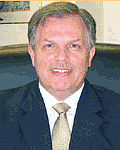 | | Commissioner Ben Graber |
At an April 8th County Commission meeting, Commissioner Ben Graber unexpectedly disclaimed the need for a referendum, �The point of government is to have checks and balances, and the current system works. The sudden move by the cities to upset that balance deserves a response, but this is not the right response.� The voice of sanity. He was joined by Mayor Ilene Lieberman and Commissioners Kristin Jacobs (Vice Mayor) and Diana Wasserman-Rubin in questioning the �benefit� of politicizing developmental controls. Relegating the decision-making �power to the people� is only an asset if those that are receiving the power are the same people affected by the decisions. This referendum would confiscate control from an area's indigenous population and transfer it equally to every resident in Broward County. The residents of west Broward, aside from its effect on travel time expended to get to the beach, have little at stake when deciding Fort Lauderdale's future...and vise versa. Should the slow growth proponents gain unquestioned control over development in all of Broward, the desultory effect on the tax base would skyrocket everyone's tax bill. Growth, an unmentionable of late, expands the tax base of the community wherein it flourishes. As cost of living expenses increase, with no offsetting outside income from additional development, every Broward resident's tax bill will comparably increase...every year! This is not good. The initial impetus for the County to sponsor a referendum was the impending legislation that would have cut them out of the �growth� loop. Now that the Governor has assured the County of its role in controlling development, the reasonable Commissioners sitting on the County Board are intelligently distancing themselves from this �scorched earth� referendum. It appears as if there might be a ray of hope for the residents of the county; to actualize this self-destructive referendum, six of the nine County Commissioners have to authorize it. You do the math.
Click To Top of Page
�Mayor� Kristin D. Jacobs
  
New Broward Captain

 | | MAYOR KRISTIN D. JACOBS |
November 15, 2004 - The Broward County Commission is on the verge of being recomplected. Each year, a different Commissioner assumes the mantle of Mayor. The interests and issues important to the new Mayor become key factors in County politics. This year, the top spot is passing from District 1�s Ilene Lieberman to Kristin D. Jacobs, the Commissioner from District 2. The issue at the core of Kristin Jacobs� political persona is the environment. Of the 5 topics that cover the �accomplishments� noted on her Broward County web page, only one (the living wage) is not squarely an environmental issue. Environmentalists in Broward County have distilled their assorted objectives into one salient issue - development. The lynchpin of Ms. Jacobs� plan for Broward is the redevelopment of east Broward - anticipating that if the �population infill� experienced by the overdeveloped coastal regions can be offset by the careful rebalancing of resources - central and west Broward will follow suit.
Kristin Jacobs fits the current �anti-development� trend like a glove. �Controlled development� has become a �make or break� political platform in municipal races throughout the County for the past three years. In Fort Lauderdale, Commissioner Christine Teel defeated incumbent Gloria Katz after waging a single-issue anti-development campaign. Likewise, Vice Mayor Dean Trantalis gained a Commission seat by pledging a tough stance on growth.
 | | Governor Jeb Bush and Kristin Jacobs |
Earlier this year, the County went to war with its municipalities over the control of Land Use within city boundaries. In a strange turnabout, the Broward County Commission - after years of supporting unrestricted and often chaotic growth in west Broward, Weston, the Sawgrass Expressway and airport expansion - maneuvered to reinvent itself as a champion of controlled development. Commissioner John Rodstrom (who never met a development that he didn�t like) and former Commissioner Lori Parrish (who worked for the Swap Shop, a prime example of �twilight zone� development) were suddenly holding hands with environmentalists who, one year earlier, faced them across the table over airport expansion. From a historical perspective, the Commission�s relationship with its new environmental bedfellows is an ironic, almost sarcastic, alliance of accommodation. It wasn�t lost on suspicious county-watchers that control of Land Use, especially on the Barrier Island, would also control the spigot from which property taxes, campaign dollars and a Santa-sized bag of perks flowed. While Rodstrom and Parrish donned their new environmental hats and adopted a scorched earth policy over sharing power with the cities, Kristin Jacobs joined with Ilene Lieberman and Ben Graber to steer the Broward Commission to a more reasonable moderate stance. What little credibility the Commission enjoyed as stewards of the environment derived primarily from Kristin Jacobs. Following a failed attempt at the Mayor�s seat three years ago due to a Commission feud, it�s now her turn to step up to the plate.
 | | JACOBS NATURESCAPING |
Pointing to the entropic growth suffered by her native Southern California as a negative example, Jacobs regards the redevelopment of Eastern Broward as the first step to achieving a balance between resources and growth. Her roadmap to a harmonious equilibrium in Broward County aspires to �village-like, pedestrian-oriented developments with plenty of green space nearby,� a sustainable environment she calls, �Smart Growth.� Jacobs contends that current policy encourages �separate land uses, such as stand-alone business parks, residential subdivisions and shopping malls separated from one another by excessively wide streets and highways.� Central to �Smart Growth� is the prodigious application of �Mixed Use� zoning designations to encourage �the mixing or combining of land uses to reduce our dependency on the automobile and increase our sense of community.� Jacobs explains, �Mixed use is achieved by placing housing, civic spaces, shopping & dining, employment centers, schools, and recreational land uses closer to each other and in walking distance of public transit, greenways, and pedestrian malls.�
Jacobs was a major supporter of Broward�s $400 Million Safe Parks and Land Preservation Bond Referendum, passed on November 7, 2000, that helped reclaim approximately 1,425 acres of natural lands and open space. It also hiked wages paid by contractors, repaired and enhanced Broward�s aging parks and imposed restrictions on new development. Commissioner Jacobs� 1998 campaign platform contained a �Greenways� plank - a pledge to formulate and implement a Greenway and Trail system for Broward County. Jacobs describes Greenways as, �a network of improved pathways and trails linking our neighborhoods, parks, cultural and historic buildings, waterways and even businesses and schools.� The system is component to a formidable statewide operation run by Florida�s Office of Greenways and Trails in an effort to link natural areas and open spaces, conserve native landscapes and ecosystems and offer recreational opportunities across the state.
Jacobs intends to create a functional compromise with the County�s Cities over Land Use governance. During the recent legislative session, a bill sponsored by Hollywood Senator Steven Geller that eviscerated Broward�s claim to ultimate control over Land Use within its cities� borders nearly became law. Governor Jeb Bush, caught between the popular �controlled development� espoused by the County and cries of �Home Rule� from the cities, opted for a compromise as opposed to a clear victory by one side or the other. As such, he nuked the legislation with a veto threat and sent both sides back to their respective corners. The current stand-off between the County and a coalition of municipalities should provide Mayor Jacobs with the opportunity to make peace and share control over development with City officials. This should integrate harmoniously with the VisionBROWARD project assembled by community leaders. The plan balances transportation, schools, housing, economic development and public services with Broward�s exploding population.
Expanding the NatureScape Program is another cornerstone of Jacobs� vision. She intends to �create and certify NatureScape sanctuaries throughout Broward County.� NatureScape envisions natural indigenous ecosystems of all sizes proliferating in backyards, schoolyards, workplaces and communities. Immediate goals include 1) increasing the propagation and use of native plants by 50%. 2) Be a role model for the State of Florida for compliance with xeriscape statutes and 3) Become a nationally recognized program of environmental stewardship. One of NatureScape�s benefits is that once it attains a �critical mass�, it could help with Broward�s water conservation dilemma - naturally and inexpensively. Jacobs also plans on building a nature center bordering the Everglades.
Kristin D. Jacobs� credentials are impeccable. She participates in a wide spectrum of Associations, Boards and Clubs. Jacobs serves on the South Florida Water Management District�s Water Resource Advisory Committee, Florida Regional Council�s Association, Metropolitan Planning Organization, Water Advisory Board, Resource Recovery Board, Homeless Initiative Partnership, EV (Electric Vehicle) Ready Broward, Broward League of Women Voters, Broward Urban River Trails, Pompano Proud, Greater Deerfield Beach Chamber of Commerce, Coconut Creek Democratic Club, Deerfield Beach Democratic Club, Margate Democratic Club, North Broward Democratic Club � Life Member, Sample-McDougald House Preservation Society and the PTA - Pompano Beach Elementary, Pompano Beach High.
Jacobs Chairs the Community Bus Application & Evaluation Committee and Chaired the South Florida Regional Planning Council in 2001. She currently serves as a Director on the Florida Association of Counties, the Broward League of Cities, Women In Distress, the Greater Pompano Beach Chamber of Commerce, the Deerfield Beach Historical Society and the Greater Fort Lauderdale Chamber - Uptown Business Council.
The �Elected Official of the Year�, �Feminist of the Year�, �Woman of the Year�, �Humanitarian of the Year�, �Environmentalist of the Year�, �Government Official of the Year� and �Trailblazer of the Year� awards earned by Jacobs from an impressive assortment of prestigious Associations is too numerous to list. An accurate perspective of Jacobs� priorities is embodied in the opening statement on her Broward web page. She documents a quote from Vice President Hubert Humphrey, �The moral test of Government is how it treats those who are in the dawn of life - - the children; those who are in the twilight of life - - the aged; and those who are in the shadows of life - - the sick, the needy and the handicapped.� The �Year of the Environment�, as she characterizes her upcoming stint as the Mayor of Broward County, could be a productive one. We�ll see.
Click To Top of Page

Commission Collision
  
A Contest for Broward�s Future

 | | Vice Mayor Ben Graber |
November 17, 2004 - As District 2 Broward County Commissioner Kristin D. Jacobs prepares to take the reins of County Government from Ilene Lieberman, county residents are curious to see how Jacobs� proclaimed �Year of the Environment� will impact on their lives. The only credentialed environmentalist on the County Board, her intention to balance development with resources is music to the ears of �controlled development� proponents. Despite the fact that nervous Broward developers are biting their political nails, Ms. Jacobs had no real opposition to her assumption of the Mayoralty. The transition was smooth and painless.
 | | COMMISSIONER JIM SCOTT |
Strangely enough, there was a real battle underway for the Vice Mayor�s seat - below the radar. Broward County Commissioners Jim Scott and Ben Graber were locked in a struggle for the right to be �next in line� for Kristin Jacobs� Vice Mayor position when she stepped up. The Vice Mayor will most likely follow in Ms. Jacobs� footsteps and subsequently become Mayor in 2006. Both Scott and Graber had significant designs on being the 2006 County captain. Both Commissioners also faced serious obstacles. Neither of the combatants could rely upon Jacobs� support for their bids. She didn�t want to risk a distraction from her core concerns through involvement in a messy political conflict. Ultimately, however, she changed her mind.
 | | MAYOR KRISTIN D. JACOBS |
On November 16th, Graber was named Vice-Mayor by a majority of the Broward County Commission. Jacobs, in a last minute show of support, joined Diana Wasserman-Rubin, Suzanne Gunzburger and Lois Wexler (who won Lori Parrish�s vacated District 5 seat) to install Graber as Jacob�s Vice-Mayor. The rotating Mayor and Vice-Mayor positions are determined by a formula that allows each Commissioner a term in the two top spots. Commenting on her decision to support Graber instead of Scott, Jacobs remarked, �It wasn�t his turn.�
 | | The Broward Board of County Commissioners |
District 4 Commissioner Jim Scott represents the Galt Mile on the Board of County Commissioners. A former president of the Florida Senate, Scott is the sole Republican on the Broward County Commission. His G.O.P. affiliation shaped up as both an asset and a liability. Broward County has historically been a Democratic stronghold. It has earned the Republican political designation as �the Killing Fields� � a reference to its reputation as a source of anxiety to statewide Republican candidates that generally suffer until the Broward vote has been accounted for and overcome. The Election Day disappointment suffered by Democrats stiffened the Party�s resolve against what might be considered another defeat - the Commission�s only Republican assuming the 2006 County Board�s top spot after 30 years of Democratic leadership. 2006 portends another political concern for both candidates. The County�s Mayor will play a substantial role in the election mechanics (i.e. election preparations and vote counting) that will be in place during Governor Bush�s 2006 re-election bid. In view of past Florida election inconsistencies, how the system is operated generally receives as much attention as the actual vote. Jitters about an inaccurate count posed an additional obstacle for Scott.
Notwithstanding qualms about his political predilections, while presiding over the Florida Senate from 1994 to 1996, Scott earned a solid reputation for bipartisanship, assigning Democrats to important posts. During his legislative career, he served as Minority Floor Leader (1978-80), Minority Leader (1980-82), Judiciary Committee Chairman (1982-84), Appropriations Committee Chairman (1986-88 and 1992-93), Chairman of Rules and Calendar (1989-90), Vice Chairman of Rules and Calendar (1993-94), President of the Florida Senate (1994-96), Chairman of Regulated Industries (1997-1998) and Banking and Insurance Chair (1998-2000).
 | Jim Scott & Lt Gov Toni Jennings
The Tallahassee Connection |
Although his initial inclusion into the Broward County Commission was as an appointee of Governor Bush to fill a Commission vacancy in December of 2000, Scott won the District 4 seat in November, 2002. As Broward�s District 4 County Commissioner, Scott has supported a living wage and affirmative action policies, ostensibly Democratic issues. In 1982, however, he cast the deciding vote against the �Equal Rights Amendment�, feeding the belief that Florida was �out of step� with modern attitudes while clinging to questionable prejudices. Prior to his distinguished 24-year Senate career (1976 � 2000), Scott served as an Associate Municipal Judge (1972) and then as a prosecutor (1973 � 1976) in Deerfield Beach. A member of the Florida, Kentucky, Broward County, Palm Beach County and American Bar Associations, he also represented the Broward County Legislative Delegation from 1972 to 1974.
 | | John Rodstrom |
Given the ensconced Republican monopoly in Tallahassee, Scott offered a comfort level with the legislature and an access to the Governor that the eight Democratic County Commissioners couldn�t match. Democratic Commissioner John Rodstrom stated, �I think given where we are and who the governor is, Jim is the best person and gives us an edge in the Legislature.� Rodstrom�s comment, however, is possibly colored by his stormy relationship with fellow Democrat Graber � Scott�s rival.
When Scott did the math after Jacob�s decision to support Graber�s candidacy, he withdrew from the race. Overtly disappointed, Scott remarked, �I was kind of taken aback that this was done over small things like party labels.� In view of Tallahassee�s chilly disposition to Broward�s Democrat-dominated County government, the Commission�s lone Republican has been doing most of the heavy lifting in the County�s dealings with the Capitol�s Republican monopoly.
A Coral Springs physician, Ben Graber helped shape Florida health care policy as a Democratic Statehouse Representative (1988 � 1996), ultimately becoming Deputy Majority Leader of the House. In Tallahassee, he chaired the Health Standards Subcommittee, the Joint Legislative Information Technology Resources Committee and the Health Care Committee while sponsoring the Enhancement of Development Disabilities Bill, the creation of the Elderly Affairs Department, the creation of the Clean Indoor Air Act, the Health Care Insurance Reform Act of 1993, the Tobacco Liability Act and the Managed Care Reform Act of 1996. A Pro-Choice Democrat with strong liberal credentials, Dr. Graber steadfastly endured pickets at his medical practice for consenting to perform legal abortions.
 | | Ilene Lieberman |
First elected to the Broward Commission from District 3 in 2000 and again (unopposed) this past Election Day, Graber has a reputation for airing disagreements with colleagues in the �court of public opinion.� This indiscretion has fomented antipathy among his peers. He has repeatedly criticized longtime purchasing and lobbying practices of his colleagues, and in doing so developed a reputation as a �loose cannon�. In turn, he has accused both Rodstrom and Lieberman of questionable ethics. While Graber insists that his reputation is undeserved, Ilene Lieberman disagrees. Commenting on Graber�s bid for Vice Mayor, Lieberman said, �The vice mayor needs to be a team player who understands the importance of being part of a collegial body,� intimating that Graber was therein ostensibly deficient.
There was a distinct possibility that the controversy surrounding the two top contenders for Vice Mayor might have served to eliminate both of them. That could have left the door open for Commissioner Suzanne Gunzburger, who had identified herself as a less controversial alternative. Despite having told colleagues he was not interested in becoming the Vice Mayor, Commissioner Josephus Eggelletion Jr. represented a fourth viable choice.
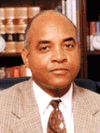 | | Josephus Eggelletion |
Ultimately, Scott nominated Eggelletion to the Vice-Mayor�s seat after his withdrawal from the contest. Lieberman and Rodstrom, whose antipathy to Graber is no secret, also threw their support behind Eggelletion. Despite his prior statement indicating his disinterest in becoming Vice-Mayor, Eggelletion represented a palliative to Broward�s black community. The County Commission recently killed a minority-owned Convention Center hotel project and spearheaded the challenge against the controversial former Elections Supervisor Miriam Oliphant, despite her popularity in the black community. The fact that minority-owned businesses were not receiving an equitable share of county contracts, according to a 2001 study, created continuing suspicion and animosity. Eggelletion would have been only the second black to occupy the Vice-Mayor�s office in Broward�s history.
 | LOIS WEXLER
A New Face |
Graber�s victorious supporters explained that both Scott and Eggelletion, who joined the Commission in 2000 with Graber, would get their respective turns as County chief. They simply saw no reason to interrupt the projected chain of succession. Despite this conciliatory rationale for their decision, Scott said he was �surprised that the commission didn't take the opportunity either to send a message of bipartisanship to Tallahassee or to acknowledge the growing diversity of Broward.�
In any event, it would best serve the citizens of Broward County if the Commission purges this residual animosity prior to the onset of Kristin Jacobs� �Year of the Environment�. If not, Jacobs� reign might be recast as the �Year of Nothing Happening�. Stranger things have happened.
Click To Top of Page
Flu Fix for  Fort Lauderdale Fort Lauderdale

 January 10, 2005 - This Flu season was cloaked in mystery. In the spirit of dispensing regular warnings for a variety of incipient dangers, Washington alerted the nation over the summer to an impending pernicious Flu season. Across he country, the annual November through March influenza gauntlet kills more than 36,000 and hospitalizes thousands more (114,000 last year). The Beltway declared that they would be ready - they would stockpile �enough vaccine to sink a ship.� Each year it has to be custom prepared to combat the strains of Flu that are expected to do the most damage. Influenza vaccine is touchy stuff. Influenza viruses for both the inactivated and live attenuated influenza vaccines are initially grown in embryonated hens� eggs. Thus, both vaccines might contain limited amounts of residual egg protein. Yum! January 10, 2005 - This Flu season was cloaked in mystery. In the spirit of dispensing regular warnings for a variety of incipient dangers, Washington alerted the nation over the summer to an impending pernicious Flu season. Across he country, the annual November through March influenza gauntlet kills more than 36,000 and hospitalizes thousands more (114,000 last year). The Beltway declared that they would be ready - they would stockpile �enough vaccine to sink a ship.� Each year it has to be custom prepared to combat the strains of Flu that are expected to do the most damage. Influenza vaccine is touchy stuff. Influenza viruses for both the inactivated and live attenuated influenza vaccines are initially grown in embryonated hens� eggs. Thus, both vaccines might contain limited amounts of residual egg protein. Yum!
Because a huge amount of vaccine is required for world-wide distribution and the formula varies every year, the manufacturing process is shared by pharmaceutical companies around the globe. In October, the nation lost about half of its expected supply of 100 million doses when British officials shut down a Chiron Corp. plant and suspended their license for three months due to possible contamination. Bad timing.
 Fortunately, the season so far has been fairly mild with the exception of New York and Vermont. As of Flu season week 52 (ending on January 1st), Florida rated a �green alert�, the Center for Disease Control (CDC) designation signifying sporadic outbreak. Dispensation of vaccines was planned for what were considered to be �high risk� groups. These include healthy children aged 6 to 35 months, adults aged 65 and older, children up to age 18 on long-term aspirin therapy, residents and employees of long-term-care facilities, pregnant women in their second or third trimester, care givers of infants under the age of 6 months, individuals with chronic health conditions such as heart or lung disease, asthma, diabetes, weakened immunity or cancer and household members of high-risk individuals. Fortunately, the season so far has been fairly mild with the exception of New York and Vermont. As of Flu season week 52 (ending on January 1st), Florida rated a �green alert�, the Center for Disease Control (CDC) designation signifying sporadic outbreak. Dispensation of vaccines was planned for what were considered to be �high risk� groups. These include healthy children aged 6 to 35 months, adults aged 65 and older, children up to age 18 on long-term aspirin therapy, residents and employees of long-term-care facilities, pregnant women in their second or third trimester, care givers of infants under the age of 6 months, individuals with chronic health conditions such as heart or lung disease, asthma, diabetes, weakened immunity or cancer and household members of high-risk individuals.
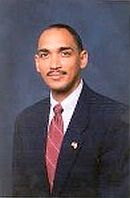 | | Secretary John O. Agwunobi |
On December 28, 2004, Florida Department of Health (DOH) Secretary John O. Agwunobi, M.D., M.B.A., M.P.H., announced that 60,000 doses of adult flu vaccine purchased from California had been received with additional shipments to the state anticipated on an ongoing basis. Stepping up to the challenge, Aventis Inc. whipped up additional flu shots to help offset the tainted British vaccines and boost the nation�s supply to 58 million doses. In January, Florida started receiving 200,000 vaccines for distribution to the 67 County Health Departments throughout the State, 40,000 earmarked for Broward and Palm Beach Counties. This wealth of new medication will allow people ages 50 through 65 to also be eligible for the vaccinations. Deputy administrator Jeffrey Keiser of the Broward County Health Department remarked, �I think the demand is still there. A lot of people held off getting a shot. I don�t see this vaccine just sitting here.�
To soften the adverse effects of the vaccine shortage, Medicare announced that it will pay for prescription drugs to treat those among its 40 million beneficiaries who catch the flu. With the exception of the 20% co-pay (ranging from $4 to $20), Medicare will pay for about 14 days� worth of one of four flu-fighting drugs: amantadine, rimantadine, oseltamivir (Tamiflu) and zanamivir (Relenza). Dr. William Rogers, a Medicare medical officer, explained, �We needed to do something to ameliorate the damage from the failure of this vaccine manufacturer.� This uncharacteristic benefit starts immediately and will extend through May 31, 2005. Despite the flu season being more than half over, the disease continues to represent a life-threatening danger.
 Any Medicare beneficiary 50 or older that postponed becoming vaccinated can now sidestep a most unpleasant experience at no cost. The Broward County Health Department start date for administering flu shots to high-risk individuals is Tuesday, January 11th, at Festival Marketplace, 2900 W. Sample Road, Pompano Beach. Additional flu clinics are planned throughout the rest of the season. To avoid long clinic wait times, appointment slips will be distributed at the beginning of the day. Medicare beneficiaries should bring proof of Medicare Part B coverage. Maxim will also provide free immunization to anyone covered by the following: Blue Cross Blue Shield of Florida, Avmed, Wellcare, Care Plus, Health First Health Plans, Quality Health Plan, United Healthcare, Aetna, and Preferred Care Partners. Proof of Insurance is required. All others not covered by the above plans may purchase their vaccinations through Maxim Health Systems for a cost of $20. Any Medicare beneficiary 50 or older that postponed becoming vaccinated can now sidestep a most unpleasant experience at no cost. The Broward County Health Department start date for administering flu shots to high-risk individuals is Tuesday, January 11th, at Festival Marketplace, 2900 W. Sample Road, Pompano Beach. Additional flu clinics are planned throughout the rest of the season. To avoid long clinic wait times, appointment slips will be distributed at the beginning of the day. Medicare beneficiaries should bring proof of Medicare Part B coverage. Maxim will also provide free immunization to anyone covered by the following: Blue Cross Blue Shield of Florida, Avmed, Wellcare, Care Plus, Health First Health Plans, Quality Health Plan, United Healthcare, Aetna, and Preferred Care Partners. Proof of Insurance is required. All others not covered by the above plans may purchase their vaccinations through Maxim Health Systems for a cost of $20.
 | | PAUL HUGHES HEALTH CENTER |
The Broward County Health Department South Regional Health Center is located at 4105 Pembroke Road, Hollywood, Fl 33060. The telephone number is (954) 985-4800. The Paul Hughes Health Center at 205 NW 6th Avenue, Pompano Beach, FL 33060 can be reached at (954) 788-6140. Broward County has a history of flip-flopping vis-�-vis their policy for conducting flu clinics. They waver between establishing direct public ministrations for vaccinations and recommending that residents consult their private physician. For current information, and to avoid the Broward County telecommunications nightmare, call the recorded hotline at (954) 713-3067.
 GALT MILE RESIDENTS - Flu shots are available at the Galt Ocean Village Medical Center located at 3298 NE 33rd Street - across the street from the Beach Community Center. Call (954) 568-6789 for information. GALT MILE RESIDENTS - Flu shots are available at the Galt Ocean Village Medical Center located at 3298 NE 33rd Street - across the street from the Beach Community Center. Call (954) 568-6789 for information.
- Click Here to check the Broward County Health Department 2004 - 2005 Flu Vaccine Information web site.
- Click Here to check the Broward County Health Department 2004 - 2005 Flu Vaccine Information web site for the general public (Clinic Times and Dates).
- Click Here to check the Broward County Health Department 2004 - 2005 Flu Vaccine Information web site for area physicians (Obtain an Influenza Vaccine Request Form).
- Click Here to check the Broward County Health Department�s �Facts on Influenza�.
- Click Here to check the State of Florida Department of Health �Fight the Flu� web site.
- Click Here to check the Center for Disease Control (CDC) Flu Information web site.
Click To Top of Page

Update 2004: Rep. Ellyn Bogdanoff

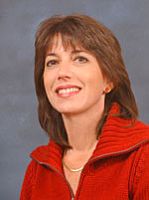 | | ELLYN SETNOR BOGDANOFF |
May 20, 2004 - District 91 Statehouse Representative Ellyn Setnor Bogdanoff addressed the May 20th Galt Mile Community Association Advisory Board meeting at Nick�s Italian Restaurant. She improved everyone�s digestion considerably when summarizing the recently completed legislative session in Tallahassee. At its outset, the session appeared to portend disastrous consequences for condominium owners. A veritable whirlwind of legislation impacting Associations, positive and negative, permeated the House and Senate calendars throughout the session. Representative Bogdanoff diplomatically referred to the �open season on Associations� as a collection of good intentions gone awry. A potpourri of carelessly constructed bills that were publicized by their sponsors as �empowering� to condo owners were floated through the legislative chambers. Once the actual content of the legislation was revealed as a formula to dismantle the condominium system in Florida, a myriad of protest hit the Capitol like a tidal wave. Legislators responded to the flood of objections from thousands of condo owners throughout the State by disemboweling the offending legislation. By the end of the session, the voices raised against the �Condo Killer� bills grew so deafening that they were unceremoniously scrapped.
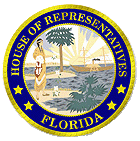 The winner of a closely contested January 6th race for Connie Mack IV�s vacated District 91 Statehouse seat, Representative Ellyn Setnor Bogdanoff (R � Fort Lauderdale) just experienced her first legislative session. On January 30th, a few days after her successful Statehouse bid (official �elected date� was January 27th), House Speaker Johnnie Byrd appointed Ms. Bogdanoff to the House Committee on Appropriations, the Subcommittee on Commerce & Local Affairs Appropriations, the House Committee on Commerce, the Subcommittee on Workforce & Economic Development, the House Judiciary Committee, the House Committee on Insurance, the Subcommittee on Insurance Regulation, the House Committee on Procedures and the Subcommittee on Ethics & Elections � more than a full plate. She described the legislative process from the unique perspective of a neophyte insider. She characterized legislating in Tallahassee as a �balancing act� between conflicting interests. While she carries a mandate to protect the interests of her constituency, she also must keep a clear �world view�, taking into consideration what is best for the State as a whole. In addition, her effectiveness as a legislator will depend upon the relationships she develops with her peers, therefore requiring that she step on as few toes as possible while navigating the session. This political �high-wire� act is a challenge for veteran Statehouse denizens. Ms. Bogdanoff, a rookie, acquitted herself creditably, graduating her trial by fire with flying colors.
She depicted the environment in Tallahassee, particularly toward the �hard knuckle� final days of the session, as �like working in a high-pressure cocoon�. Bills are evolving at lightning speed as their sponsors try to align the support required for their passage. Provisions are scratched out or penciled in on a minute by minute basis.  | GMCA PRESIDENTS COUNCIL
CHAIRMAN PIO IERACI |
During the last few days, entire bills were killed and their language was spliced into other surviving legislation as their desperate sponsors tried to keep their season�s work product alive. Ms. Bogdanoff stated that she �remains online all day during this period to maintain contact with her constituency�. She said that she �often gets better, more current input from constituents who are closely following the legislation than through the usual networking that is available on the Floor.� Ms Bogdanoff asserted that �many legislators rely on �the folks back home� to keep them up to speed by email and electronic messages during the final days of the session.�
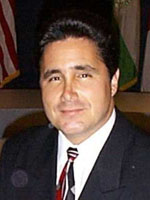 | REP. JULIO ROBAINA
HB 1223 CS SPONSOR |
Representative Bogdanoff was asked by GMCA Presidents Council Chairman Pio Ieraci about her response to Representative Julio Robaina�s House Bill 1223 (HB 1223), the controversial �Condo Killer� bill. She characterized Mr. Robaina as �an honorable man who is trying to address a problem that some of his constituents are facing.� Ralph Hamaker, President of Coral Ridge Towers South, pointed out that Mr. Robaina�s original bill suffered from being unbalanced, �hurting far more people than it helped.� Ms. Bogdanoff agreed, explaining that �the provisions injurious to the vast majority of Associations were either removed from the bill or compromised upon until they were acceptable.� By way of example, she described the Ombudsman, a controversial office that was originally envisioned as a feudal-style bounty hunter of sorts, as having been transformed into a true �two-way street�. The final �compromise� version would be a mediator, not a prosecutor, who is equally available to unit owners, board members and Associations when called upon.  | | Rep. Jeff Kottkamp |
Ms. Bogdanoff exhorted that, �the provisions of the bill that threatened to confiscate owners� rights or interfere with an Association�s daily operations were removed.� When asked about the final version of SB 3046 - HB 1899, a �Construction Defects� bill that would cripple condo owners� ability to seek redress for improperly performed construction; she said that she received assurances from House Judiciary Committee Chair Representative Jeffrey KottKamp that the most egregious provisions were �adequately modified.� She then asked her legislative aide, Gerald O'Rourke, to review the final version and promised to get back to us.
Clearly distressed by the possibility of destructive legislation such as the �Condo Killer� bills even being considered, several Advisory Board members asked why the sponsors were given such latitude when pressing for their passage. Ms. Bogdanoff responded, �I am well aware of the different positions, but there was a commitment to make this bill work. I believe I owed it to the sponsor to give him that opportunity, as I would expect the same courtesy in return.� She continued, �Many of the concerns I expressed have been corrected: criminal background checks, 2-way ombudsman, term limits and other problems were fixed.� Her predisposition to allow the legislative process to transmogrify the bill into acceptability, as opposed to an overt adversarial confrontation with the sponsors, should leave Representative Bogdanoff with her legislative bridges reasonably intact. This should bear fruit in future sessions.
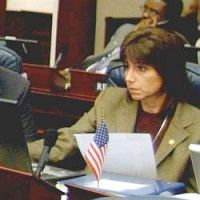 | | REP. BOGDANOFF ON HOUSE FLOOR |
Ms. Bogdanoff explained that the vast majority of condo related legislation �gratefully died on the calendar�. However, the central language of these ill-fated bills was invested into two surviving bills, Senator Jeffrey Atwater�s SB 2984 (A Homeowners Association bill created to address the concerns raised by Governor Jeb Bush�s Homeowners Association Task Force) and Senator Walter G. �Skip� Campbell, Jr.�s SB 1184 (a Civil Liability bill that protects Associations that install defibrillators). Along with the few acceptable remaining provisions of the infamous Condo Killer HB 1223, the positive wording from Senator Steven Geller�s SB 1938 (the well-supported easing of the housekeeping requirements adjunctive to an Association�s decision to opt out of the expensive full sprinkler retrofit) was placed into both bills. These two bills (like engineers, legislators are great believers in redundancy) became voluminous repositories for the surviving remnants of dozens of bills that were �laid on the table� (crapped out) during the session�s final days.
Representative Bogdanoff discussed an unfortunate side effect of the State�s political and financial redistricting that hits Southeast Florida squarely in the educational wallet. The legislature is operating under a new �formula� with regard to the general distribution of funds throughout the State. Tremendous focus was concentrated on the budgetary impact for every piece of legislation. This new formula strongly disadvantages Southeast Florida - Miami-Dade, Broward and Palm Beach counties in particular. It completely ignores the cost-of-living differences in the State�s various regions, painting the more costly urban areas with the same fiscal brush as the less expensive areas of central and north Florida. For instance, the fact that it costs teachers more to live in Miami or Fort Lauderdale was eliminated as a factor when considering aspects of educational funding. This de facto transfer of funds from Southeast Florida cities to the north and central country areas will cripple efforts to retrench our underachieving educational system.
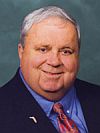 | | Sen. Pres. JIM KING |
The only chance of addressing this inequity will be through the formation of a unified Southeast Florida coalition. The innate distrust between Miami and Broward legislators will have to be surmounted. As long as local squabbles occupy our legislators� attention, the region will continue to bleed money.  | SENATOR ALEX
DIAZ de la PORTILLA |
Ms. Bogdanoff explained that Senator James E. �Jim� King Jr. of Jacksonville is stepping down as Senate President. Because Senator Alex Diaz de la Portilla of Miami, the Senate�s current �President Pro Tempore�, is in contention to replace King, he is sidestepping the struggle necessary to reclaim access to the lost revenues. Avoiding a confrontation with northern legislators at this time will inure to his benefit. However, if he is successful in his bid for the Senate Presidency, he could be an invaluable asset in recovering the appropriations lost due to the one-sided formula.
As the session wound down, Ms. Bogdanoff was intensely lobbied by the sponsors of, among others, the Condo Killer bills. While she attempted to assess the rapidly changing legislation, Representative Bogdanoff maintained contact with an assortment of constituents, updating them about the changes and requesting their input. Drawing on the experience of fellow legislators for guidance on certain condo-related issues, she elaborated, �Representative J. Dudley Goodlette of Naples also represents a district that contains a substantial number of large condominiums. We discussed the impact of the condo bills on our respective constituencies.� A comforting email that I received in response to queries about her intentions read, �I will keep you in the loop as this legislation transforms either into something we can accept or something we must reject. Either way, be assured that I will be well informed and ready to debate the issue of the floor if it is needed. I am on line during session, so if you are watching, feel free to email me your thoughts.� She was...so I did. I subsequently received a series of thoughtful analyses of the various bills being contested along with requests for further input!
 | | TALLAHASSEE STATEHOUSE |
Representative Bogdanoff did not have the luxury of acclimating to the legislative battleground. After defeating Lauderdale-by-the-Sea Mayor Oliver Parker by a paper thin 12-vote margin in a January 6th special election for the vacated Statehouse seat, she found herself in the Tallahassee soup bowl by March. When it mattered, she delivered. As the Advisory Board meeting came to a close, Ms. Bogdanoff suggested that we organize our objectives now for the next legislative session. She offered to caucus with GMCA representatives to create a clear �unified agenda that will serve as a legislative wish list.�
The concerns borne of unfamiliarity with a new representative melted away during the course of the meeting. While many of us knew from her recent Statehouse candidacy that she is a remarkably well credentialed attorney with experiential insight into the political process, we are now additionally aware that she has the political �moxie�, brains and skill required to thrive in Tallahassee - the real deal. More importantly, she is there for us. The accuracy of our assessment, like all things political, will come out in the Tallahassee wash during the next legislative session�s laundry day. In the interim ... we�d better get cracking on that wish list!
 Contact Representative Ellyn Bogdanoff Contact Representative Ellyn Bogdanoff 
Tallahassee -
The Capitol (Room 1102), 402 South Monroe Street, Tallahassee, FL 32399-1300. Her phone# in the Capitol is (850) 488-0635. Her Email is [email protected]
Local -
2601 East Oakland Park Blvd (Suite 204), Fort Lauderdale, FL 33306-1612. Her local phone# is (954) 958-5569.
Legislative Aide -
Gerald O�Rourke, Ms. Bogdanoff�s District Aide, can be Emailed at [email protected].
For complete contact information, go to Report Card.
Click To Top of Page
Tallahassee  Creates a Storm Creates a Storm 
Legislation Could Dismantle  Condominium System Condominium System

 Tallahassee has found a new and effective way to abridge your rights and take your money. What's different about this effort is that they will be expecting you to thank them for doing so. Toward the end of 2003, several legislators with time on their hands embarked on a fishing expedition. In response to a collection of horrific anecdotes detailing the difficulties that certain condo owners had while contending with their respective Boards, the The Select Committee on Condominium Association Governance was formed. The Committee scheduled a series of Public Hearings throughout the state for the purpose of determining the extent of the perceived injustice. It was assumed that the Committee would conduct balanced hearings, collecting testimony from all sides of the issue. They would hear from those who claimed victimization. They would hear, in turn, from those accused of perpetrating the injustice. They would hear, from experts, if, how, where and why the system failed. They could then fulfill their mandate, to make recommendations that would implement the solutions that the experts developed. This never happened. Tallahassee has found a new and effective way to abridge your rights and take your money. What's different about this effort is that they will be expecting you to thank them for doing so. Toward the end of 2003, several legislators with time on their hands embarked on a fishing expedition. In response to a collection of horrific anecdotes detailing the difficulties that certain condo owners had while contending with their respective Boards, the The Select Committee on Condominium Association Governance was formed. The Committee scheduled a series of Public Hearings throughout the state for the purpose of determining the extent of the perceived injustice. It was assumed that the Committee would conduct balanced hearings, collecting testimony from all sides of the issue. They would hear from those who claimed victimization. They would hear, in turn, from those accused of perpetrating the injustice. They would hear, from experts, if, how, where and why the system failed. They could then fulfill their mandate, to make recommendations that would implement the solutions that the experts developed. This never happened.
The hearings were limited to anecdotes, dark stories about leaks, pets, parking spaces and liens. That�s it. Listening to these unrebutted parables constituted the extent of the investigation. Because the meetings were poorly publicized, the attendees were primarily a small, but loud, group of disgruntled condo owners who seemed to know one another. Whenever those who weren�t predisposed to hanging a Condo Board member attempted to speak, they were roundly shouted down. Surprisingly, the Committee seemed to encourage the revolutionary zeal that transformed the hearing into a revival of sorts. Instead of focusing on the specifics of each incident, each speaker basically �bore witness� to the excruciating pain they had to endure as a result of some Board member�s insensitivity to their �cat�. Each indictment was followed by rousing vocal support afforded by other �testifiers�. This hearing, reminiscent of those held in town squares prior to lynchings, was quickly repeated in other sites around the state.
 | SENATOR RUDY GARCIA
SB 2498 SPONSOR |
As suspected when the committee was formed, the rationale for these �fact-finding� hearings was to underwrite a preconceived set of recommendations designed to curry favor with disgruntled condo owners at the expense (in time, effort and MONEY) of everyone else. This was recently confirmed when they released bills in the House and Senate containing requirements that drive up the expense of living in a condominium, transfer the governance of condominiums from the residents to Tallahassee and disenfranchise all residents that live in a condominium less than three months during the year! The group of �loud testifiers� that dominated the �hearings� and is seemingly pulling the strings of the Committee is a political organization known as the �Cyber-Citizens for Justice�. This organization of slightly more than 100 official members is trying, through this rubber-stamp committee, to dismantle the Condominium System in the State of Florida. Decisions regarding maintenance, security, improvements, housekeeping, rules and regulations will pass from the condo owners to the State. The condo you thought you owned will be subject to a �landlord�...Tallahassee. These bills, which would skyrocket maintenance expenses and remove any vestige of self-governance, are cruising through the legislature right now. Once passed, all building improvements will grind to a halt and if you can�t get your faucet to stop dripping, you'll need to contact your Senator! How can this be? Well...it�s happening! It will only stop if enough condo owners object.
The bills, SB 2498 in the Senate and HB 1223 CS in the House, contain 42 pages of poorly drafted and constitutionally deficient regulations, several of which completely confiscate any control that condo owners can exert over their homes. It�s what is essentially considered �scorched earth� legislation. Because this angry group of condo owners doesn�t have as much control over their respective condos as they would like, neither will anyone else! One of the most egregious provisions in the legislation would allow any condo owner to prevent the condominium from performing any improvement, making any repair, addressing any security problem...simply by asserting that it has a financial impact! Hard to believe???...it�s in there. Anything that costs money (which includes everything, of course) can be objected to by a single unit owner and, in turn, would require a majority of the voting interests to pass on it. To hire a security guard, call a plumber or replace a broken window, the Association would have to send out a mailing to every owner to �vote� on it beforehand. Until they received 51% of all the owners voting their approval, you�ll do without the guard, the window and you�ll live with the leak! No committee or Board can make any decision to accomplish ANYTHING without a vote by ALL THE OWNERS! The ramifications are staggering. Every maintenance task performed by the maintenance staff might have to be voted upon. Nothing could get done...period. Every Condo would have to hire a full time communications staff to send out 10 to 12 ballots each day to EVERY CONDO OWNER! Every issue that wasn�t responded to positively by at least 51% of all the owners would languish. Every resident will be called on to complete and return 10 to 12 ballots every day to maintain their building. Every resident, whether they want to or not, will have to assume the responsibilities of an unelected Board member, contacted by every other resident to discuss every decision that the building requires on a daily basis.
 | REP. JULIO ROBAINA
HB 1223 CS SPONSOR |
The bills uniformly suffer from not having been thought through. For instance, to address what the House Staff Analysis characterizes as �Owners are being impacted fiscally and through hardships (?) by board member decisions�, the Committee�s statutory response is to demand �issues voted on by board members that create a fiscal impact or hardship for the unit owner, must be approved by a vote of the majority of the unit owners.� The dangerously simplistic wording is rife with opportunity for abuse by anyone with an axe to grind. Any owner can claim that any and every decision represents a �fiscal impact� (every building has a few people that vehemently oppose paying anything for any reason!)... thereby instigating a vote by the entire membership for every single decision. No Board can be expected to fulfill its fiduciary obligation to maintain the premises when any spiteful resident can demand a �vote� prior to fixing a leak or relieving a tripping hazard.
A contradiction buried in the legislation stems from the insistence of a two-thirds vote to waive reserves in place of the simple majority that is currently required. While its supporters are willing to stop any improvements and disrupt condominium operations until a majority vote of all the owners is sustained if the improvements cost ten dollars, and a unit owner claims a �financial impact�, raising the bar from a majority to a two-thirds endorsement to waive the reserves practically guarantees an enormous �financial impact� to all unit owners. Sounds incredible? Wait...there's more.
The bill mandates the formation of an entity called an �Ombudsman� to lower tensions within an Association. Any malicious condo owner can call on this Ombudsman to marshal the resources of the State in opposition to the will of the rest of the Association members. If a vast majority of the members legally vote to accomplish an objective, a single dissident can call on the �Ombudsman� to have it overturned. This is an attorney who, win or lose, gets paid. The �Ombudsman� would have the right, if called upon by a single owner, to perform unannounced searches AND SEIZURES of all the Condominium�s records, effectively shutting down all condo operations for weeks. The only other venue wherein this �right� has been afforded is to the F.B.I....with regard to terrorist organizations...for National Security. It is at best naive to assume that the availability of this state-sponsored prosecutor to every dissident Condo owner will lower the tensions and litigation within an Association. As described...scorched earth.
Other grossly unfair provisions of the bills, like the one that precludes anyone from serving on the Board that spends one day less than three months in residence during the year (making most snowbirds and all new members ineligible), really wouldn�t matter in the long run. Since the Board would essentially be impotent, no sane person would volunteer to serve. Board members would receive complaints without having the wherewithal to respond to them. Convincing qualified people to volunteer service on a Board is difficult under the best conditions. Under these circumstances, where their sole responsibility would be to apologize to complaining neighbors for not being able to help them, it will be virtually impossible. It also renders inconsequential the provision that no two relatives (meaning parent, child, spouse, sibling, grandparent, grandchild, uncle, aunt, niece, nephew, great-uncle, great-aunt, great-nephew, great-niece, first cousin, or second cousin, by blood, marriage or adoption, and includes half and step relatives) could serve on the same Board. While it is reasonable to avoid allowing four members of one family from one unit dominate a Board, why disenfranchise the half brother of a second cousin twice removed who lives in a separate unit and pays separate maintenance and assessments? The innate silliness of the concept, aside from its being unconstitutional, is offset by the probability that no one would volunteer to serve on a puppet-like prostrate Board anyway.
The bills are also packed with provisions that contradict one another. It demands that Board members attend classes to familiarize themselves with their responsibilities, ostensibly to create more effective Board members. It then imposes a two year term limit. This will insure that the Board is always manned by inexperienced personnel - guaranteeing less effective Board members. When the United States Congress voted down the �term limits� legislation, they characterized the concept as �the dumbing down of the Congress�; ridiculing the notion that control of the country should be left to the most inexperienced Congresspersons available! The Florida legislators who designed this provision voted themselves an EIGHT YEAR TERM LIMIT�a clear case of �do as I say, not as I do!�
Obviously, if these bills pass, the value of a condominium would be reduced to its furnishings. Who would deliberately move into a building wherein no one could be held responsible for its operation? In this regard, this legislation bears a striking resemblance to a tactic known as blockbusting. To acquire a certain parcel of Real Estate, an unscrupulous developer would intimidate the existing residents into abandoning their homes. The hearings that were originally held by the Select Committee on Condominium Governance, while being dominated by the members of the �Cyber-Citizens for Justice� in Miami and Broward (they somehow were the only ones with prior knowledge of the meetings!), only had 4 complainants in Orlando, 15 in Fort Myers and 10 in Tallahassee. It is unfathomable that State Legislators would consider placing the interests of these few above those of the millions of residents that will suffer from this legislation. To add insult to injury, according to the House of Representatives Staff Analysis of the Committee�s �recommendations�, the $5.995 million that the legislation costs will be paid by YOU. The implication inherent in this legislation is not so much that condo owners are like children, thoughtlessly hurting one another for no reason, but rather that they are akin to vicious sociopathic morons, requiring an �Ombudsman� to prevent them from committing crimes against humanity.
 | Senator Evelyn Lynn
Dropped Sponsorship |
The bills must be stopped. At the very least, they require substantial surgery. No reasonable resident would argue against the implementation of rational improvements to the laws we live by...but these ain�t them! Senator Evelyn J. Lynn, the former sponsor of the HB 2498, decided that it was so bad that she dropped her sponsorship of the legislation! The gauntlet was retrieved by Senator Rudy Garcia, who intends to shepherd the bill through it's Committee Reviews. The irony attendant to these bills is incalculable. One of the stated purposes of the legislation is to diminish the legal conflicts that Associations suffer. The way that every provision in the bills is worded invites non-stop litigation. The devastation resulting from this casually drawn half-baked legislation will not sustain excusing its supporters because their good intentions fell prey to �unintended consequences�. The consequences, which we will all no doubt suffer, are quite intentional!

 Before reacting to the �bad news� attributable to this legislation, read about the outcome of the legislative session and, subsequently, the fate of these bills by Clicking Here! Before reacting to the �bad news� attributable to this legislation, read about the outcome of the legislative session and, subsequently, the fate of these bills by Clicking Here!
 For those of you interested in discussing the provisions of these bills with your representatives or the Governor, their contact information is as follows: For those of you interested in discussing the provisions of these bills with your representatives or the Governor, their contact information is as follows:
 The entire route that both bills are expected to take is explained below (Click Here). The key to success is to track the legislation and contact the legislators serving on the committee that is about to review the respective bills. The progress of the bills will be followed below (Click Here)! The entire route that both bills are expected to take is explained below (Click Here). The key to success is to track the legislation and contact the legislators serving on the committee that is about to review the respective bills. The progress of the bills will be followed below (Click Here)!
 Skepticism is a gift given to fuel one�s quest for the truth. Its generally a GOOD IDEA to not believe everything you hear. For those of you with scientific souls, please do your own investigating. The Web Page on the Florida Senate�s Web Site that contains the legislative information for SB 2498 can be viewed by Clicking Here! The Web Page for its companion bill in the Florida House (on the Florida House�s Web Site), HB 1223 CS, can be viewed by Clicking Here. If you would like to evaluate the actual text in the legislation for yourself, Click Here to read the House Bill (HB 1223 CS) and Click Here to read the Senate Bill (SB 2498). Click Here to read about the ultimate fate of the �Condo Killer� bills on the final day of the legislative session. Skepticism is a gift given to fuel one�s quest for the truth. Its generally a GOOD IDEA to not believe everything you hear. For those of you with scientific souls, please do your own investigating. The Web Page on the Florida Senate�s Web Site that contains the legislative information for SB 2498 can be viewed by Clicking Here! The Web Page for its companion bill in the Florida House (on the Florida House�s Web Site), HB 1223 CS, can be viewed by Clicking Here. If you would like to evaluate the actual text in the legislation for yourself, Click Here to read the House Bill (HB 1223 CS) and Click Here to read the Senate Bill (SB 2498). Click Here to read about the ultimate fate of the �Condo Killer� bills on the final day of the legislative session.
Click To Top of Page
The Road to Perdition

Condo Killer Legislative Route

The House
 | | Representative Ellyn Bogdanoff |
 The House Bill HB 1223 CS, already passed the House Committee on Business Regulation on March 10th by a vote of 33 YEAS to 6 NAYS. The Committee substituted a version (House Bill HB 1223 CS - CS stands for Committee Substitute) that is slightly less damaging than the original version. The bill went to the State Administration Committee on March 29th at 8:00 AM for a vote. The Chair of that Committee is Rep. Anna Holliday �Holly� Benson - R-Pensacola (Email: [email protected]). In response to overwhelming objections to the bill's provisions by condo owners throughout the State, HB 1223 had many of the damaging provisions excised, such as term limits, mandatory criminal background checks, governing by majority consensus, raising the percentage to waive reserves, majority training for board members, changes to the competitive bidding process and changing the lien collection process. However, the Ombudsman, grandfathering of exemptions in certain amendments (creating two classes of condo owners), the Legislative Advisory Council that performs Executive functions, and the Question and Answer Sheet remain as causes for concern. It passed State Administration by a vote of 6 YEAS and 0 NAYS. The House Bill HB 1223 CS, already passed the House Committee on Business Regulation on March 10th by a vote of 33 YEAS to 6 NAYS. The Committee substituted a version (House Bill HB 1223 CS - CS stands for Committee Substitute) that is slightly less damaging than the original version. The bill went to the State Administration Committee on March 29th at 8:00 AM for a vote. The Chair of that Committee is Rep. Anna Holliday �Holly� Benson - R-Pensacola (Email: [email protected]). In response to overwhelming objections to the bill's provisions by condo owners throughout the State, HB 1223 had many of the damaging provisions excised, such as term limits, mandatory criminal background checks, governing by majority consensus, raising the percentage to waive reserves, majority training for board members, changes to the competitive bidding process and changing the lien collection process. However, the Ombudsman, grandfathering of exemptions in certain amendments (creating two classes of condo owners), the Legislative Advisory Council that performs Executive functions, and the Question and Answer Sheet remain as causes for concern. It passed State Administration by a vote of 6 YEAS and 0 NAYS.
On April 12th the bill was referred to the House Subcommittee on Commerce & Local Affairs Appropriations where it was added to the agenda on April 15th. The Committee is chaired by Representative Frederick C. �Fred� Brummer (R); Vice Chair - Representative Don Davis (R). On April 16th the bill was passed favorably by a vote of 10 YEAS vs. 0 NAYS out of 12 Committee members (2 "missed" votes). On April 20th, HB 1223 CS went to the House Appropriations Committee. It passed favorably by a vote of 28 YEAS vs. 11 NAYS with 10 "missed" votes out of 49 Committee members. The bill was placed on the Special Order Calendar on April 21st and closed to Amendments on April 23rd. On April 27th, it was placed on the House Calendar. On April 28th, it was again placed on the Special Order Calendar where it was temporarily postponed on the Second Reading. On April 29th, it was again added to the Second Reading Calendar and closed to Main and Adhering Amendments.
Text of the House Bill (HB 1223)
The Senate
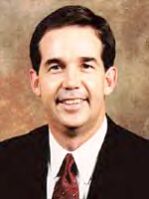 | | Senator Jeffrey (Jeff) H. Atwater |
 Senate Bill SB 2498 will make stops at Regulated Industries; Governmental Oversight and Productivity; Judiciary; Appropriations Subcommittee on General Government; and Appropriations. See below for the general contact information for these committees, including the current Chairs and the Vice Chairs. District 25's Senator Jeffrey Atwater (R) (Email: [email protected]), sits on two of the reviewing committees, the Senate Committee on Governmental Oversight and Productivity and the Senate Appropriations Subcommittee on General Government. Senate Bill SB 2498 will make stops at Regulated Industries; Governmental Oversight and Productivity; Judiciary; Appropriations Subcommittee on General Government; and Appropriations. See below for the general contact information for these committees, including the current Chairs and the Vice Chairs. District 25's Senator Jeffrey Atwater (R) (Email: [email protected]), sits on two of the reviewing committees, the Senate Committee on Governmental Oversight and Productivity and the Senate Appropriations Subcommittee on General Government.
After a vote that was scheduled for March 31st in the Senate Committee on Regulated Industries was postponed, the Bill was rescheduled on April 7th for reconsideration on Monday, April 12th at 12:30 PM. The vote was finally held and the Bill passed the Committee by a 8 YEAS vs. 2 NAYS result. The postponement was the result of a veritable flood of objections to the inherent unfathomable provisions from condo owners across Florida. In Regulated Industries, SB 2498 was amended to match the watered down House version of the Bill (HB 1223 CS), wherein many (but not all) of the worst provisions were removed. The feudal-style reincarnated Ombudsman, whose powers replicate those already held by the Division of Florida Land Sales, Condominiums and Mobile Homes, still looms as an unnecessary $Multi-Million drain on condominium owners, along with the creation of two classes of condo owners stemming from the grandfathering of exemptions to the majority will of an Association. Also remaining is the Advisory Council, another resurrected failure designed to make recommendations regarding condominiums (we saw how well that worked!) and the Question and Answer Sheet.
The bill came up for consideration on April 19th before the Senate Committee on Governmental Oversight and Productivity. It passed favorably by a vote of 7 YEAS vs. 2 NAYS. On April 20th it went to the Senate Judiciary Committee. On April 23rd, SB 2498 was withdrawn from Judiciary and sent to the Senate Appropriations Subcommittee on General Government. The following day, April 24th, it was withdrawn from the Senate Appropriations Subcommittee on General Government and the Senate Appropriations Committee. It was placed on the second reading Calendar for the full Senate.
On April 30th, SB 2498 Died on the Calendar! See Below �The Old Switcheroo�.
Text of the Senate Bill (SB 2498)
 To read about the impact of this legislation, Click Here! To contact your Spokespersons in Tallahassee, Click Here. To read about the impact of this legislation, Click Here! To contact your Spokespersons in Tallahassee, Click Here.
Click To Top of Page
The Old    Switcheroo Switcheroo

Condo Killer Skeleton Slipped into Alternate Bill 

 Tallahassee hardball is a game for adults who never worked out some of their childhood conflicts. While it doesn�t require great hand-eye coordination, it conjures the old admonition to �keep one�s eye on the BILL!� Fanatical persistence and fervent determination score big points. Distraction, even for a minute, results in immediate forfeiture. Delivery of the loopholes/weapons/resources/influence that were part of whatever deal was arranged prior to the session are what the winners achieve. Some legislators are impresarios while others are drone-like pawns. The stakes on the table during this year�s session were condominiums...our homes. Tallahassee hardball is a game for adults who never worked out some of their childhood conflicts. While it doesn�t require great hand-eye coordination, it conjures the old admonition to �keep one�s eye on the BILL!� Fanatical persistence and fervent determination score big points. Distraction, even for a minute, results in immediate forfeiture. Delivery of the loopholes/weapons/resources/influence that were part of whatever deal was arranged prior to the session are what the winners achieve. Some legislators are impresarios while others are drone-like pawns. The stakes on the table during this year�s session were condominiums...our homes.
 | | Governor Jeb Bush |
Prior to the legislative session, Governor Jeb Bush set up a task force to investigate some governance foibles surrounding Homeowner Associations. Some Associations prevented members from flying the flag. Of greater importance was the refusal of some Associations to permit handicap ramps to be erected within their dominion. The Homeowners Association Task Force was a reasonable response to questionable policies. They would strive to induce Homeowner Associations to exhibit fiscal responsibility and answerability to their memberships. Structures for settling disputes were conceived and refined. The Task Force would get some positive press, make legislative recommendations and possibly do some good.
Legislators looking to extract political capital from the Governor�s actions quickly jumped on the �Association� bandwagon. Legislation spewed forth from Tallahassee that transformed Association members into ping-pong balls. Much like the NASDAQ during the high-tech dominance of the stock market, Associations developed a sort of �dot com� allure that would guarantee any legislative sponsor the media coverage that politicians crave. Distinctions between Homeowner Associations, Condominium Associations, Cooperative Associations and Neighborhood Associations blurred as bills designed to exploit �Association fever� became fashionable overnight.
 | | Senator Steven Geller |
Many of these efforts were positive and had the support of condo owners. Senator Steven Geller and Representative Faye Culp devised a vehicle (SB 1938 - HB 747) to facilitate a condo�s ability to �opt out� of the full sprinkler retrofit mandated by the two year old multi-$Billion gift from the legislature to the Fire Sprinkler Association and the Plumbers and Pipe Fitters Union. Senator Jeffrey Atwater, sensitive to the Governor�s original intention to counter some of the excesses perpetrated by Homeowner Associations, created SB 2984 to help bring HOAs under the authority of the Division of Land Use, Condominiums and Mobile Homes. Senator Walter G. �Skip� Campbell, Jr. assembled SB 1184 to protect condos from liability when installing a life saving Automated External Defibrillator and deter insurance companies from requiring attendant Medical Malpractice coverage as a pre-condition to comprehensive protection. A veritable buffet of bills, good and bad, dealing with Mold Remediation (SB 1350 - HB1215), the extension of an Association�s covenants and restrictions by a majority vote (SB 1438 - HB 589), hand rails (SB 1728), elevators (SB 672), time shares (SB 1208), AEDs (SB 404), and any form of governance evolved like bacteria.
 | | Rep. Jeff Kottkamp |
Against this background, certain Statehouse Representatives decided to take advantage of this fervor to further self-serving agendas. Bills sponsored by the construction industry, SB 3046 - HB 1899 (shepherded through the House by Representative Jeffrey KottKamp), attempted to make the correction of construction defects almost impossible, only for condo owners. In the spirit of legislation mislabeled �clean air act� that allows the mass pumping of carcinogens into the atmosphere, a group of legislators led by Representative Julio Robaino (R-Miami) created a particularly destructive bill that they claimed would �empower condominium owners and reduce tensions within Associations.� Prior to producing the bill, they enlisted the aid of a small group of disgruntled condo owners (about 100) called the �Cyber-Citizens for Justice� to �plead� for the legislative �reforms� that they intended to ram through. They unabashedly choreographed a series of surprise public hearings in which any �non-cyber� was roundly shouted down. While they invited the Cybers and the press, they neglected to publicize the �public hearings� to the general public until the last minute. They used the orchestrated results to substantiate legislation that would transfer control of condominiums from the owners to Tallahassee. Once the actual provisions were revealed, HB 1223 became known as the Condo Killer bill. Its enactment would have confiscated the right of self-determination from every condominium owner in Florida, turning their homes and investments into a perversion of �public housing�. It would have made it impossible for an Association to govern itself.
 | REP. JULIO ROBAINA
HB 1223 CS SPONSOR |
The Representatives mistakenly assumed that no one would actually read their legislation. By duping some hungry media types into recording their heroic attempt to �rescue� embattled condo owners from the medieval tortures of their respective Condo Boards, the small group of �Cybers� and their cohorts in the Statehouse anticipated a legislative blitzkrieg. By the time condo owners would be aware of the damage done to their rights, it would be too late. Fortunately, it didn�t happen that way.
Thousands of angry condo owners across the state bitterly complained to their Senators, Representatives and the Governor. The sponsor of the companion bill in the Senate (SB 2498), Senator Evelyn J. Lynn, withdrew her sponsorship when she read the contradictory and unconstitutional mass abrogation of rights in the bill. In an attempt to dismiss the tidal wave of objections to his pet bill, Representative Robaino stated that �the owners were misled by their condo board attorneys, who had a serious stake in the outcome.� Ironically, the enactment of his HB 1223 would have made Condo Law one of the most lucrative fields in the legal profession, practically guaranteeing a continuous flood of litigation. The �Cybers� arranged a few high visibility demonstrations with the help of a union, Local 11 of SEIU, which is exploring inroads into organizing condo employees, an event that would skyrocket maintenance expense. The group and the union arranged a demonstration outside the Palm Beach office of Senator Jeffrey Atwater, the sponsor of a Homeowners Association bill, SB 2984. They demanded that he include a feudal style Ombudsman similar to the one in the Condo Killer Bills into his legislation. He didn�t. The House and Senate Committees that reviewed the legislation excised the damaging provisions, opting to protect millions of condo owners throughout Florida rather than pander to this small special interest group and the legislators that they acted through. Despite their being relegated to a shadow of their original impact, the Condo Killer bills had garnered so much antipathy arising from Robaina�s continuous efforts to disenfranchise condo owners that the bills were doomed.
While the disgruntled cybers sought a scorched earth answer to their complaints - if they couldn�t prevail in their respective condo Associations, neither would anyone else - the motives of the legislators were more mundane. When Senator Lynn declared the Senate Bill (SB 2498) as bad legislation and stepped down as its sponsor, it was picked up by Miami Senator Rudy Garcia. Miami Representative Julio Robaina, the House sponsor, was joined by friends and fellow Miami-Dade Representatives Rafael Arza, Gustavo Barreiro, Gaston Cantens, Rene Garcia, Marcelo Llorente, Juan-Carlos �J.C.� Planas, David Rivera, Marco Rubio and Juan Zapata as co-sponsors of HB 1223.
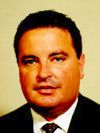 | | Rep. Gustavo Barreiro |
It seems that Representatives Juan Zapata and Gustavo Barreiro both own condominiums. Apparently, both of them neglected to pay legal assessments due on their units. Their Associations, fulfilling their fiduciary responsibility to protect its members from having to �carry� those who don�t pay their obligations, took action. Perhaps the legislators felt that they were entitled to special treatment because they were Florida State Representatives. Their Associations did not. The East Atlantic Gardens Condominium placed a lien against Barreiro�s unit on May 29, 2003 after he was legally notified on April 22nd that his $595 maintenance payment was past due. Barreiro claims that he was away in Tallahassee at the annual legislative session when he missed his maintenance obligation. The session was over on April 30th and he wasn�t liened until May 29th, a month later. Juan C. Zapata neglected to pay monthly maintenance for his unit at Elan at Calusa Condominium from June through October, 1989, in the amount of $181. He claimed that the Association was sending his bills to the wrong address. Is it possible he forgot that he owned a condominium for five months until they filed a lien?
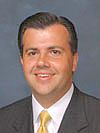 | | Rep. Juan Zapata |
The legislators might have found a more appropriate way to exact revenge on their Associations for expecting them to pay their bills. To dismantle the entire Condominium Association system in the State of Florida and place 1.1 million condo owners at risk is a severe response to an embarrassment that they brought on themselves. Enlisting the aid of their friends in the legislature to accomplish payback is an abject abuse of their position and the power that accompanies it. The retributive legislation deserved to go down in flames.
Representative Julio Robaina is a persistent man. As the legislative session closed, he shopped the bare skeleton of his snake-bit legislation around, slipping the remaining language into bills that rightfully had the support of condo owners. He surreptitiously plunked the few surviving provisions into SB 1184, a bill that developed into a �catch-all� for several condo-related issues. It contained liability protection for Associations that installed Automated External Defibrillators and carried the positive language from Senator Geller�s SB 1938, easing an Association�s ability to �opt out� of a multi-million dollar full sprinkler retrofit. Gone were his threats to jail condo Board members that he didn�t like. Gone was the disenfranchisement of millions of condo owners. Gone was the section that protected deadbeats from ever having to pay their assessments. SB 1184 was passed by the Senate on April 26th by a vote of 22 YEAS vs. 10 NAYS. It was passed by the House on April 30th by a vote of 94 YEAS vs. 8 NAYS, after which it was ordered enrolled by the Senate. On June 16th, the bill was signed by Officers and presented to the Governor.
 | | Senator Jeffrey (Jeff) H. Atwater |
Legislators on both sides of these issues are great proponents of insurance. Most of the surviving provisions affecting condominium owners that were vested into SB 1184 were also placed into Senator Jeffrey Atwater�s SB 2984. Robaina�s �Condo Killer� remnants, Geller�s �Opt Out� easements, protection from civil liability for Associations installing defibrillators and several other condo-related provisions were plowed into Atwater�s answer to Jeb Bush�s Homeowners Task Force. Senate Bill 2984 was passed in the Senate on April 27th by a 24 YEAS vs. 12 NAYS margin and three days later (April 30th) in the House by a vote of 102 YEAS vs. 13 NAYS. On June 16th, the bill was presented to the Governor after being signed by Officers.
Several highly questionable provisions remained. Robaina included the employment opportunity for wayward attorneys, the Ombudsman. The final incarnation of this office became a 2-way forum for Associations to settle internal problems. It is no longer a State-sponsored prosecutor available to anyone looking to sue his neighbor as in the original bill. It is now equally available to unit owners, board members, committee members and Associations. The �martial law� style powers were deleted. The Ombudsman is now a mediator. Robaina also managed to insert the confusing grandfathering of exemptions to thwart the will of a condo�s majority. This provision will create several classes of condo owner within an Association, with differing rights dependent on when they purchased their unit. The uncontroversial �Frequently Asked Questions & Answers� disclosure document that requires submission when a unit is sold was included as well.
The �Cybers� aren�t happy. They blame legislators considered to be �tools of the system� and a cabal of condominium attorneys for hypnotizing condo owners into rejecting their maneuvers. The legislators are a different story. At the same time Robaina and his friends were demanding 2-year term limits for Condo Board members, they were considering extending their own term limits from 8 to 12 years. Perhaps they should consider establishing an �Ombudsman� empowered to cash out elected officials who use their office for arbitrary vengeance on those who dare treat them like ordinary people. While Senate sponsor Rudy Garcia claimed to be satisfied with the result, Representative Robaina said, �I am accepting what they have given us because that's how it works in the legislature, but I'm coming back with it next year with a complete rewrite.� This gives him a whole year to consider alternatives to those provisions that carried disastrous consequences. Hopefully, he'll recognize the benefit of consulting with �the people� before designing another �People�s Bill�!
 Click Here to the Senate Bill 1184 Web Page! To read the actual text of Senate Bill 1184, Click Here. Click Here to the Senate Bill 1184 Web Page! To read the actual text of Senate Bill 1184, Click Here.
 Click Here to the Senate Bill 2984 Web Page! To read the actual text of Senate Bill 2984, Click Here. Click Here to the Senate Bill 2984 Web Page! To read the actual text of Senate Bill 2984, Click Here.
Click To Top of Page
Construction  Antics in Tallahassee Antics in Tallahassee 

Construction Industry Cuts a Deal...You Pay the Tab 

 It never stops. The legislature in Tallahassee, in addition to attempting to regulate your rights into oblivion through the absurd �Condo Killer� bills (SB 2498 & HB 1223), has discovered a new way to disadvantage the average condo owner. This has taken the form of two new construction defect bills, SB 3046 (Bennett) and HB 1899 (House Judiciary Bill), that will make it more difficult for every type of association and the residents who live in them to bring lawsuits and to pursue claims for construction defects. These take on added significance due to the enormous amount of construction required by condos undergoing rehabilitation throughout South Florida. It never stops. The legislature in Tallahassee, in addition to attempting to regulate your rights into oblivion through the absurd �Condo Killer� bills (SB 2498 & HB 1223), has discovered a new way to disadvantage the average condo owner. This has taken the form of two new construction defect bills, SB 3046 (Bennett) and HB 1899 (House Judiciary Bill), that will make it more difficult for every type of association and the residents who live in them to bring lawsuits and to pursue claims for construction defects. These take on added significance due to the enormous amount of construction required by condos undergoing rehabilitation throughout South Florida.
 | | Rep. Jeff Kottkamp |
The Bills are a love letter to the construction industry. If an Association has ANY type of maintenance work (construction, renovations, remodeling, design, or similar construction projects) performed in the common elements or an individual condo owner has work done in a home and the work does not meet the contract specifications, these bills would make pursuit of the developers, contractors, architects, engineers, etc. to address the defects a veritable �tour-de-force� with little chance of success. Before any action can be initiated, the contractor would be entitled to 120 waiting period, starting with notification. During this 4 month reprieve, the contractor (developers, contractors, architects, engineers, etc.) must be given the opportunity to inspect the association grounds and each individual unit and/or home. The contractor (developers, contractors, architects, engineers, etc.) is also allowed to do what's classified as DESTRUCTIVE TESTING! The bills don�t define or limit the term �destructive testing� but they are given the right by law to break holes in walls, remove floors, etc. in an effort to test the extent of the defects at issue. This can be done in individual units as well as in common areas.
In another testament to mediocrity, the bills also neglect to address the liability attendant to �destructive testing� when used by the contractor to determine liability for the defective construction. The legislation doesn't provide for the repair of damage caused by or during the �destructive testing� when performed by the contractor. This right afforded to the contractor can substantially increase an individual's or an Association�s overall exposure in several ways. The contractor might refuse to return the �tested areas� (holes made in walls, plumbing structures removed, floors stripped, etc.) to their �pre-tested� state. Secondly, since the opportunity to perform destructive tests allows the contractor to hire a subcontractor to do the testing and possibly contract a laboratory to diagnose test results, if the subcontractors or laboratories aren�t paid, they retain recourse to lien the unit and the Association. There are no requirements for a contractor to provide insurance or payment and performance bonds before engaging in destructive testing on individual units or common areas. In fact, there isn�t even a requirement for the contractor to be qualified to do testing or remedial work occasioned thereby.
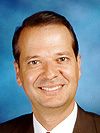 | | Sen. Alex Villalobos |
The contractor�s right of access to individual units can create opportunities for harassment in an attempt to pressure the association to not sue for the defective work. The contractor has the right to put all its subcontractors and sub-subcontractors on notice, as well as the architect and engineer. In that event, each of those entities will also have the right to inspect individual units and the common areas and perform their own destructive testing. Should the contractor demand that �destructive testing� be performed in every individual unit and any of individual units are unavailable for inspection and testing (i.e. the owners are out of town) then the association would be barred from suing for any construction defects until each of the units have been opened and access permitted to all parties involved. As such, it is likely that an Association would arrange for access to each of the units, requiring the commitment of at least one employee�s services for the entire testing period to provide this access. In the case where the contractor puts two subcontractors, an architect, and an engineer on notice for the �defect� in a 200-unit building, the Association can be made to arrange for a thousand destructive tests to be made, up to 5 in each unit!
The contractor has the right to request the association provide it with a copy of the expert report required by law detailing all aspects of the association�s claim (strengths as well as weaknesses). This is protected work product the association should not be required to disclose, but under this bill they would have no choice. There is no corresponding requirement for the contractor to reciprocate with a disclosure of expert reports of their own. Under the bill, the contractor would only have to give any �available� evidence, but nothing requires the contractor to obtain such a report. In that event, the association (required by law to have a report) would have to give the contractor their copy, but the contractor could just refrain from ordering its own report at this time to avoid similar disclosure to the association. Then, after a lawsuit has been filed and the contractor no longer has the duty to disclose any reports, the contractor can generate their own, using the association�s report as a basis. This provides an unfair advantage to the contractor in subsequent litigation with the association.
The bill, as currently worded (confusingly), would require the association to affirmatively accept or reject any settlement offer the contractor may give before suing. However, due to the language proposed for the bill, if the association did not timely reject the offer, it may be barred from ever suing for the defects. The bill allows suit only after �timely and properly� rejecting any settlement offer. If the association inadvertently misses its deadline by which to reject the offer, it can never again �timely and properly� reject and therefore (depending on how a court interprets this provision) may have lost its ability to ever sue for these defects. The bill�s language is just too unclear about what would happen if the offer is not timely rejected.
There is no requirement for a contractor offering to remedy the defects to do so within a reasonable time frame. They may agree to the repairs, but delay performance. The contractor can offer repairs, the association could accept, the contractor could string out performance or provide substandard repairs, and the association�s only recourse is to sue for the original defects. Therefore, the contractor has incentive to play games with settlement offers as a way to burden or harass the association in an effort to �motivate� a more favorable settlement arrangement. Alternatively, the contractor may offer to settle by paying a designated sum of money. An association must accept or reject any settlement offer within 45 days. However, the contractor is not obligated to provide any cost estimates or details about whether the sum of money offered is sufficient to remedy the defects. There may not be enough time in which the association can properly obtain bids for all required remedies and, therefore, in some instances may have to accept or reject a settlement offer without really knowing the sufficiency or adequacy of the offer.
These restrictions not only apply to Associations, but to individual unit owners living in Associations as well!
Bill Evolves into Law!
This construction defect bill further defines procedures to initiate and pursue construction defect claims under Section 558.01, et seq., Florida Statutes (also known as the Florida Construction Defect Statute). As described in detail below, the review Committees evaluating the bill made certain adjustments designed to soften the impact on condo owners. Thousands of emails, letters and faxes from perplexed homeowners forced improvements to the ultimate legislation. However, the bill that the Governor signed into law on June 18, 2004 could present dangers to homeowners and/or Associations who don't have their attorneys review construction contracts executed after July 1, 2004 - the date that the new law takes effect.
The bill requires owners of single family homes, units in multi-family buildings (such as condominiums, cooperatives, etc.) and other residential buildings to provide notice and an opportunity for contractors and those working under them to cure a construction defect or extend a monetary offer before litigation can proceed. Failure to comply with the various pre-suit requirements set forth in this bill may limit a homeowner's damages or result in court-imposed sanctions in the event the claim eventually proceeds to court.
What You Can Do!
It is important to remember that all design, construction and remedial/renovation contracts entered into on or after July 1, 2004, must contain a conspicuous notice outlining the statutory procedures regarding notice of construction defect claims and the opportunity to cure those claims. The parties, by written mutual agreement, may waive or alter the statutory procedure. When negotiating design, construction or renovation contracts, you should consult your attorney regarding two important issues.
- Make sure you have the proper conspicuous language regarding the new Chapter 558 notice requirements in your contract and
- Both you and your contractor should agree, in writing, to waive those requirements if you determine it is in your best interests to do so!
 By taking these simple and inexpensive precautions, you can sidestep a world of pain! By taking these simple and inexpensive precautions, you can sidestep a world of pain!

The House
 The House Bill, HB 1899, after being filed in the House Judiciary Committee (Chaired by Representative Jeffrey D. �Jeff� Kottkamp), was added to the House Calendar on April 12th. On April 19th, the bill was placed on the Special Order Calendar. Two days later, April 21st, Representative Jeff Kottkamp (R-Cape Coral) offered several amendments on the House Floor that made HB 1899 much more equitable towards associations and association residents. Representative Kottkamp responded quickly to the blizzard of objections and concerns from Condo owners once the legislation's inherent inequities became clear. Dozens of such emails were sent by Galt Mile residents! The bill was improved somewhat as a result. Despite Representative Jeffrey D. �Jeff� Kottkamp's attempts to marginally improve the various provisions, the legislation is still a passport for abuse by unscrupulous contractors. The House Bill, HB 1899, after being filed in the House Judiciary Committee (Chaired by Representative Jeffrey D. �Jeff� Kottkamp), was added to the House Calendar on April 12th. On April 19th, the bill was placed on the Special Order Calendar. Two days later, April 21st, Representative Jeff Kottkamp (R-Cape Coral) offered several amendments on the House Floor that made HB 1899 much more equitable towards associations and association residents. Representative Kottkamp responded quickly to the blizzard of objections and concerns from Condo owners once the legislation's inherent inequities became clear. Dozens of such emails were sent by Galt Mile residents! The bill was improved somewhat as a result. Despite Representative Jeffrey D. �Jeff� Kottkamp's attempts to marginally improve the various provisions, the legislation is still a passport for abuse by unscrupulous contractors.
On April 23rd, HB 1899 passed a vote in the House by 116 YEAS vs. 0 NAYS.
The Senate
 The Senate Bill, SB 3046, having passed the Senate Committee on Regulated Industries on April 12th by a vote of 10 YEAS vs. 0 NAYS, went to the Senate Judiciary Committee (Chaired by Senator J. Alex Villalobos) on April 13th. The bill was withdrawn from the Senate Judiciary Committee on April 23rd and placed on the Calendar (second reading). On April 26th, SB 3046 was placed on the Special Order Calendar. On the same date, the House Bill 1899 was substituted for the Senate Bill 3046 and sent to the Senate for a Second Reading. The Third Reading in the Senate took place on April 27th, after which the full Senate passed the bill by a vote of 39 YEAS vs. 0 NAYS. The Senate Bill, SB 3046, having passed the Senate Committee on Regulated Industries on April 12th by a vote of 10 YEAS vs. 0 NAYS, went to the Senate Judiciary Committee (Chaired by Senator J. Alex Villalobos) on April 13th. The bill was withdrawn from the Senate Judiciary Committee on April 23rd and placed on the Calendar (second reading). On April 26th, SB 3046 was placed on the Special Order Calendar. On the same date, the House Bill 1899 was substituted for the Senate Bill 3046 and sent to the Senate for a Second Reading. The Third Reading in the Senate took place on April 27th, after which the full Senate passed the bill by a vote of 39 YEAS vs. 0 NAYS.
The Governor
 On June 15th, HB 1899 was signed by Officers and presented to Governor. The Governor signed the bill into law on June 18th. The former Chapter 558 of the Florida Statutes that took effect on May 27, 2003 will be supplanted with this new version on July 1, 2004! On June 15th, HB 1899 was signed by Officers and presented to Governor. The Governor signed the bill into law on June 18th. The former Chapter 558 of the Florida Statutes that took effect on May 27, 2003 will be supplanted with this new version on July 1, 2004!
 Skepticism is a gift given to fuel one's quest for the truth. Its generally a GOOD IDEA to not believe everything you hear. For those of you with scientific souls, please do your own investigating. The Web Page on the Florida Senate's Web Site that contains the legislative information for SB 3046 can be viewed by Clicking Here! The Web Page for its companion bill in the Florida House (on the Florida House's Web Site), HB 1899, can be viewed by Clicking Here. If you would like to evaluate the actual text in the legislation for yourself, Click Here to read the House Bill (HB 1899) and Click Here to read the Senate Bill (SB 3046). Skepticism is a gift given to fuel one's quest for the truth. Its generally a GOOD IDEA to not believe everything you hear. For those of you with scientific souls, please do your own investigating. The Web Page on the Florida Senate's Web Site that contains the legislative information for SB 3046 can be viewed by Clicking Here! The Web Page for its companion bill in the Florida House (on the Florida House's Web Site), HB 1899, can be viewed by Clicking Here. If you would like to evaluate the actual text in the legislation for yourself, Click Here to read the House Bill (HB 1899) and Click Here to read the Senate Bill (SB 3046).
The text of the final Enrolled Version of HB 1899 can be read by Clicking Here.
Click To Top of Page
Vote Smart - Vote Smart - Vote  Early Early

 Registered voters planning on participating in the March 9th elections in Broward County do not have to wait until then to make their will known. Registered voters planning on participating in the March 9th elections in Broward County do not have to wait until then to make their will known.  | | Supervisor of Elections Dr. Brenda Snipes |
Florida�s registered Democrats will choose their preferred presidential candidate for the November election. Voters from all parties in 15 cities and towns holding municipal races across Broward County will choose commissioners, council members and mayors. Elections Supervisor Dr. Brenda Snipes wants to make things easier for her office by encouraging people to vote early in next month�s political contests. As of Wednesday, February 25th, eligible voters can cast absentee ballots, either through the mail or in person at any one of Supervisor Snipes� six offices.
Prior to 2001, voters had to provide evidence of hardship before being granted an absentee ballot. Residents were forced to sign affidavits stating why they couldn't make it to the polls on Election Day. Private and personal excuses including a medical condition, disability or a planned vacation were elicited and sworn to. In 2001, the Florida Legislature eased the restrictive conditions necessary to cast a ballot early, opening the opportunity to the overall electorate. Broward County first offered in-person early voting in the September 2002 primaries. Universally available early voting, also known as �convenience voting�, grows in popularity with every election.
Gisela Salas, Brenda Snipes� deputy supervisor of elections, disclosed that almost 7000 voters have requested absentee ballots by mail for the March 9th election so far.  | | Voting Touchscreen |
�Residents can use any of the six centers, regardless of where they live.� Salas continued, �Most voters will use touch-screen voting machines during early voting.� Broward Mayor Ilene Lieberman said many people prefer casting absentee ballots at one of the supervisor�s offices before a major election.  | | Broward Mayor Lieberman |
Addressing the exploding popularity of early voting, Lieberman elucidated, �It eliminates the need for people to request an absentee ballot, send it in the mail and wonder whether it got there on time. I believe it encourages better turnout.� Voting at a convenient time, avoiding lines and polling place delays and having as much time as desired to peruse the issues at the polls are some of the advantages that early voters enjoy.
The March 9thmunicipal races include the cites of Cooper City, Coral Springs, Davie, Hallandale Beach, Hollywood, Lauderdale-by-the-Sea, Lauderdale Lakes, Lauderhill, Margate, North Lauderdale, Parkland, Pembroke Pines, Pompano Beach, Southwest Ranches and Wilton Manors. Registered Democrats and all eligible voters in the cities holding municipal elections can vote Monday through Saturday until March 8th at any one of the Supervisor of Elections� six regional offices. Hours are 8:30 AM to 5 PM weekdays, 9 AM to noon on Saturday, February 28th and 9 AM to 5 PM on Saturday, March 6th. Early voters can receive and cast ballots at the following locations:
- North Regional Satellite Courthouse
1600 W. Hillsboro Beach Blvd., Room 166, Deerfield Beach - Telephone: (954) 831-1225
- South Regional Satellite Courthouse
3550 Hollywood Blvd., Room 160, Hollywood - Telephone: (954) 831-0443
- West Regional Courthouse
100 N. Pine Island Road, Room 130, Plantation - Telephone: (954) 831-2370
- Pembroke Pines Office
8301 Florida Drive, Room 102, Pembroke Pines - Telephone: (954) 964-0442
- Broward County Main Library
100 S. Andrews Ave., Fort Lauderdale - Telephone: (954) 357-7444
- Lauderhill Mall
1241 NW 40th Ave., Lauderhill - Telephone: (954) 357-3889
 To access extensive information about campaign contributions, go to �Report Card�. Also, check the Broward County Supervisor of Elections web site for voter registration, election information and results, district information, political committees and volunteer recruitment. To access extensive information about campaign contributions, go to �Report Card�. Also, check the Broward County Supervisor of Elections web site for voter registration, election information and results, district information, political committees and volunteer recruitment.
Click To Top of Page
Insurance Captives

The overwhelming increases in insurance costs throughout the country have permeated the South Florida market with a vengeance. Every level of insured has experienced rapid readjustment of operating budgets to respond to spiraling premiums. One generic method of containing costs has historically been to �cut out the middle man�. The insurance version of this �cost-control technique� is called an Insurance Captive.
An Insurance Captive is an insurance company that provides insurance to and is controlled by its owners. Captive �parents� may be individuals, corporations or even associations. A single parent captive is an insurance company formed to provide insurance coverages to its single parent owner, individual or corporate, and/or its subsidiaries. The group or association captive is an insurance company formed to provide insurance to its group or association of owners. The owners consist of two or more non-affiliated companies usually from a related business field with the shared objective of controlling their insurance costs. In general, to form a single parent captive, a company's annual insurance premium should be a minimum of $750,000. However, just about any size company can be part of an association or group captive. A group captive can be either homogeneous and insure similar types of businesses risks or heterogeneous and insure risks of several types of organizations. Both homogeneous and heterogeneous captives provide similar benefits. The choice is simply a matter of preference and compatibility. Since its inception, the captive has been considered an alternative to traditional insurance. Today, the figures present a different picture, one in which alternative insurance strategies are expected to gain a 50 percent share of the overall insurance market.
Every year, Associations, business owners and executives invest a large portion of income to insure the health and safety of their companies and employees. In a traditional insurance program, a year with minimal or no losses generally yields little, if any, return on that investment; a bad year typically equates to higher premiums the following year. Either way, you lose what potentially could be a substantial return on this investment. Traditional insurance carriers may leave you in the dark when it comes to tracking how your money is spent, when claims are paid out and to whom. As a group captive member, you are an owner. You control the �who,� �why� and �when� of the insurance process. The financial strength of the group allows members the independence to choose the highest quality service providers, while limiting the risk of catastrophic losses. This ability to control and manage these services reduces fixed costs.
The immediate realization of significant cost reductions and future long-term savings that Captives offer are the result of several factors that the �group� controls:
- The financial strength of the captive is secured by accepting only quality companies (Associations) that have learned (or are willing to learn) to manage risk effectively.
- The purchase of strategic insurance products such as specific and aggregate excess reinsurance coverage allows captive members to manage predictable losses while transferring potential catastrophic losses.
- Premiums are based on loss history rather than trends in the overall insurance market.
- Many of the fixed costs associated with traditional carriers are greatly reduced due to the ability to unbundle services and negotiate directly with service providers.
- Income potentially accumulates tax deferred for a period of time.
- Members should expect a return on their underwriting profits and investment income by adhering to risk management strategies. In other words, there is the potential for a significant return on dollars that were once considered pure expense.
You cannot achieve control of your insurance destiny simply by joining a captive. The success of the captive depends on the participation of its owners. One of the most important roles shared by every captive member is dedication to risk control. Risk control encompasses both loss prevention and claims management. Loss prevention refers to those practices established by a business to prevent and reduce the frequency of accidental loss. Claims management addresses ways to minimize the effect of those losses. Both the captive and its individual members should develop programs and services that help ensure that both aspects of risk control are handled efficiently and professionally.
Loss prevention is generally referred to as safety engineering. As one of the qualifications for joining a captive, each potential member should have in place or be willing to create an aggressive safety or loss prevention program. These programs should be evaluated by independent professional safety consultants who provide ongoing assistance to members in addressing needed improvements. Factors inherent in an effective loss prevention program are:
- Employee Supervisory Training - designed to enhance safety awareness.
- Hazard Surveys - on-site inspections to identify physical hazards.
- Policy/Procedure Development - help to create and implement safety - related programs.
- Regulatory Compliance - assures that members understand and comply with OSHA; Federal, County and municipal statutes and codes; NGO-sponsored codes (NFPA, ICC, ANSI, etc.) and other pertinent regulations.
Despite our best laid plans, there are no guaranteed methods to avoid all accidental losses - if there were, you wouldn't need insurance. But accidents do happen, and the way you manage your losses will have a direct effect on your future premium as well as your investment income. Unlike conventional insurance in which the insured has little idea of who is handling their claims or the status of those claims, captive members take an active interest in the entire claims management process. Aggressive Claims Management yields substantial savings. Below are some of the controls that captive members can exercise to manage claims effectively.
- Early Return-to-Work Program...
controls the cost of workers� compensation claims. One of the requirements for membership is the aggressive pursuit of transitional or modified-duty work.
- Attorney Selection...
allows members to have significant input in the selection of legal counsel.
- Claim Reviews/Quality Performance Meetings...
are organized and coordinated to provide captive members the opportunity to meet with their claims adjusters to discuss the status of claims. Designate �hot claims,� which alert adjusters and Captive Resources to specific claims that require special or immediate attention. Assist in the resolution of claims issues with prior insurance carriers.
While Insurance Captives can be set up in both U.S. and foreign domiciles, most captives formed are generally incorporated and conduct business under the jurisdiction of an offshore domicile such as the Cayman Islands. Offshore incorporation provides lower cost of operation, more practical governmental regulations, and potential tax advantages. In the U.S., group captives are licensed by a domiciliary state and use a fronting carrier, or they operate under the Federal Risk Retention Act. The companies may either be stock, reciprocal or mutual in organizational form. In theory, all mutual insurance companies are captives that are controlled by their policyholders. Although not formally recognized by many as being part of the captive insurance community in the U.S., intergovernmental insurance pools are captives owned by the public agencies they insure. Most are not subject to the more extensive state regulations that are imposed by captive insurers. Since the 1960s, many �household name� insurers started up as captives and gradually expanded into fully-fledged commercial insurance companies writing business for third parties as well as their parent companies - Allstate was once Sears� captive.
A captive program can be an effective way to manage risk and provide adequate coverage to its parent company or group owners. Sometimes, state laws do not allow captive insurance programs to issue insurance policies. In these instances a captive insurance company uses an admitted insurer to front the insurance program. A fronted program offers four major advantages:
- Insurance policies are issued by the fronted carrier to meet state filing and financial responsibility requirements.
- Fronted companies can offer a wide range of services including risk prevention, underwriting, pricing, claims handling, accounting, policy services and reinsurance.
- A fronting arrangement allows the captive to generate cash/flow and investment income benefits from lines of insurance which cannot be written by the captive because of state insurance regulation.
- Stable pricing and consistent coverage availability can be achieved from a long term partnership between the captive and fronted company.
Insurance companies benefit from fronting in several ways. Fronting insurance programs generate more business to the insurance companies that would otherwise be written by another insurance entity. A fronting program which is adequately secured with reinsurance and financial guarantees should generate a higher rate of return on equity to the fronted company than the traditional insurance company. A significant risk for a fronted company is the credit risk of the captive. Credit risk is generated from the captive�s inability to meet its financial obligations from the business and financial risk. They include adverse loss experience, catastrophic loss or inadequate spread of risk.
This illuminates the relationship between control and responsibility inherent in an Insurance Captive. If the members are lax in their control of screening and allow �sloppy� Associations to participate, it will drive up the groups expenses. If they don't control risk or manage claims effectively, ditto. If the decisions they make about service providers, legal and underwriting talent, reinsurance and domicility are casual, the substantial benefits disappear.
If, however, the members run the Captive efficiently, new applicants will be attracted like moths to a flame, expanding the Captive's financial base, diffusion of risk and overall clout. Whether a front is used or not, joining the nearly 5000 existing Insurance Captives throughout the world should relocate control of our insurance costs where it belongs, in our hands.
Click To Top of Page
  Homestead Exemptions Made Easy Homestead Exemptions Made Easy

  All legal Florida residents are eligible for a Homestead Exemption on their homes, condominiums, co-op apartments, and certain mobile home lots if they qualify. The Florida Constitution provides this tax-saving exemption on the first $25,000 of the assessed value of an owner/occupied residence. You are entitled to a Homestead Exemption if, as of January 1st, you have made the property your permanent home or the permanent home of a person who is legally or naturally dependent on you. The filing period for homestead exemption for 2004 is March 4, 2003 Through March 1, 2004. All legal Florida residents are eligible for a Homestead Exemption on their homes, condominiums, co-op apartments, and certain mobile home lots if they qualify. The Florida Constitution provides this tax-saving exemption on the first $25,000 of the assessed value of an owner/occupied residence. You are entitled to a Homestead Exemption if, as of January 1st, you have made the property your permanent home or the permanent home of a person who is legally or naturally dependent on you. The filing period for homestead exemption for 2004 is March 4, 2003 Through March 1, 2004.
 When filing an application you must bring the following items listed below, dated prior to January 1, 2004. All owners occupying the property prior to January 1, 2004 must file in person on jointly held property, other than husband and wife, who may file for each other, with the required documents for both (copies or originals). If you are married and the deed has different last names for husband and wife, a marriage license/certificate must be presented. When filing an application you must bring the following items listed below, dated prior to January 1, 2004. All owners occupying the property prior to January 1, 2004 must file in person on jointly held property, other than husband and wife, who may file for each other, with the required documents for both (copies or originals). If you are married and the deed has different last names for husband and wife, a marriage license/certificate must be presented.
 Proof of Ownership: Recorded Warranty Deed, Co-op Propriety Lease, Notice of Proposed Taxes or Tax Receipt, if in your name(s) . A deed must be presented if the property is jointly owned. If the PROPERTY IS HELD IN A TRUST, A COMPLETE COPY OF THE TRUST AGREEMENT IS REQUIRED. Proof of Ownership: Recorded Warranty Deed, Co-op Propriety Lease, Notice of Proposed Taxes or Tax Receipt, if in your name(s) . A deed must be presented if the property is jointly owned. If the PROPERTY IS HELD IN A TRUST, A COMPLETE COPY OF THE TRUST AGREEMENT IS REQUIRED.
 Proof of Permanent Florida Residence, ALL DATED PRIOR TO JANUARY 1, 2004: Proof of Permanent Florida Residence, ALL DATED PRIOR TO JANUARY 1, 2004:
- Florida Voter's Registration or Recorded Declaration of Domicile - REQUIRED.
- Florida's Driver's License (�Valid Only in Florida� license is not acceptable) - REQUIRED.
- Florida Car Registration - REQUIRED.
- Non U.S. Citizen must bring permanent Visa (Green or Pink Card) or Political Asylum Documentation and Recorded Declaration of Domicile - REQUIRED.
 Note: it is generally against the law for a Florida resident to drive in Florida with an out-of-state license or tag if he/she claims Homestead Exemption (Sections 320.37 and 322.08 Fla. Statutes). Note: it is generally against the law for a Florida resident to drive in Florida with an out-of-state license or tag if he/she claims Homestead Exemption (Sections 320.37 and 322.08 Fla. Statutes).
 The State mandated application form requires the following information For All Owners Living On The Premises and Filing. The State mandated application form requires the following information For All Owners Living On The Premises and Filing.
- Current employers of all owners
- Addresses listed on last I.R.S. income tax returns
- Date of each owner's permanent Florida residence
- Date of occupancy for each property owner
- Social security numbers of all owners filing are required
 Homestead Exemption does not transfer from property to property. If you had this exemption last year on another property and moved, you must file a new application for your new residence. Notify the Property Appraiser to cancel the exemptions on your former home. Property purchased during last year may show qualified exemptions of the seller. The sellers' exemptions will not carry over to this year; you must apply for your own exemptions! Homestead Exemption does not transfer from property to property. If you had this exemption last year on another property and moved, you must file a new application for your new residence. Notify the Property Appraiser to cancel the exemptions on your former home. Property purchased during last year may show qualified exemptions of the seller. The sellers' exemptions will not carry over to this year; you must apply for your own exemptions!
 The Broward County Property Appraiser's Office will conduct special taxpayer sign-up sessions for the 2003 Homestead Exemption and Senior Exemption at City Hall, the Beach Community Center, and various Homeowners and Civic Associations this November, December, January and February. The Appraiser's Office will send Deputy Appraisers to the meeting locations to assist members and new area residents with their property tax exemptions filings. The Broward County Property Appraiser's Office will conduct special taxpayer sign-up sessions for the 2003 Homestead Exemption and Senior Exemption at City Hall, the Beach Community Center, and various Homeowners and Civic Associations this November, December, January and February. The Appraiser's Office will send Deputy Appraisers to the meeting locations to assist members and new area residents with their property tax exemptions filings.
Beach Community Center (3351 NE 33rd Street) sign-up dates are:
- Friday, December 20th - 11:00 AM - 1:00 PM
- Friday, January 17th - 11:00 AM - 1:00 PM
- Friday, February 21st - 11:00 AM - 1:00 PM
For the Homebound who cannot leave their home and need to file for Homestead Exemption, please call: 954-357-6830
 William Markham, the Broward County Property Appraiser, maintains a web site at http://www.bcpa.net. Click Here to access the �Homestead and Other Exemptions� part of the Property Appraiser�s Web Site. Please contact Bob Wolfe, Deputy Director of Community Services at (954) 445-5732 or at [email protected] for further information. William Markham, the Broward County Property Appraiser, maintains a web site at http://www.bcpa.net. Click Here to access the �Homestead and Other Exemptions� part of the Property Appraiser�s Web Site. Please contact Bob Wolfe, Deputy Director of Community Services at (954) 445-5732 or at [email protected] for further information.
Click To Top of Page
 Lights at the End of the Tunnel Lights at the End of the Tunnel 

 The lights recessed into the sidewalk along Galt Ocean Drive have been burning out over the past year. One by one, the unique atmospheric lighting has been randomly extinguished. We paid for these lights. The City of Fort Lauderdale promised to maintain them. The lights recessed into the sidewalk along Galt Ocean Drive have been burning out over the past year. One by one, the unique atmospheric lighting has been randomly extinguished. We paid for these lights. The City of Fort Lauderdale promised to maintain them.
During the October 16, 2003 Galt Mile Community Association Advisory Board meeting, GMCA President Robert Rozema asked Fort Lauderdale Mayor James Naugle why the City was having such difficulty fulfilling its obligation. The Mayor explained that the City, suffering through a financial squeeze, was short of electricians??? He would, however, look into it.
On October 29th, Fort Lauderdale District 1 Commissioner Christine Teel forwarded information that shed some much needed light on the issue. She was contacted by Assistant City Manager Greg Kisela with the following message.
 | | Bullet Lamp |
�Commissioner: We have ordered 75 repair kits for the recessed lights on the Galt. It takes 10 weeks to receive the order and maintenance estimates. We can start the repairs in February for completion by late March/early April 2004. We believe these repairs will fix a majority of the recessed lights. We do, however, expect several recessed lights requiring a complete replacement. As I informed you last week the 10 bullet lights on the west side of the street have been ordered and should be repaired in short order. The remaining bullet lights and all of the street lights are operational along with two thirds of the recessed lights (66%). Will you inform the Galt folks of this schedule and status?� Obviously, she did.
It is unclear who flicked the magic switch that �turned on the lights�, but to avoid appearing ungrateful, we�d like to thank GMCA President Robert Rozema, Mayor Naugle, Commissioner Christine Teel and Assistant City Manager Greg Kisela. When the electrician arrives to install the lights, we�ll thank him too!
Click To Top of Page
 Free Free  Lunch Lunch 

With District 1 Commissioner Christine Teel

 You are invited to attend a free luncheon meeting with District I City Commissioner Christine Teel on Tuesday, April 14, 2004 from 11:45 AM - 1:15 PM at the Beach Community Center, 3351 NE 33rd Avenue. You are invited to attend a free luncheon meeting with District I City Commissioner Christine Teel on Tuesday, April 14, 2004 from 11:45 AM - 1:15 PM at the Beach Community Center, 3351 NE 33rd Avenue.
Sandwich, Caesar Salad, and Potato Chips to be served promptly at 12:00 noon. You must be a City of Fort Lauderdale Resident and will need to show proof of residency upon arrival.

The Date: Tuesday, April 14th, 2004
The Time: 11:45 AM - 1:15 PM
The Place: The Beach Community Center
3351 NE 33rd Avenue in Fort Lauderdale
 Bring your questions and ideas to share and discuss. For more information and reservations please call (954) 828-4610. Bring your questions and ideas to share and discuss. For more information and reservations please call (954) 828-4610.
Click To Top of Page
Notice 

The Council of Fort Lauderdale Civic Associations
& The District One Alliance

 At the request of the Charter Revision Board of the City of Fort Lauderdale, the Council of Fort Lauderdale Civic Associations in conjunction with the District One Alliance invites you to meet with the Charter Revision Board to provide comments on the current City Charter and offer ideas for additions, deletions or changes. This is a public meeting and all residents of the City and this District are invited to attend. At the request of the Charter Revision Board of the City of Fort Lauderdale, the Council of Fort Lauderdale Civic Associations in conjunction with the District One Alliance invites you to meet with the Charter Revision Board to provide comments on the current City Charter and offer ideas for additions, deletions or changes. This is a public meeting and all residents of the City and this District are invited to attend.
This is an opportunity to use your voice in establishing guidelines for how your City is governed. More than one Charter Revision Board member or Commissioner may be in attendance at this meeting.

The Date: Monday, March 29th, 2004
The Time: 7:00 P.M. - 8:30 P.M.
The Place: The Beach Community Center
3351 NE 33rd Avenue in Fort Lauderdale
 Click Here to learn more about the Charter Revision Board, including its current members. To read the Fort Lauderdale City Charter, Click Here! Click Here to learn more about the Charter Revision Board, including its current members. To read the Fort Lauderdale City Charter, Click Here!
 Liason for the Charter Revision Board, The City Attorney�s Office can be reached at (954) 828-5037. For more information, please call the City Commission Office at (954) 828-5004. Liason for the Charter Revision Board, The City Attorney�s Office can be reached at (954) 828-5037. For more information, please call the City Commission Office at (954) 828-5004.
Click To Top of Page
We Have a Winner 

Representative Ellyn Bogdanoff

 | | ELLYN SETNOR BOGDANOFF |
44-year-old Ellyn Setnor Bogdanoff, political consultant from Fort Lauderdale, narrowly defeated Lauderdale-by-the-Sea Mayor Oliver Parker and five other Republican candidates for the Florida Statehouse seat vacated by Connie Mack IV. Competing for the Florida House District 91 seat were: Parker; Bogdanoff; Kenneth Donald Cooper, an attorney; Jim Lewis, an attorney; Bruce McNeilage, a financial adviser; Julie Morrall, a former legislative aide; and Rich Paul-Hus, an electrical contractor and entrepreneur. The January 6th special election was her third attempt at elective office. In 1998, she vied unsuccessfully with Democrat Stephen Geller for a Hollywood Florida Senate seat. In 1996, she bowed to Miriam Oliphant in a race for the Broward School Board. The third time proved to be the charm.
 Although all the candidates were Republicans, voters from any political party were allowed to cast ballots Tuesday because of a 1998 state constitutional amendment allowing open primaries. The district, which has among the highest property values in Florida, contains about 95,000 registered voters, a majority of which (about 53 percent) are Republicans. Many of the votes in Tuesday�s election came from people who sent in their ballots by mail. Parker, McNeilage, Bogdanoff and Paul-Hus all used the nontraditional campaign strategy of helping voters request Absentee Ballots. The 10,845 votes cast represent 11% of the district�s registered total. Because of the low voter turnout, the 1,400 absentee ballots received heavily influenced the outcome. Although all the candidates were Republicans, voters from any political party were allowed to cast ballots Tuesday because of a 1998 state constitutional amendment allowing open primaries. The district, which has among the highest property values in Florida, contains about 95,000 registered voters, a majority of which (about 53 percent) are Republicans. Many of the votes in Tuesday�s election came from people who sent in their ballots by mail. Parker, McNeilage, Bogdanoff and Paul-Hus all used the nontraditional campaign strategy of helping voters request Absentee Ballots. The 10,845 votes cast represent 11% of the district�s registered total. Because of the low voter turnout, the 1,400 absentee ballots received heavily influenced the outcome.
The election was held in an environment of anticipatory angst, as Broward County�s Interim Supervisor of Elections Dr. Brenda Snipes worked feverishly to avoid the myriad pitfalls that ultimately dethroned predecessor Miriam Oliphant. The election went smoothly until a computer problem threatened to mar Snipes� debut and Bogdanoff�s eventual victory. During the final tally, with Bogdanoff and Parker in a dead heat and only one precinct still uncounted, the computer module containing the voting totals from the Pompano Beach Library precinct 13C failed. The actual voting machines that sourced the raw data were collected by the Broward County Sheriff�s Office and transported to Dr. Snipes� Fort Lauderdale office to extract the results. A three-member canvassing board comprised of Broward Mayor Ilene Lieberman, County Judge Gary Cowart and Snipes confirmed the preliminary results as valid late Tuesday night.
 | | Voting Touchscreen |
The election was further clouded by the appearance of 137 flawed ballots that, although cast, do not count in the final totals. The flawed ballots, called �undervotes�, stemmed from the �ATM-style� format utilized in the voting machines. To vote, one simply touched an area on a screen next to the chosen candidate�s name. To finalize the selection after it was made, the voter had to press a button labeled �vote� located above the screen. When the voter leaves without depressing the button, the vote isn�t recorded and, in turn, rejected. �Undervotes� were cast by voters who were either confused by the format or decided not to participate in the vote after arriving at the polls and scrutinizing the field of candidates. An additional 5 absentee ballots that weren�t filled out properly were rejected. Three ballots were cast without a candidate having been selected and two more had every candidate in the field being chosen.
Glitches notwithstanding, Florida Secretary of State Glenda Hood on Wednesday praised the way the contest was handled. House District 91 generally runs along the coast from southeast Boca Raton to Dania Beach, east of Interstate 95. Seventy-four of the district�s precincts are in Broward County, while four are in Boca Raton in Palm Beach County. Hood noted, �Broward County Supervisor of Elections Brenda Snipes, Palm Beach County Supervisor of Elections Theresa LePore and staff worked diligently to ensure a flawless election. The constituents of Broward and Palm Beach counties are well served by their preparedness and continued commitment to the democratic process.�
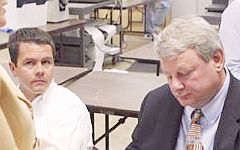 | Candidates Rich Paul-Hus & Mayor Oliver Parker
AWAIT RESULTS OF RECOUNT |
The paper thin victory margin of 12 votes triggered a Statutory Recount, mandatory whenever there are diminutive winning margins. The recount took place on Thursday, supervised by canvassing boards in Broward and Beach counties. It changed the vote total for only two candidates. Bruce McNeilage, who finished fourth, won an extra vote because officials found two absentee ballots stuck together in a box. Julie Morrall, who finished fifth, lost a vote when officials discovered one ballot was actually an overvote, as a tabulation machine misread a ballot in which the voter selected more than one candidate. By the end of the day, records still showed that Bogdanoff had defeated Oliver Parker by a 12-vote margin.
 | | Supervisor of Elections Dr. Brenda Snipes |
When Governor Jeb Bush suspended the scandal-plagued Miriam Oliphant as elections supervisor in late November, the office she managed was left in a state of disarray. Interim replacement Dr. Brenda Snipes used the six weeks before the election to reconstruct the decimated staff and purge the Broward County voters registration list of 60,000 names of those who either died or moved. She rehired key experienced staff personnel fired by Oliphant and re-established a working relationship with Broward County Government and Broward Sheriff Ken Jenne�s office. With veteran Miami-Dade elections official Gisela Salas serving as her deputy, Dr. Snipes steered the election through an uneventful opening and maintained phone contact with county and state officials throughout the day to apprise them of her progress. The election was widely perceived as a successful effort.
Ellyn Bogdanoff, a mother of three, carries substantial political credentials. Currently Chairwoman of the Broward County Children�s Services Board, an Advisory Board member of the Homeless Initiative Partnership of Broward County and a member of the East Broward Federated Women�s Republican club, Representative Bogdanoff has served on the state�s Elections Commission, the state WAGES program (as a Board Member), Governor Jeb Bush�s transition team, the Children�s Home Society Board of Directors, the District Advisory Council for the Broward County School District, the Fort Lauderdale Education Advisory Committee and the Human Rights Board of Broward County.
 | Senator JEFFREY ATWATER &
Representative ELLYN BOGDANOFF |
A Fort Lauderdale attorney, Bogdanoff is a Guardian ad litem, 17th Judicial Circuit and sits on the Fort Lauderdale Chamber of Commerce Board of Governors and Board of Directors. She�s an advisory board member of the Enterprise Ambassador Program of Nova Southeastern University and a board member of JAFCO (Jewish Adoption and Foster Care Options). She�s also a foundation board member and former chairwoman of President Jimmy Carter�s Habitat for Humanity of Broward County and the Broward Alliance. Bogdanoff served on the Women�s Chamber of Commerce of Broward County as a Charter Member, board member and chairwoman. She currently serves as a director of the Brighter Futures Foundation.
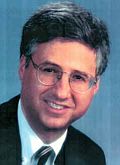 | | Mayor Steven Abrams |
She was a partner in an independent insurance agency, Setnor Byer Bogdanoff, for 15 years. In 1997, Bogdanoff founded Enterprising Business Strategies, a consulting firm specializing in government relations, political and candidate support and corporate community strategies and relations. As such, she�s played an active role in campaigns ranging from School Board to City Commission to the State Legislature. Her support for Boca Raton Mayor Steve Abrams during his unsuccessful state House campaign in 2000 may have been the key to her recent elective success. Abrams reciprocated by campaigning for Bogdanoff in this election. Despite there only being four District 91 precincts in Palm Beach County out of seventy-seven total precincts, more than half the 546 people who voted in the county chose her. This local landslide offset Parker�s strong showing in his Lauderdale-by-the-Sea political backyard. Bogdanoff, a pro-choice moderate Republican, will represent the district at the March 2nd legislative session in Tallahassee. Shore Preservation, Fire Safety, Insurance Dogma ... her work is definitely cut out for her!
Final Election Results

| Candidate |
Votes |
Percent |
| |
|
|
| Ellyn Bogdanoff |
2,816 |
25.97 % |
| Kenneth Donald Cooper |
489 |
4.51 % |
| Jim Lewis |
506 |
4.67 % |
| Bruce W. McNeilage |
1,514 |
13.96 % |
| Julie H. Morrall |
995 |
9.17 % |
| Oliver Parker |
2,804 |
25.86 % |
| Rich Paul-Hus |
1,579 |
14.56 % |
| |
--------- |
------------ |
| Flawed Undervotes |
137 |
1.26 % |
| Flawed Absentee Votes |
5 |
0.04 % |
| |
--------- |
------------ |
| Totals ===> |
10,845 |
100.00 % |
|

To ARCHIVES
To ARCHIVES INDEX
To 2017 ARCHIVES
To 2016 ARCHIVES
To 2015 ARCHIVES
To 2014 ARCHIVES
To 2013 ARCHIVES
To 2012 ARCHIVES
To 2011 ARCHIVES
To 2010 ARCHIVES
To 2009 ARCHIVES
To 2008 ARCHIVES
To 2007 ARCHIVES
To 2006 ARCHIVES
To 2005 ARCHIVES
To 2003 ARCHIVES
To 2002 ARCHIVES
To 2001 ARCHIVES
To 2000 ARCHIVES
To TALLAHASSEE ARCHIVE
To TALLAHASSEE ARCHIVE - 2018
To TALLAHASSEE ARCHIVE - 2017
To TALLAHASSEE ARCHIVE - 2016
To TALLAHASSEE ARCHIVE - 2015
To TALLAHASSEE ARCHIVE - 2014
To TALLAHASSEE ARCHIVE - 2013
To TALLAHASSEE ARCHIVE - 2012
To TALLAHASSEE ARCHIVE - 2011
To TALLAHASSEE ARCHIVE - 2010
To TALLAHASSEE ARCHIVE - 2009
To TALLAHASSEE ARCHIVE - 2008
To TALLAHASSEE ARCHIVE - 2007
To TALLAHASSEE ARCHIVE - 2006
To TALLAHASSEE ARCHIVE - 2005
To TALLAHASSEE ARCHIVE - 2004
To TALLAHASSEE ARCHIVE - 2003
To GMCA HOME
To MAIN PAGE
To LINKS PAGE
To SITE MAP
To CONTACT
Click To Top of Page
|
 |
|
|
 |
| Webmaster EPB |
|
|
|
|
|
|

